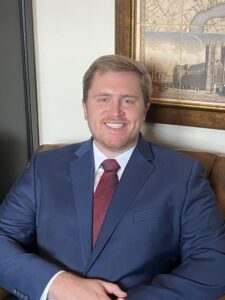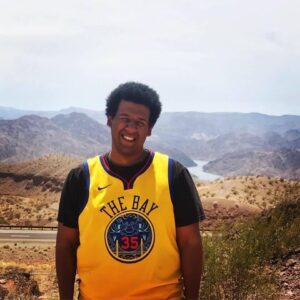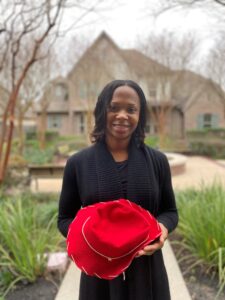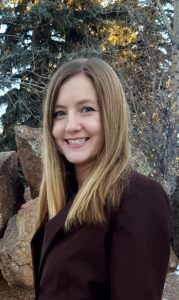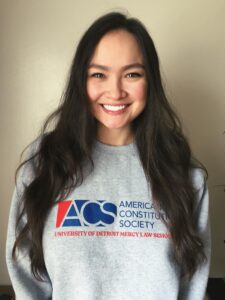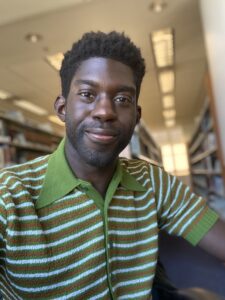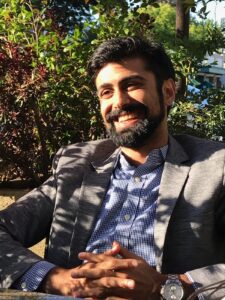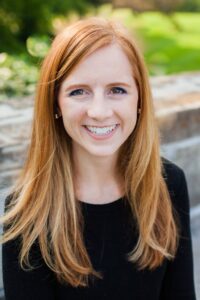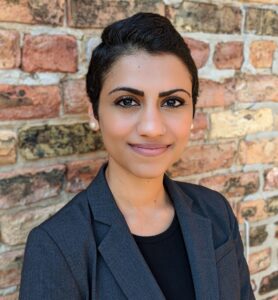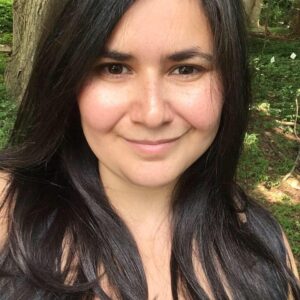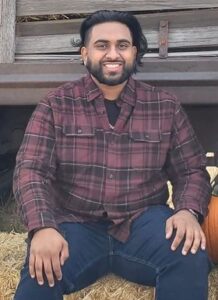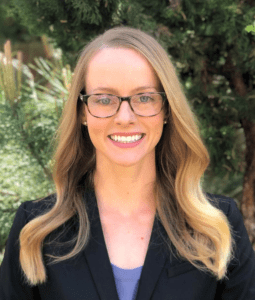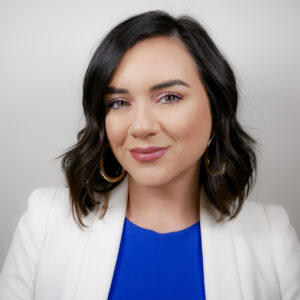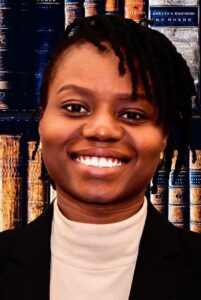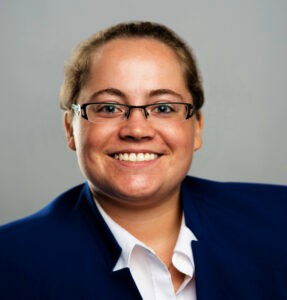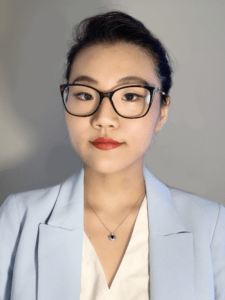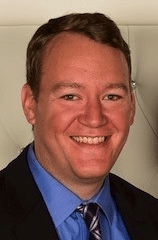2020-2021
5/24/2021
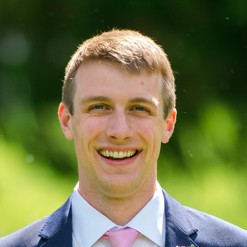
Ross Svenson (he/him/his), Harvard Law School ’21
My peers and I came to law school in the wake of the devastating 2016 election and in the shadow of Donald Trump’s presidency. As a field organizer for Hillary Clinton, I felt the election loss acutely and as a U.S. Senate staffer I saw the policy consequences up close. To me, the harm caused by the Trump Administration’s radically conservative positions and policies wasn’t abstract. After each speech or policy enactment, I knew how it would affect the communities in which I had organized or that my Senator represented. Like so many others, the election experience in 2016 and its aftermath motivated me to attend law school so that I could explore avenues for effecting progressive change, be it through organizing, litigation, or policy advocacy.
Through ACS, I found a progressive home that not only supported that personal exploration, but also offered community through shared values. ACS never failed to remind me why I and so many other students came to law school in the first place. Whether that reminder came in the form of academic symposia on progressive constitutionalism or community action opposing Justice Barrett’s Supreme Court nomination, I appreciated how the organization filled the gaps of purpose and perspective that can characterize law school. I learned as much about emerging legal theories and public policy through ACS events as I did in the classroom. The organization plays a critical role in developing progressive intellectual capital, and I’m so glad that our generation of law students can take our ACS experiences with us into the legal world.
5/17/2021
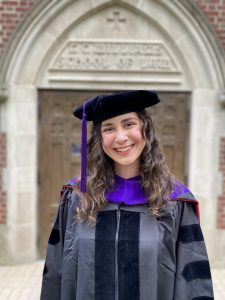
Samantha Galina (she/her/hers), University of Richmond School of Law ‘21
Born and raised in New York as the daughter of Jewish parents—a political refugee and an attorney—I was drawn to public service from a young age, and they inspired me by the way they shaped my view of the world. My mother was my community’s dentist and she would
never turn away a patient who was in pain, regardless of their ability to pay. My father, in addition to running his own law firm, took on pro bono clients and volunteered his legal services to the Center for Missing and Exploited Children. My parents’ service to our community undoubtably shaped my commitment to public service.
Before law school I studied public policy at the University of North Carolina where I became interested in housing policy and the inequities in access to safe and affordable housing in our country. In 2016, I was a fellow at the Roosevelt Institute where I developed an alternative co-operative housing model specifically targeted to assist low-income single mothers and their children. This experience motivated me to attend law school. I knew that I wanted to assist vulnerable populations secure safe and affordable housing through the law, whether through litigation or legislation and policy. It is my firmly held belief that safe and affordable housing is a human right.
Upon arriving in Richmond for law school, I understood little of the deeply rooted and complex racist history of the former capital of the confederacy. My first summer of law school, I worked on policies intended to advance racial equity in Virginia, including drafting the executive order establishing the Governor’s Commission to Examine Racial Inequity. The Commission’s goal is to examine Virginia’s racist historical laws and remove them from the uncodified law books as well as examine laws that have a disparate impact on people of color.
My second year I completed an externship with the Virginia Solicitor General. After Virginia became the 38th state to ratify the Equal Rights Amendment, the Attorney General sued to recognize Virginia’s ratification. I was proud to contribute as an intern at the outset of that litigation. During that internship, I had the privilege of becoming acquainted with some wonderful folks at ACS. I contributed to the formation of the ACS Student Chapter at the University of Richmond School of Law and I most recently served as the Chapter’s Vice President. I plan to pursue a career in civil rights litigation, continue serving the people of Virginia and strive to create a more equitable future.
5/10/2021
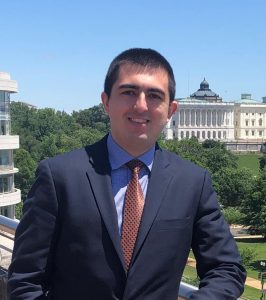
Alexander Farah (he/him/his), Brooklyn Law School ‘21
When I first started law school, I was overwhelmed and questioned whether I had made the right choice. However, I knew that I could not give up so easily after everything I had faced in getting to that point. I was then reminded of a quote by President Barack Obama where he said, “You can’t give up your passion if things don’t work right away. You can’t lose heart or grow cynical if there are twists and turns on your journey.” Law school certainly presents new twists for everyone, but I learned from past twists and turns in my life that perseverance can help you overcome any obstacle.
I became involved with the American Constitution Society after the 2016 election and I wanted to do my part in advocating for change, especially as the Trump administration tested the perseverance of our country. My first involvement with ACS was attending the 2019 ACS National Convention after my 1L year, and I was inspired by speakers like Washington Attorney General Bob Ferguson, Bryan Stevenson, and so many others.
After the Convention, I wanted to become more involved with ACS, but Brooklyn Law School did not have a chapter. I went back to school and started an ACS Student Chapter that fall, and I have been President of the chapter for the last two years. Even though there have been many twists over the past year as a result of the pandemic, we have managed to host a number of incredible events for our chapter remotely, including events focused on qualified immunity, disability rights, and impeachment. I am so proud of the chapter that we have built at Brooklyn Law School, and I am very excited about the future of the American Constitution Society as a whole.
After the last few years, it is nice to feel hopeful for the future of the country. A lot of change is still needed because there are countless inequities that still exist, but I am happy to be part of an organization that works to address those problems. There will certainly be points where we get knocked down in the future, but it is important to get back up, continue persevering, and fight for what we believe in.
With graduation quickly approaching, I want to thank my family, Brooklyn Law School, ACS National, and our Brooklyn Law ACS E-Board for supporting me on this journey. It was also a pleasure to work with some incredible leaders from law schools around the country. I am very excited to pursue a career in public service, and I hope that my work can make a positive impact on the world.
5/3/2021
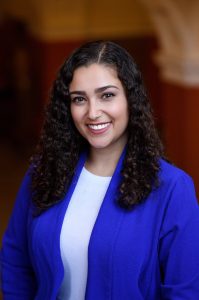
Madeline Feldman (she/her), University of Pennsylvania School of Law ’22
I came to law school unsure of where to find community, like-minded friends, and how to navigate my classes. I intended not to join any organizations, as I believed my sole commitment should be to academics. As a result, I found myself swimming in readings and without a community. That changed when I went to an ACS voting rights lunch event. The event not only gave me a new perspective on an important topic outside the scope of my 1L classes, but also enabled me immediately to connect with the students sitting around me in the audience.
This instant connection with likeminded people is what made me know I wanted to join ACS as a 1L Representative and it is where I have since found my home in law school. The core values of ACS, including protecting individual rights and liberties, the need for genuine equality, access to justice, democracy, and the rule of law, helped me clarify my beliefs about the role the law and lawyers must play in society. ACS has also personally given me student mentors, advisors, friends, and a supportive group that has shaped my law school experience.
When I became a president of my chapter last year, I knew shaping a community in a virtual environment would be challenging, but all the more meaningful and important. As a result, our chapter now holds its largest Board to date, after taking on all 24 students who applied to be First Year Representatives, a title that, for the first time, includes LLM and transfer students. I led my team in organizing an event series focused on 1L growth and assistance. The “How to 1L” series is now well known across the Penn Law community.
My personal goal as a leader is to provide community and mentorship, and I am thrilled to be able to continue carrying out that vision as an ACS Next Generation Leader, where I hope to support other future leaders from the organization that showed me how to be the lawyer I want to be.
4/26/2021
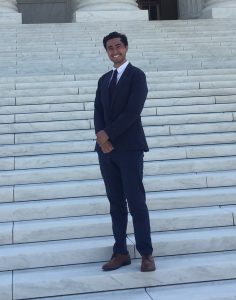
Andy Su (He/him/his), UCLA Law ’21
Hi, my name is Andy Su. I am a 3L at UCLA Law and Co-President of the UCLA Law ACS Chapter. Coming into law school I knew I wanted to join ACS to be part of an organization that is fighting for human rights, racial equity, and our democratic institutions. I have been involved with ACS since my 1L year and I have had the chance to engage with the topics that I came to law school to pursue. While spending my 1L summer as an intern at the United States Department of Justice, Public Integrity Section, I was able to attend the ACS National Convention in Washington D.C. It was one of the highlights of my law school career to meet and talk with so many progressive leaders, lawyers, judges, and students. Bryan Stevenson’s keynote address was one of the most inspirational and moving speeches that I have seen. The convention completely reaffirmed my desire to pursue a public interest career.
I am currently pursuing a career focused in energy, climate change, and environmental justice issues. I chose to attend law school because I saw the law as a vital tool to decarbonize our world, protect our environment from degradation and irreversible harm, and defend frontline communities from disproportionate environmental impacts.
I have long been interested in work challenging fossil fuel infrastructure as these projects lock in decades of carbon emissions and disproportionately harm communities of color by contaminating the land, water, and air. During law school, I have had the pleasure of working at the California Attorney General Environment Section and Earthjustice. I have focused on projects regarding fossil fuels and transportation infrastructure that harms the climate and fence line communities.
A just transition away from fossil fuels, and to renewable energy is vital to address the climate crisis without creating additional harms on marginalized communities. In law school, I have expanded my knowledge by taking a class on energy law and regulation, and I am currently taking renewable energy project finance. Last year, I wrote a law journal comment that analyzed the state policy tools that could promote floating offshore wind development on the west coast. The paper, recently published in the UCLA Journal of Environmental Law and Policy, focused on the legislative and executive actions that
east coast states have taken to support offshore wind development, including renewable portfolio standards, offshore wind mandates, infrastructure investment, and tax credits.
I am particularly interested in environmental justice issues and the disproportionate environmental harms that are placed upon communities of color. Growing up, I would talk with my dad about his experience being a first-generation immigrant in Los Angeles, and the structural racism and inequality that our family faced due to the city’s historically racist housing policies. Through his stories and my family that still lives in Southern California, I gained insight into the inequitable environmental burdens that BIPOC communities continue to face. I also learned how these communities have been historically marginalized and ignored by the mainstream environmental movement, a problem that I want to help remedy. I believe we must incorporate environmental justice into all environmental work because everyone has a right to a healthy environment.
Being part of ACS has been one of the best parts of my law school career and I am sad to think that my time as an ACS law student is coming to an end in a few weeks. However, I am extremely excited to continue to be a member of the ACS community as I embark on my public interest environment and energy career, fighting for front-line communities and ensurng a just transition away from fossil fuels.
4/19/2021
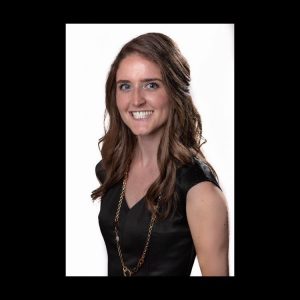
Olivia Van Nest (She/her/hers), New England Law Boston ’22
I remember the feeling of overwhelming shame as I listened to a man describe his experience as a child living in an Indian residential school. I was attending a conference on the Indian residential school system and the process of reconciliation between Canadians and Indigenous peoples in 2016. I was invited to participate as an interested young academic by my mother, who is a local pastor. I heard firsthand the stories of fear, sadness and long-lasting struggles resulting from years spent at the schools. Individuals provided vivid descriptions of cultural extinction through dehumanizing punishments such as starvation, assault, and abuse. I also learned that the Indian Act still binds all status First Nations Peoples to strict regulations that continue to invade and limit their traditional way of life. The conference ignited in me a desire to learn more about oppressed communities and the legal structures that maintain that oppression.
As an undergraduate, I wanted to nurture my growing interest and expand my knowledge of how seemingly neutral laws and regulations can disproportionately affect certain groups. I took a seminar titled The Politics of Rights to better my understanding of our liberties under the law. The class took a broad international approach and our discussions focused on groups around the world that face marginalization. For my final paper, I identified three critical transitions between the relationship of Canadians and Indigenous peoples while assessing the loss of Aboriginal identity within each stage. I discovered significant flaws in the Canadian procedure, and I wanted to learn more through an entirely new lens.
I applied to New England Law Boston, and when I received my acceptance letter, I decided to uproot my life in Canada, move to the United States and learn about how the democracy of a different nation treats their Indigenous population. In my first year of law school, I remember seeing a group of people passionately advertising for an event entitled “Bagels and Ballots,” the students offered bagels to their peers while showing them how to vote in the national election from out of state. I remember feeling inspired seeing that there were opportunities to engage in tangible efforts to promote change and effect the democratic process by getting involved with a group like the ACS. The next year I ran for President and since my nomination I have been provided countless opportunities to get involved with ACS members from across the nation. This year I ran a book club focusing on racial disparities following George Floyd’s murder and the BLM movement, I hosted an event with nearly 200 attendees to discuss the new Supreme Court appointee, and I planned and facilitated a three-part series on the death penalty. Since I became an active member of ACS I have felt empowered to take what were once just ideas and promote action. Finally, I found a group that shares my passion for the law and using it as a tool for change. Through ACS I have been afforded the opportunity to provide a platform for discussion and implement programs within my community that promote a progressive interpretation of the American Constitution and equal justice for all.
4/12/2021
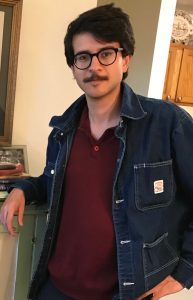
Nicholas Vachel Williams (he/him/his), University of North Carolina School of Law ‘22
As a native of rural eastern North Carolina, I developed a strong sense of understanding of the economic and social pressures in rural communities across America. Both of my parents were public educators in rural school systems. Because of their work, I witnessed the individual and communal empowerment, and liberation, that a good education can provide. I decided to follow my parents’ footsteps of service to the people, but rather than teaching in the classroom, I wanted to advocate for others in the courtroom.
Before attending law school at the University of North Carolina, I obtained a Bachelor of Arts in Economics at Appalachian State University. It wasn’t until I started attending Appalachian State University that my consciousness of class and economic disparities grew, later informing my advocacy of progressive values and reform. However, most of these realizations developed outside of the classroom. I realized that I, my family and many of my neighbors from back home were not afforded the same opportunities as many of my peers simply because of geographic location and economic status.
While at ASU, I harnessed these realizations with local government advocacy. I served as the University’s student advocate through the Student Government. In that position, I worked with local attorneys to establish flood victim legal clinics, fought to keep the on-campus voting site, and collaborated with community members to repeal an over-intrusive town skateboarding ban. As a result of this work, I decided that I would like to advocate for others as an attorney.
Since attending UNC School of Law, I’ve had many great experiences that have furthered my understanding of my place in the legal profession. I’ve researched rural access to justice issues, interned with Legal Aid of North Carolina’s Eviction Diversion Program during the height of the pandemic, externed with the Governor’s rural initiative, and studied under many great progressive legal thinkers. As I continue to grow as an advocate, one thing is clear to me: the law should be constructed to reflect the personal and economic realities of its citizenry, not to uphold antiquated systems of power and ideology.
I joined ACS as the Chapter’s 1L Class Coordinator, quickly discovering the importance of creating and maintaining a progressive network of lawyers in North Carolina — a politically diverse state with judicial elections. Since I became President of the Chapter, we have worked to expand our ACS-UNC alumni relationships, state judiciary interaction, and connections with local activism networks. Programming over the past year has focused on environmental justice, voting rights, criminal justice reform, and other pressing legal issues. I look forward to continuing to work on collective progressive legal advancements with ACS.
After law school, I want to serve underrepresented and low-income clients in plaintiff’s litigation and community development. The law, if used correctly, can be a powerful tool to hold rampant corporate influence and bad-faith actors accountable. With our work through ACS, we can achieve plenty with an articulate, strong vision for an equitable and just future.
4/5/2021
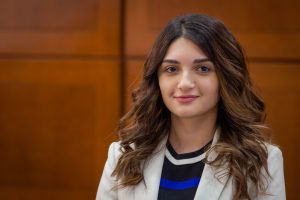
Vicky Saliu (she/her/hers) Chicago-Kent College of Law, ‘21
Going from table to table at the Student Organization Fair, one question lingered in my head – where does a white, immigrant, Muslim woman fit in? As a first-generation college and law student, the answer to this question was vital. For me, the answer was the American Constitution Society.
ACS represented everything I believed in and wanted to fight for. ACS’s progressive stance on abortion rights, the death penalty, immigration, and LGBTQ+ rights attracted me from the start. Best of all, it is one of few organizations that addresses current issues – something you do not get from simply attending classes.
I have wanted to become an attorney for as long as I can remember. In high school, my interest in criminal law, specifically wrongful convictions, peaked during my internship at Northwestern’s Bluhm Legal Clinic. The Clinic’s work with exonerating innocent individuals was inspiring and eye-opening. It allowed me to see the racial injustices embedded in our criminal justice system. At the Clinic, I met Johnnie L. Savory who was wrongfully convicted of double murder. Johnnie and I clicked – but not only because we share the same birthday. Naturally, when I got the opportunity to plan an event for ACS as Program Director, I immediately reached out to Johnnie. I wanted ACS members to learn from Johnnie’s unique experience with the criminal justice system. The event was successful and personally special as it gave me the confidence to run for Chicago-Kent’s ACS President.
Looking back at my experience with ACS – from being my chapter’s 1L Representative to now President – I know that it played a tremendous role in my professional, academic, and personal growth. Although my role with my chapter’s ACS is coming to end with my graduation this semester, I am excited to continue my involvement with the national organization. I look forward to continuing our fight towards a more progressive and just society!
3/29/2021
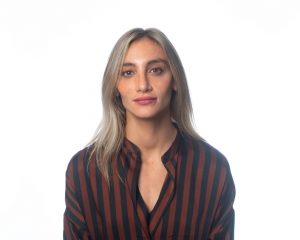
Marielle Sider, Pepperdine School of Law, ’22
On Women’s History Month
As a feminist and proud ACS leader on a white, Christian, conservative campus, it is an honor to be asked to write this blog post. But it also made me extremely self-conscious to reflect on the theme that seems to run through those identifiers: resistance. Who would I be if I had nothing to fight against?
Laura Mulvey coined the term “the male gaze” in the 1970s to define the traditional, male cinematic point of view. The spectator, particularly in classic Hollywood cinema, is put in a masculine subject position, and the women on screen are always the objects. Even female spectators subconsciously internalize that perspective. The worlds we see and the stories we enjoy are from the perspective of men.
So too were all of the major systems in which we exist today. They were established by and for white men, including the legal system. There would not be a Women’s History Month in a nonpatriarchal society and Justice Amy Coney Barret would not have “replaced” Justice Ruth Bader Ginsburg. Similarly, there would not be a Black History Month in a non-white supremacist society and Justice Clarence Thomas would not have “replaced” Justice Thurgood Marshall.
We cannot realistically (for now at least) change the fact that the U.S. Constitution, system of government, and legal framework were created and dominated by white men. What we can do, like Laura Mulvey did for the film industry, is, at the very least, identify and label that reality so that we can reevaluate and change the status quo, hopefully a little freer from its influences. Mulvey called for a feminist avant-garde filmmaking that would destroy the pleasure of classic Hollywood filmmaking. In Visual Pleasure and Narrative Cinema, Mulvey wrote, “Analyzing pleasure or beauty annihilates. That is the intention.” We cannot be afraid of a little discomfort for the sake of a more expansive perspective, and, naturally following that, more freedom and justice.
In regards to Women’s History Month, expansion involves acknowledging and celebrating the entirety of womxn and the gamut of the female experience. We can resist objectification by embracing and respecting intersectionality. We can annihilate a little more of the status quo by acknowledging complicity and ignorance. We can move towards freedom through progressivism. Only a living constitution can protect and serve the rights of our explosively diverse citizens and their interests. Women’s History Month for me means looking at how much of my ambition and drive comes from resisting male institutions and exploring the implications of that.
You might be surprised to learn that Women’s History Month was established by President Ronald Reagan via proclamation in 1987 at the direction of Congress. The irony of this origin might be as physically repugnant to you as it is to me. As a direct result of Reagan’s War on Drugs, women, especially Black and Latina women, have been the fastest growing prison population for the past 30 years. The United States accounts for one third of the world’s female prison population. But at least we have March!
The women that are traditionally offered to us as role models have, for the most part, been able to skillfully navigate and succeed in this male-created framework. For example, Justice Ruth Bader Ginsburg, who has been a personal hero of mine for years, was famously able to attend Harvard Law School for both herself and her ill husband, come out at the top of her class, and raise a family. Among the words that she left us are: “Fight for the things that you care about, but do it in a way that will lead others to join you.” “Disagree without being disagreeable.” Admittedly, I have not been entirely successful in following these directives. In fact, I naturally resist against these somewhat patriarchal ideas that, to make an impact, women must be agreeable and palatable. Disagreeable to whom? Lead others to what? How can I fight effectively without compromising my values to assuage the powers that be? Isn’t that very compromise part of what we’re fighting against?
Some feminist heroes have succeeded using Justice Ginsburg’s model, but countless others have changed the course of history through more aggressive challenges and resistance. We must also learn about these other womxn, because they, too, have paved the way for us. Like Rev. Dr. Pauli Murray, who is sometimes remembered during this month but too often forgotten the rest of the year. Murray, decades before Justice Ginsburg, fought against the systems built to exclude Black, queer, transgender women. They worked to dismantle segregation both personally and systemically by organizing sit-ins and creating arguments for its demise that would eventually be successfully deployed by their professor. They resisted misogyny at historically black institutions by coining the term “Jane Crow” and co-founding the National Organization for Women. Murray personally challenged their rejection from Harvard Law School, asking the admissions department to reconsider changing their minds because changing their sex would not be as easy.
Pauli Murray also suffered emotional consequences from their resistance against gender norms. They had mental breakdowns yearly and was frequently hospitalized. The language, awareness, and respect for their complaints simply did not exist at that time. And so, Murray suffered.
Murray insisted on a full recognition of their integrated identity, which today would translate to intersectionality. While Murray and Ginsburg had extremely different paths, Ginsburg’s work would not have been possible without Murray’s unflinching drive. In “Reed v. Reed,” the first time the Equal Protection Clause was applied to sex discrimination, Ginsburg credited Murray as inspiration for her brief and put them down as honorary co-author. Some of us are Ginsburgs and some of us are Murrays, but most of us are somewhere in between. It takes all of us to create lasting change.
This Women’s History Month, my intention is to celebrate all of my experiences and dimensions as one full identity. I have been motivated by resistance to the status quo, ever since my mother taught me to ask “why?” I came to law school after #MeToo as a means of resisting and challenging the misogynistic Hollywood system of secret sexual abuse. I work at a public defender’s office to defy our state’s criminalization of poverty, drug and alcohol addiction, and mental illness. And I use my voice to ask my professors why originalism is the most “valuable” mode of constitutional interpretation.
Part of my identity includes resistance, but it also includes connection, warmth, hope and excitement. Part of me hates the very idea of Women’s History Month because of its implicit tokenization of half the population, but another part loves the opportunity to focus on the gamut of accomplishments that women have achieved and the obstacles that still exist. I first acknowledge that I’m the object, and by so realizing I become the subject. Women may have been given this month, but we’ll take it all.
3/15/2021
Jon McLamb (he/him), Wake Forest University School of Law, ‘21
To me, life is all about public service. The amount you give back to your neighbors and community can bolster your well-being more than any other resource. I’m happy that God gave me a servant’s heart and led me to a career path where I can enhance the public good.
My public service began in high school when I started a job as a Youth Counselor at the local YMCA. I would continue working for the YMCA for several years, interacting with children from all different backgrounds and in many different roles. My most personally transformative role at the YMCA was my time as a summer camp counselor at a camp for underprivileged youth. Here, I witnessed the realities and hardships that many families faced. I spoke with the children’s families and heard stories about how hard it was for these families to simply provide the basics of life.
I also observed the inequity between the camps attended by predominantly white children and those camps attended by children from marginalized communities. The predominantly white camps were held at state-of-the-art facilities and had unused equipment and substantial resources while the camp attended by children from marginalized communities had the exact opposite. Even in my high school years, I knew this unequal treatment was wrong. Children from all walks of life deserve equality; it should not matter what family or community you are born into. I decided that summer to dedicate my life to public service, which led me to law school. I knew having a law degree would give me the ability to help marginalized individuals in an impactful way and enhance equality in society.
Although I have not decided on a specific legal path of public service that I will serve in the future, I know that I have developed the tools that I need to help another individual in legal need. This is in no small part thanks to the American Constitution Society and its community. Through this community I have connected with many other public servants around the country and learned much about society’s injustices and its solutions. I am forever grateful for ACS.
3/8/2021
Andre Milton (he/him/his), University of Denver Sturm College of Law, ‘22
Hello! My name is Andre Milton, and I am from Moline, Illinois. I attended the University of Northern Iowa for my undergraduate degree, where I majored in Political Science. I went straight from undergrad to law school at the University of Denver Sturm College of Law where I am currently a 2L. I am interested in criminal law, constitutional law, and civil rights.
I was inspired to attend law school after a poignant high school experience. One day I was called down to the office where there was the school resource officer, dean, and vice-principal. They told me they had video of me assaulting another student in a hallway and that I was essentially expelled. They also said that I should plead guilty and participate in a program called peer justice. Because I refused, after the summer break, the city charged me with battery. My 18th birthday present ended up being an attorney to defend me against this charge, and I was found not guilty. Because of that experience, I was convinced that I wanted to be an attorney, even though I was not always sure it was a possible path for me.
I was not familiar with ACS when I got to DU but was encouraged to go to the meetings through one of my TAs in my legal writing class. I originally wanted to join ACS because of the great community I found at those meetings. It started with the meetings and eventually, I found ACS has amazing events here at DU like last year’s Western Regional Convening. As a 2L, it has been a weird year with COVID-19, but it has provided unique opportunities for events where we got to co-host with other student chapters such as the Western Regional Convening with Arizona State University and the University of Nevada, Las Vegas. We also had an event on the election with the University of Wyoming and the University of Colorado Law School. It has been great to connect with other chapters and know there are other people out there interested in building a progressive legal community and doing great work.
Morgan Maloney (she/her/hers) University of Virginia School of Law, ‘22
My first semester of law school, I, like many other 1Ls, questioned if I made the right decision to come to law school. In tackling hours of lectures each day and mountains of reading at night, I grew increasingly exhausted. Latin terms jumbled together in my head with various multi-prong tests. All the enthusiasm for the law I had brought into the building in August seemed to seep away as the semester went on. I couldn’t help but ask myself,“What was the point of all of this?”
On a particularly bleak day, I took a break from the library to go to an ACS event. Our then-Director of Programming had brought in a speaker, a former member of President Obama’s White House Counsel’s office. I listened as he described the work he did in the government and how he used the law to influence the course of our nation’s history. He reminded me of what a privilege it was to get a legal education and how much change I could make if I spoke the language of the law. I realized the power inherent in our degrees and our profession. The hours I spent with my casebooks finally felt worth it.
This year, I serve as my chapter’s Director of Programming. In my position, I try to plan events that will remind students of why they went to law school and what they can achieve as lawyers. This year, our chapter has Zoomed in judges, professors, and practitioners from around the nation to speak with our students. I’ve sought to remind our members of all the good they can do as lawyers while also reminding them, and myself, of our responsibilities as members of this profession.
I’m excited to use my ACS connections and education to build a career in government service.
2/22/2021
Bebe Thomas (she/her/hers), 1L, University of Houston Law Center, ‘23
There is a red cowboy hat that hangs in my office as a reminder of why I chose to work in the pharmaceutical research industry and why I ultimately decided to pursue law. It is the hat I wore when I was three and spent more than one year at Stanford Children’s Hospital undergoing life-saving treatment for cancer. I am alive because I received cutting-edge therapy at a world-class hospital. I am the product of cancer research. Yet, my survival was a privilege. Many people just like me are not provided this very basic human right.
I started my career in clinical research in 2001 at the University of Washington. After transitioning to the pharmaceutical industry, I specialized in immuno-oncology trials for patients with hematologic malignancies and solid tumors. While the work was exciting, I was disheartened by the overwhelming lack of availability of effective treatments for low-income patients and people of color. My passion for affordable care inspired me to work within the industry to increase access to care by recruiting physicians of color to trials and incorporating advanced technology to identify potential patients. In 2017, I was honored to receive the Clinical Researcher of the Year Award from the leading clinical professional society.
Choosing to leave my career to pursue law was a difficult decision, but I am confident I will have more impact as a lawyer focused on health law and policy. While I am a new member of the ACS Student Chapter at the University of Houston Law Center, I am committed to advocating for increased access to care. Progressive, impactful change in the health care industry is necessary to ensure affordable care is available to everyone. While society navigates its first global pandemic, this is even more pressing an issue. There is so much work to do, and I am excited to partner with my student ACS chapter to ensure healthcare becomes a right, and not just a privilege.
2/15/2021
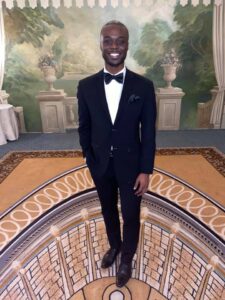
Damonta D. Morgan (he/him/his), Columbia Law School, ’22
I grew up in the Mississippi Delta. And while I think about that experience often for various reasons, this Black History Month-and in this political era-I’m thinking about some of the courageous leaders who sprang up from that rich soil to defend American constitutionalism. Today, I would like to introduce Fannie Lou Hamer.
Born to sharecroppers in Ruleville, Mississippi, Mrs. Hamer became active in the civil rights movement in her early thirties after having learned about the right to vote from Freedom Riders who visited Mound Bayou in August 1962. Even though she had failed the so-called “literacy test” twice (before passing it on the third try), Mrs. Hamer traveled throughout her community teaching Black Mississippians how to read and write, so that they could pass these same tests and secure their right to vote. For her audacity, she was fired, beaten, and ran out of her home by the Klan. But like so many strong women, she persisted.
She brought national attention to the deprivation of civil rights in Mississippi by testifying at the Democratic National Convention of 1964, where she lamented being “sick and tired of being sick and tired.” Fannie Lou Hamer’s toil on the ground and before the cameras of the nation was pivotal to the passage of the Voting Rights Act and ensuring Black political representation in Mississippi and other intransient communities across the South. Though the circumstances that brought Mrs. Hamer to national acclaim were less than ideal, each time I consider her life, I am nevertheless filled with the sense that if our society and our system could create a soul as big as Mrs. Hamer’s, then maybe there is hope.
I share this story today because we are in a moment that calls for more Fannie Lous. Fannie Lou Hamer was a nation-builder. She inherited a country that reneged on its most fundamental promise and instead of abnegating or abandoning the Constitution, she sought to make it more real. Today, we are inheriting a similar country, where injustice and inequality yet persist, and instead of confronting them head-on, our “leaders” prefer to incite insurrection and undermine constitutional democracy for personal gain. In the face of such recklessness, I think we are called to summon our inner Fannie Lou Hamer. We cannot give in to prolonged bouts of despair, hopelessness, or pessimism. These things will come, yes, but, in the robust tradition of the Black civil rights leaders of yesteryear, we must “keep [our] eyes on the prize, hold on.”
2/8/2021
Jaclyn Waara (she/her/hers) 2L, University of Wyoming College of Law, ‘22
My passion for progressive change started long before law school. As an undergraduate student at the University of Michigan, I majored in International Studies and Spanish. I realized during my studies that rural areas in this country, such as the one I came from in the Upper Peninsula of Michigan, were far behind their more progressive and populated counterparts in having conversations surrounding issues such as systemic racism, indigenous rights, LGBTQ+ rights, sexual health, civics, and the origins of economic disparities. This gap in knowledge and understanding has come at a high price for our society. As the past four years have shown, bigotry, misinformation, an education system focusing on white and colonialist viewpoints, along with far-right aggression, have devastated our democracy. Unfortunately, the aforementioned issues have been ongoing in the United States since its inception. As future advocates, I believe it is our duty to act and help solve the problems facing our democracy. As advocates in rural areas of the country, it is also our duty to promote progressive change in these sometimes overlooked spaces.
Through our ACS Student Chapter at the University of Wyoming, we’ve taken this duty to heart. We’ve focused on promoting progressive change in rural communities such as our own and have been very active this past year in advocating for progressive policies and ideas. We’ve strengthened our voice by collaborating with ACS neighbors in Denver, Boulder, and Chicago to host a Transition of Power event that focused on the challenges our democracy faced in the recent transfer of power. We also helped to build the progressive community by hosting an event to promote the abolishment of the death penalty in Wyoming, and providing mentorship for incoming 1L students. I am very proud of the work our student chapter has achieved. I am also grateful for our ACS Student Chapter Advisor, Professor Stephen Feldman, along with 3Ls Nathan Yanchek and Ryan Sedgeley, who, just a few years ago, started our student chapter. Without them, my fellow students and I would not have the opportunity to participate and be a part of the ACS community. Our team efforts have created friendships that I am very thankful for, and has also demonstrated to me that a sense of community, teamwork, and collaboration are essential to success in our field.
Although we have a lot more work to do to create progressive change in rural areas all over the country, witnessing the passion from my fellow ACS classmates has continually inspired me in my law school journey. I remind myself that no matter where one lives, and even in the most unlikely of places, there are always going to be progressive voices. That being said, please feel free to connect with your rural ACS allies and we will try to do the same. Our small but mighty ACS Student Chapter from Wyoming is yearning to collaborate with others from across the country and time is of the essence.
2/1/2021
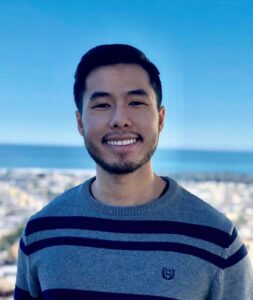
Gabby Tong (he/him), University of Illinois College of Law, ‘22
I was oblivious to the concept of privilege until I moved to America from Hong Kong. I had been in the racial majority for 17 years, but all of a sudden, I became a racial minority in a new country. I started to feel the need to represent my race everywhere I go. I would find myself having to work and ask for things that others take for granted, and I would constantly have to overcome expectations and stereotypes just to be treated and respected the same way as others. For the first 17 years of my life, I was too privileged to understand all this until I got to experience it myself from the opposite end as a racial minority.
Whether one is privileged is a matter of degree. Even as a minority, I might still be more privileged than someone from another racial minority group, someone who is less educated, or someone who lives in poverty. Everyone must recognize that they are privileged one way or another and work to eliminate bias. The law is not any different. The law is a product of human relationships — it evolves over time when people think differently and as we progress as a society. Changes in the law are slow and can work disproportionately in favor of the elite and majority. As lawyers, we will have the privilege to shape the law for the betterment of all people and to eradicate biases and injustice. Therefore, as President of the Illinois College of Law ACS Student Chapter, I am committed to reviving our chapter and educating our law school community on this enormous power and responsibility.
1/25/2021
Nara Gonczigsuren (she/her/hers), Detroit Mercy Law, ‘21
Nara Gonczigsuren is a 3L and President of the American Constitution Society at Detroit Mercy Law. She applied to law school because she saw gaps between where our society is and where she wanted it to be. It was only natural that these beliefs drove her to attend law school to fight for justice through using the law as an agent for structural change. Now in her final semester of law school, she is on a career path to be on the front lines of compassionate and comprehensive immigration reform.
Prior to law school, Nara was an immigrants’ rights organizer and helped organize a local DREAM Act campaign through press conferences, town halls, direct actions, and community education programs that mobilized constituents and targeted elected officials locally and in Washington, D.C. She also provided Undocumented high school students with support and resources for pursuing higher education, led Know Your Rights presentations, and organized DACA renewal workshops.
In law school, Nara has worked as an immigration law clerk, a student advocate in an immigration law clinic, and as a volunteer at the ACLU of Michigan where she helped gather evidence on how the 100-mile zone border policy leads to racial profiling, detention, and deportation. This past summer, she returned to the ACLU of Michigan as a Voice for Justice Fellow and legal intern dealing with detention practices, facility conditions, and seeking release of medically vulnerable incarcerated individuals during COVID-19. She also served as the President of the Detroit Mercy Law Immigration Law Association, which allowed her to continue her immigrants’ rights activism on campus.
For as long as Nara can remember, she has had progressive views and believed in equality for all,—traits that led her to join the American Constitution Society in law school. As a 1L, she was very happy to find this progressive outlet and became a committed ACS member. As a 2L, she served as the ACS Secretary of the student chapter. Now as a 3L, she proudly serves as the ACS President at a time where it is critical—especially as a soon to be lawyer—to fight for our democracy and the Constitution to protect the rights, humanity, and dignity of all people. During her term as President, she has guided her chapter in successful events discussing criminal justice reform, immigration reform, voter advocacy, and the electoral college.
With her passion for social justice and commitment to serving others, she is committed to the ACS vision of ensuring that the law is a force to improve lives and create an America better for all.
12/14/2020
Elorm Sallah (he/him/his), Howard University School of Law, ‘22
Elorm Sallah is a 2L at Howard University School of Law. Elorm credits the two years he spent at ACS’s national office as its executive assistant as the main reason why he successfully navigated the admissions process and felt prepared to tackle common obstacles in law school. Since joining Howard Law, Elorm has passionately applied theory to practice by participating in a legal clinic, serving on law review, and assisting 1Ls with legal writing.
A member of the District of Columbia Superior Court Student Bar and Howard Law’s Child Welfare Clinic, Elorm fervently represents the interests of his clients who are accused of child neglect. Elorm is also a staff editor for the Howard Human & Civil Rights Law Review, where he is drafting a note on Social Security’s disability determination and hearings process. In addition, Elorm is a research assistant for the law library where he creates research guides and advises 1Ls on draft development.
Elorm hopes that the skills he is obtaining at Howard will lay a foundation for a career in public service. Elorm, a proud child of Ghanaian immigrants, was born and raised in Northern Virginia but calls DC his adopted home. He received his undergraduate degree from George Washington University. In his free time, Elorm enjoys running, reading, and cooking and he is always eager to receive recommendations for traveling and meditation.
12/07/20
Ardalan ‘Ardy’ Raghian (he/him/his), Santa Clara University School of Law, ‘21
I am dedicating my life to defend people’s civil liberties and advance the public interest. My parents fled to this county during the aftermath of the Iranian Revolution to seek freedom from a regime devoid of liberty. My grandfather stayed and was killed for speaking out against the injustice he saw. I aspire to serve as a bulwark that both protects some of our most vulnerable people and defends sacred constitutional principles from those who seek to undermine them.
In pursuit of that goal, I have been working with various attorneys on a range of social justice cases since before I began law school at Santa Clara, where I am now a 3L. I began as a paralegal protecting protestor’s rights during the Dakota Access Pipeline (DAPL) protests, and during my 1L summer, I worked on protecting water rights for the Standing Rock Sioux and Rosebud Sioux Tribes related to the Keystone XL Pipeline and DAPL. During my 2L year, I began working as a clinical student for the Northern California Innocence Project, where I still work today on freeing those who have been wrongfully convicted. This past summer, I began working with the ACLU of Northern California as a Criminal Justice Litigation Intern, and I am continuing my work with them this spring. Recently, I also began interning with the Lawyers’ Committee for Civil Rights of the San Francisco Bay Area, where I am working on a case related to the police’s mishandling of recent Black Lives Matter demonstrations.
I am the Co-President of our law school’s ACS Chapter and the President/Founder of our ACLU NorCal Club. Last year, I brought our law school the 2020 ABA Law School Newspaper National Award of Excellence as the Editor-in-Chief of our legal newspaper, The Advocate. I stepped down after our victory to focus on my internships, and I am now an Advisor to the newspaper, as well as an Advisor to the Social Justice Coalition on campus. One of my passions is giving back to the community, and I enjoy volunteering with various organizations, conducting Know Your Rights trainings for high school students and parents, and planning informative events for our greater community. I am proud of the work I’ve done so far to protect vulnerable communities and I aspire to keep learning and growing as a future attorney to defend our constitutional principles.
11/30/20
Carolyn Welter (she/her), University of Denver Sturm College of Law, ‘22
As someone who constantly fears being complacent in a broken system, I oftentimes feel overwhelmed by my desire to change every failing institution at once. I was compelled to attend law school after volunteering as a Big Sister through Big Brothers Big Sisters of Kansas City and seeing all the ways in which my spunky, smart Little Sister was oppressed. We grew up less than 15 minutes apart, yet the opportunities I received as a white, middle-class girl from the suburbs of Kansas were vastly different than the opportunities she received as a Black, working-class girl from inner-city Missouri. I knew I could no longer sit idly by while these injustices continued.
ACS has been an incredible outlet to channel my hopes and dreams for our country and focus on tangible ways to solve problems. It has exposed me to new ideas, new ways of thinking, and new people. It has shown me the ways in which our institutions are broken beyond what I could even have imagined before law school. But most importantly, it has taught me that I have the ability to shape our country’s future and that I am not alone in the fight.
One day, I hope to be a part of widespread changes to our education and child welfare systems. I aim to craft policies that give every child the opportunity to succeed.
11/23/2020
Vatsala Kumar (she/her), The University of Chicago, ‘23
In undergrad, I majored in Dance and English Literature. I always thought I would join a modern dance company or go into English education. But over time, I found myself frustrated and disheartened by the cruelties and inequities in our world: police killing Black and brown people indiscriminately, unaccompanied immigrant children facing deportation without understanding why, queer individuals not being able to marry the person they love. I was often reminded of the Desmond Tutu quote, “If you are neutral in situations of injustice, you have chosen the side of the oppressor.” I felt that if I had the opportunity and ability to make broader change in the world, that’s what I should be doing. So I wound up in law school.
Joining ACS allowed me a place to channel my desire for change early on. Even before I knew anything about the law, ACS allowed me to engage with like-minded individuals, bring challenging and eye-opening speakers to campus, and participate in progressive initiatives. I am honored to be serving as our chapter’s co-president this year, and I am so proud to be supporting the many initiatives our members have spearheaded.
ACS has continued to be a home for me in law school, and I have been extremely grateful to have the ACS community through a devastating presidency and an overwhelming pandemic. I am constantly heartened by the enthusiasm of ACS members, and I am so proud to work alongside my ACS peers— who all feel, just as strongly as I do, that we have a duty to be on the side of justice.
11/16/20
Elizabeth Gooen (she/her/hers), Boston College Law School, ‘22
Growing up, I wanted to be a firefighter. I now realize that I came to law school to become one. Our country is facing unprecedented “fires”: crises and long-overdue reckonings. I felt that becoming an attorney would be the best way for me to make a positive impact. I hope to work as a civil rights attorney and find creative solutions to bridge the gaps in our Constitution and ensure a more equitable society.
My identity as an American Jewish woman has been instrumental in shaping my voice and who I hope to become. I was taught early on that “it is not our duty to complete the task, but neither are we free to desist from it.” I recognize the moral imperative my history gives me to act in the face of injustice. The late Justice Ginsburg was also similarly influenced by her Jewish background and experience walking through the world as a woman. She paved the path for people like me, who still have work left to accomplish. The next generation of attorneys has a tremendous task in front of us; we will determine the future of the country.
I often say that ACS was my lifeline during my 1L year. The first-year curriculum can be overwhelming, obscuring all of one’s original reasons for coming to law school. ACS gave me a way to engage my intellectual curiosity and academic passion while also focusing on change-making. It has exposed me to the intersection of progressive lawyering and legal academia, two worlds that fascinate and inspire me. I am honored to be part of this network of law students, lawyers, judges, and individuals who are committed to a similar vision for a better society. The Boston College Law School Chapter has an incredible team, and I am proud to serve alongside them as President.
11/9/2020
Ali Mahmood (He/Him/His), Marquette University Law School, ‘22
Throughout my life, my parents have always taught me that our time on this world is finite, and that with the limited time that we do have, we should spend it in service of others, doing good deeds, and to be the person we would want to be friends with. Like many in this country, I have been heavily focused on politics and have been particularly intrigued by it since the election of Donald Trump in 2016. As a Muslim from near Chicago, hearing him spew anti-Muslim and xenophobic rhetoric pushed me to understand how this person could even be party front runner, let alone a President. I was further captivated by the attorneys that flocked to O’Hare airport to provide counsel to the immigrants entering the country, filling out forms on the very floor that my parents came to this country on.
I attended University of Illinois at Chicago and graduated with a political science degree, with a concentration in courts and law, as well as a minor in anthropology. Since graduation, I have volunteered, interned, and worked for political campaigns and candidates that share my progressive goal. At Marquette, I have become even more interested in public law, civil rights, administrative law, and international law. One of the challenges that is found at Marquette Law School, as well as most law schools across the country, is a major lack in diversity. At Marquette, I have worked towards creating inclusive spaces as well as hosting events that supports the diversity on campus. I have been active in Marquette’s pro bono volunteer legal clinic and also serve on the Student Advisory Board for one of its clinics. Most recently, ACS’s Student Chapter at Marquette has hosted events detailing the detention centers at the Mexican American border, and another on Roe v. Wade and the unfortunate challenges it faces with the new Court. Please be sure to follow @ACSMarquette on Instagram for the latest information about our organization.
11/2/20
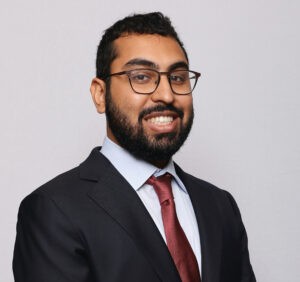
Tejas Dave (He/Him/His), Emory University School of Law, ‘22
In college, based on research work I was doing on consumer credit, I became interested in using policy tools to build a safer and more equitable financial system. Before law school, I spent time interning on Capitol Hill and at a think tank, working at the Federal Reserve, and volunteering on campaigns to figure out where I could best fit into the policymaking world. Specifically, my time at the Federal Reserve got me interested in banking law and regulatory rulemaking. Guided by this interest, and after a short stint in risk management at Capital One, I applied to law school.
I joined ACS my 1L year to become part of a network of law students and lawyers similarly interested in using legal and policy tools to realize progressive goals. Since then, I’ve been inspired by the work done by my peers at Emory and throughout the broader ACS network. I’ve also enjoyed working with the Georgia Lawyer Chapter and ACS National to host and participate in events related to elections and voting rights.
This year, I’m proud to serve as a Co-President of the Emory Law ACS chapter. Along with our Board, I hope our chapter provides a space to discuss progressive ideas and helps remind students why they went to law school. In the upcoming months, we plan to host events that help guide the discussion around how to achieve progressive policy goals after the election.
10/26/20
Megan Raymond (she/her), Berkeley Law, Class of 2021
The one sure thing about law school is everyone has opinions about it: whether to go, where to go, why to go, what to do when you’re there, and what to do when you’re out. Though I wanted to be a lawyer when I was younger, I heard enough from the anti-law-school crowd that I decidedly was not going to law school upon college graduation.
But I knew I wanted a job that aligned with my progressive values, and I was influenced by a mentor’s advice: “If you want to most quickly and deeply impact the issues you care about, work in electoral politics.” So I did, spending the next four years as a political media consultant helping candidates, nonprofits, and other campaigns reach voters, shape public opinion, and elect progressive leaders.
A few years in, I helped produce a TV ad criticizing an opponent’s economic record, which became the subject of a cease and desist letter from his campaign. It questioned the factual basis of our claims, but we stood by them. As a result, I had a few phone calls with our legal counsel, who advised us how to tweak the ad and wrote cogent response letters that settled the issue. I remember thinking, “I want to be the one giving that advice, not receiving it.” Soon after, I made the decision to go to law school and am proud to now attend Berkeley Law.
Part of what has made my law school experience so meaningful is the ACS community. ACS was the first group I joined on campus—since then I have held the positions of 1L representative, vice president, and now co-president alongside my friend and classmate Francesco Arreaga. ACS has allowed me not just to stay involved in the policy issues I care about—what drew me to electoral politics in the first place—but also to develop the legal tools necessary to be an even stronger advocate.
My favorite thing about ACS is the diversity of interests, expertise, experiences, and passions it brings together in one community. At Berkeley Law, I think of ACS as our progressive home base: our members are interested in a wide variety of areas of law, but what bonds us is our commitment to fighting for equality, justice, democracy, and the rule of law. ACS members across the country give me hope for the future, and I look forward to a career surrounded by the support, collaboration, and resolve of the ACS community.
10/19/2020
George Rhoden, Western Michigan University Cooley Law School (Tampa), ‘20 (December)
We all have experiences that shape our story. Because of my personal experiences throughout my early educational career, I noticed some deficiencies in the educational system and how it doesn’t always work equally. When people are not properly equipped to handle educational issues, they need someone to advocate for them. This is what led me to want to practice education law. No one should feel as if they can’t be heard. No one should feel dismissed.
Throughout my time in law school, I have met many amazing people who have become life-long friends. In law school, I have joined school organizations that facilitated growth in leadership such as ACS. Being the first president of my school’s ACS student chapter came with a lot of pressure and responsibility. However, during my time as president, I can definitively say that my leadership skills have strengthened. Law school has challenged me in ways like never before, but because of those challenges, I have grown , and for that— I am grateful.
Being an attorney is what I’ve always wanted to do. I believe I come from a diverse background of experiences that I could use to benefit other people. What I’ve come to learn is that people just want to be heard and related to. Communication really is key, not only at the attorney-client level, but also at the human level. If we can properly communicate with one another, we can be much more effective in our democracy.
10/12/2020
Zoraima Pelaez (she, her, ella), University of Texas School of Law, ’22
As someone who has had an abortion, I am dedicated to dismantling the stigma around abortion care and working to expand and protect the right to decide when, if, or how to parent. Prior to attending law school, I worked in outreach and advocacy for a Texas political nonprofit and served as the board vice-president of a Texas-based abortion fund. My time as a political activist and organizer deepened my knowledge of the effects of state restrictions on reproductive rights and introduced me to the creative strategies for combating these attacks. I have had the opportunity to organize protests, events, and trainings to mobilize and educate Texans. I have also worked in coalition with advocacy and non-profit organizations on direct-lobbying and grassroots-lobbying strategies to mitigate or stop harmful anti-abortion legislation.
10/5/2020
Oluwatomi Ogunsanya (she/her), Howard University School of Law, ‘21
Growing up, I was no stranger to the saying that the Constitution needs amendments. Before starting high school, I was already of the belief that the Constitution’s intent was not to benefit people of color and certainly not women of color. As a pre-med student who could not get the concept of justice out of my head, I purchased a big constitutional law textbook and decided that I would work towards making the Constitution a document that was written by and for all Americans, not excluding women like myself. In preparation for my mission of making the Constitution more diverse, I became a sociology major and chose to go to law school to gain knowledge of the societies and perspectives that informed our past, exist today, and that will arise tomorrow.
While wheeling my textbook-filled book bag home after my first week of law school, I received a 35-page copy of the Constitution meant to fit in my pocket from a Lexis stand. Immediately, my interest peaked. “This short compilation of laws governs the whole country? Why was the textbook so long then?” I thought as I placed the Constitution in my back pocket. During my train ride home, I began reading my pocket Constitution—which surprisingly excluded all the statutes from my previously purchased con law textbook. By page 21, I realized that the current Constitution protects my God-given rights as an American citizen.
I joined ACS during my 1L year of law school, and due to my hard work and love for the Constitution, I became President in my 3L year. By then, I understood the Constitution to be the contract between the individual people of the United States that created and maintains the United States government. To achieve and preserve peace and prosperity for those bound by the contract, the Constitution charges the government with the duty of protecting the God-given rights of the people and demands that the people fulfill their obligations to the government. I was also of the understanding that I, and others like me, are individuals with rights and obligations under the Constitution. Although the drafters of the Constitution may have never intended for a man or woman of color to head or participate in the government created by the Constitution, today, the Constitution’s drafters can not stop men and women of color like President Obama and myself from utilizing the Constitution to our fullest benefit.
Still, there are portions of the Constitution that can profit from amendments. However, many members of my community have been deprived of the potential and benefits of our current Constitution. I have been given the opportunity to learn that the laws of the United States recognize the fact that women of color have God-given rights and humanly negotiated obligations—irrespective of the Constitution drafters’ alleged intent. Once applied equally and then amended to fit the social constructs of the present day, the Constitution of the United States is a contract that makes for the best country in the world.
I am optimistic that historically disenfranchised communities will one day know and use all the rights and obligations provided to them by the Constitution. That is why we have been working tirelessly on initiating events such as Constitution in the Classroom, where we provide elementary, middle, and high school students of different socioeconomic statuses with an early introduction to the Constitution. Thank you, ACS.
9/28/2020
Alexis Ramsey (She/Her/Hers), University of San Francisco School of Law, ‘21
I joined ACS in the end of my 1L year. The chapter at USF had dwindled, but our academic advisor, Julie Nice, was incredibly excited to get the chapter going again. My Co-President, then a 3L, wanted to run events about progressive lawyering. I didn’t know what progressive lawyering was at the time, but it has since become integral to my philosophies. We, as a country and people, cannot remain where we are now. Our legal system must change; we’ve been seeing the signs and now the signs are on everyone’s lawns.
This year, our chapter is focusing on how progressive lawyering can help to dismantle white supremacy. One part of that is ACS’s progressive pipeline to judgeships. Our system will change from the ground-up, especially given our political climate. Having judges in district and appellate courts who understand that our laws are currently unjust is the second step to that kind of ground-up change. While judges are bound to uphold constitutional laws, they can at least write opinions that give advocates a leg to stand on. We all have a duty to call out laws that keep the status quo because the status quo is detrimental to the vast majority of our population.
The first step to this ground-up change though is the advocates. Our chapter’s priority this year is getting students to see the need for change and how that change can actually happen, before and as they become lawyers. We think we’ll have an easy time motivating everyone this year, but we want to keep the momentum going. We have a lot of work to do and we’re excited to continue it.
Yours in Progress,
Alexis Ramsey ACS USF Student Chapter Co-President
9/21/2020
Soo (“Sue”) Bin Ahn (she/her/hers), New York University School of Law, ‘22
In February of this year, I “officially” became an American. It was confusing, to say the least, being welcomed to a country that I have held as my own for the past eighteen years—being instructed through a pledge of allegiance and national anthem so familiar to me, threaded inextricably through the fabric of my childhood, by virtue of my upbringing within the New Jersey public school system. With images of Lady Liberty and Ellis Island plastered across the television screens in the room where the ceremony was held, I experienced the whirlwind of renouncing my motherland and becoming fully recognized by the country that I held as mine. In my hands was an envelope containing a welcome letter signed by the current president; simultaneously, on that very day, a small sliver on the front page of the New York Times sported the headline “Immigration By Legal Path Begins to Fall,” with the front page of the Politics section reading, “As Trump Barricades the Border, Legal Immigration Is Starting to Plunge.” The emotions during the naturalization ceremony were and always will be ineffable—however, I found a grounding force in my pledge to support and defend the constitution of this nation.
A casual Buddhist, by familial association, I find that the words that I hold on to more than any prayer are those of Chief Justice Marshall’s: “We must never forget that it is a constitution we are expounding.” It is, indeed, a constitution we are expounding. And nothing is more gratifying, harrowing, nor interesting than analyzing how this outline of broad principles fares in the faces of divisive partisanship and societal changes. We are law students and lawyers in a time where it is more apparent than ever that the Constitution was written when so few were deemed as fully human, as deserving of fundamental rights and constitutional protections. Make no mistake—the Black Lives Matter movement is not a sign of the times. It is a mobilization around the lifelong lived experiences of Black Americans, living in a nation and systems that were architected to preserve white supremacy, in vestiges of Black enslavement that present themselves in modern forms such as voter suppression and the carceral state.
Constitutional law is and can be a difficult experience for students with marginalized identities. From sensationalized cases falling woefully short of their layman legacies (Brown’s “with all deliberate speed”) to the current Court’s slow gutting of the reproductive rights jurisprudence (June Medical) and selecting to distill racism down to an administrative law issue (Department of Homeland Security v. Regents of the University of California), it can be an all-too-glaring experience of realizing how little our nation has progressed from the days of its founding.
But I find hope in our constitution and in its areas of silence and ambiguity. The fervent beliefs in freedom and representation, manifesting themselves into the structures of our government, are the principles of our nation that must be afforded to every individual. And it is our job, as progressive law students and attorneys, to utilize law as a tool for progressive change that will get our nation to where it needed to be, always. ACS allows me the platform, resources, and network to push for progressivism—and I am incredibly honored to serve in the co-president capacity at NYU Law, fighting for justice alongside my incredible peers, as the next generation of lawyers.
9/14/2020
Robby Sisco (he/him/his), Santa Clara University School of Law, ’21
I’ll never forget when I first read the quote, “Success is moving from failure to failure with no loss of enthusiasm.” My experience and observations have found these words to ring true.
In high school, it was a goal of mine to become a professional golfer, and I failed. I failed again when I wanted to enlist in the US Marine Corps, and again when I was medically discharged during Basic Combat Training for the Army. I went to community college with the intention of working in law enforcement, and I failed again. A spark went off, however, when Donald Trump won the presidency. The range of emotions I felt that night varied but surprisingly included a new desire — to get involved. It was that night I decided I wanted to be the most effective advocate I could be, so I made the determination to go to law school. I now feel as if my life has a greater purpose, and I am on my path to personal fulfillment.
I found a community of like-minded people through the American Constitution Society. While being a member of the organization during my 1L year, I was able to attend the Leaders from Law Workshop in Las Vegas where I learned techniques and strategies to balance running for office after law school and a legal career. During my 2L year, I was fortunate enough to volunteer through ACS and TIME’S UP to help a firm in Hawaii represent a victim of sexual harassment and assault. Now, as Co-President of the ACS Chapter at Santa Clara, I get the opportunity to lead a group of motivated law students as we spread progressive values.
To achieve my goal of growing and learning as much as I can to better serve my future clients, I began working with the Panetta Institute for Public Policy, where I received guidance and mentorship on drafting policies. During my fellowship, I drafted a policy advocating for an increase in government funding of FAFSA in an effort to make higher education more affordable and accessible to all. In a separate policy class, I advocated for limiting class sizes in elementary school to increase success and end the school-to-prison pipeline.
Each month of 2020 has brought forth new challenges, new opportunities for failure, and a continuous test of our resolve. Yet, our enthusiasm for progress is as strong as it has ever been. Stay motivated. Stay engaged.
BLACK LIVES MATTER.
9/7/2020
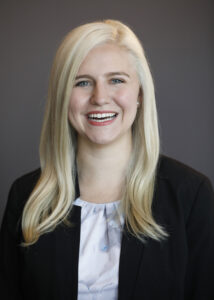
Pamela Rattinger (she/her/hers), Arizona State University Sandra Day O’Connor College of Law, ‘22
After completing my undergraduate studies, I started working as a paralegal at a Big Law firm in New York City. While many of my preconceived notions about working in the legal field were quickly confirmed, such as long hours, exciting hearings, and endless research, I was caught off guard by one thing in particular. Whether at the beginning of meetings or over a celebratory team dinner, I was shocked by how often the attorneys I worked with discussed politics, policy, and overarching theories of how our society should function. Up until then, I had been taught my entire life to keep my mouth shut and head down when controversial topics arose in a professional setting.
When I arrived at the Sandra Day O’Connor College of Law a few years later, I knew I wanted to explore how best to discuss these topics with my peers. ACS has given me the chance to dissect my own opinion on several topics and the opportunity to have lively and respectful debates with those I may disagree with. Last year, our chapter’s board had an active group message where we would examine local and national news, as well as legal doctrine we learned about in our classes. These discussions made me more confident in sharing my own views, while also examining what discussions were missing on our campus.
It is not surprising that many of the conversations I had with ACS members over this past summer have centered around racial justice. One day, while debating the merits of qualified immunity with my board, I stopped to reflect on whether these conversations were happening on our campus as a whole. Unfortunately, it seemed that up until that point, racial inequality was only a footnote at the end of panels or presentin the seldom-verbalized undertones of our casebooks. The omission of race created a massive gap in our educational learnings, and I knew that ACS would be the perfect organization to bridge that divide.
This year, our chapter will be hosting an event series that addresses the intersection of racism and the law. The events will explore topics such as prosecutorial accountability in police brutality cases, racism in reproductive rights, and how racial discrimination is written into the federal income tax code. These events will be run as group discussions, to allow all our members to engage with the material in a way that our board often does in group messages. My hope is that by highlighting these inequalities, my peers will begin examining how different laws can be discriminatory and what we as law students and future attorneys can do to make the legal system more equitable.
ACS has allowed me to not only become comfortable discussing controversial topics, but also has given me a forum in which to explore how to turn my thoughts into actions. I have been able to explore complex issues that previously eluded me alongside an understanding and compassionate group of my peers. ACS has also given me a place to bring the injustices that inflame my passions to the forefront of conversations happening on campus. I am incredibly honored and humbled to be serving as President this year, and hope that I can continue to make ACS a place in law school that accepts all people as they are and gives them a safe place to explore controversial topics in a professional setting.
8/31/2020
Francesco Arreaga (he/him/his), University of California, Berkeley, School of Law, ’21
I am very proud to be a part of the American Constitution Society and to help co-lead the student chapter at UC Berkeley School of Law this year. ACS has been a very important part of my law school experience because it has introduced me to a nationwide community of progressives who care about ensuring that our nation’s legal system serves the public good while advancing liberty, equality, and justice. Moreover, as a first-generation professional, I am deeply grateful for all of the support that ACS has provided me as I navigate the start of my legal career.
One of my favorite activities in law school has been volunteering for ACS’s Constitution in the Classroom program. Through this program, I have had the opportunity to teach kids in elementary school about our nation’s constitution. The most memorable experience I had was teaching a group of fifth-grade students in San Francisco’s Mission District about the separation of powers in both English and Spanish. After lecturing about the constitution, I had the class split up into the two chambers of Congress and come up with laws that they wanted to enact.
The students proposed rent control ordinances to reduce homelessness in San Francisco, banning plastic from schools to protect the environment, and providing all students locally grown organic food for lunch. One student also expressed the need to prohibit guns inside of schools because he did not want his school to be a dangerous place. Another student asked during our discussion if the President of the United States is above the law.
I was in awe by all of the students’ keen awareness of local and national issues. Children in fifth grade were imagining a world where people are safe, the environment is protected, housing is provided, and sustainable food systems are created! Members of Congress should consider consulting more with children across our nation because they would inspire them to take action! After convening the legislative session in class, the students asked me about what it was like to study law and why I wanted to be a lawyer. I told them that the path to a legal career is challenging but not impossible if you persist. I let them know about the variety of career options that lawyers have and described my goal to utilize my legal training in the area of public policy to help reimagine and rewrite the rules that structure our society.
At the very end of the discussion, the students asked me about my ethnic background, and I let them know that I am Hispanic. A second later, a bunch of the Hispanic children inside the classroom smiled widely and jointly screamed, “Latinooo!” At that moment, I learned about how important it is for kids to be able to see people who speak their language and share a similar background as them in leadership positions. I hope that through this activity I inspired these kids to be civically engaged, join the legal profession when they are older, and work to improve our society.
Civic engagement and public service have always been important to me. Growing up, my mother often told me, “It is better to give than to receive.” Throughout my time in law school, I have been involved in various pro-bono activities and have had the honor of interning for Senator Elizabeth Warren’s presidential campaign and Senator Sherrod Brown’s staff on the U.S. Senate Committee on Banking, Housing, & Urban Affairs. Now, I am looking forward to interning for Senator Patrick Leahy’s staff on the U.S. Senate Judiciary Committee this fall.
My goal is to utilize my law degree to advance bold progressive policies that will promote social, racial, and economic justice in our country. I also hope that I can help make the path to the legal profession easier for other first-generation professionals and students of color. As members of the legal profession, we must ensure that communities that have historically been excluded from the practice of law or systemically targeted by our legal system have their voices and experiences abundantly represented in our profession. Fighting for justice is not easy, but I know that I am not alone in this endeavor because the ACS network shares these values.
2019-2020
5/18/2020
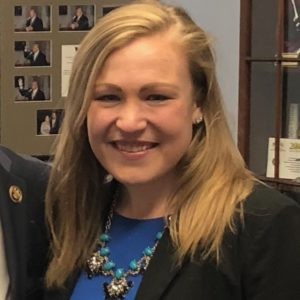
Katie Teleky, University of Michigan Law School, ‘21
“Your pain leads you to your passion to do your purpose.” The first time I remember hearing that phrase, I was sitting caddy-corner from Congressman Elijah E. Cummings, trying to prove I had the requisite passion to work in his office. The words resonated with me then, but it is only recently that I have come to fully grasp their meaning.
I had the privilege of working for Rep. Cummings on the House Committee on Oversight and Reform for five years. As the lead staffer on census issues, I investigated the Trump Administration’s proposal to add a citizenship question to the 2020 Census. Upon returning to the Committee as a staff member for my 1L summer, I continued that work as the House held Secretary Ross and Attorney General Barr in contempt of Congress for refusing to comply with the Committee’s requests. I also worked on a myriad of healthcare issues, ranging from staffing hearings on the skyrocketing price of prescription drugs, to protecting the Affordable Care Act from repeal, to drafting provisions of the CARE Act—a bill focused on addressing the opioid epidemic through treatment and prevention efforts. While I learned so much from each of these experiences, perhaps nothing was more rewarding than learning what it was like to wake up every day knowing that my actions had the potential to make a very real difference in the direction of both peoples’ lives and the law.
This passion for legislation, congressional investigations, and, ultimately, public service, drove me to law school and prompted me to join ACS upon my arrival. ACS has provided me an opportunity to continue engaging with the progressive policy issues I dealt with during my time on the Hill and to expand my network of individuals similarly committed to ensuring that the law works for everyone. In my tenure as a President of Michigan Law’s Chapter, I hope to facilitate a similar experience for other students.
As I pass on that torch and finish my 2L year, I am consistently reminded of Rep. Cummings’ words about pain, passion, and purpose. Those simple words have taken on a new meaning as I watch this pandemic expose the stark disparities in our healthcare systems, the gaps in our social safety nets, and the breakdown of our democratic norms. In these times, though Rep. Cummings is no longer here to call us to be our better selves, the pain of his absence has amplified my passion for public service and made clear my purpose. I honor his legacy by fighting for healthcare access, government accountability, and, as he often termed it, “the soul of our democracy” every day of my career.
5/11/2020
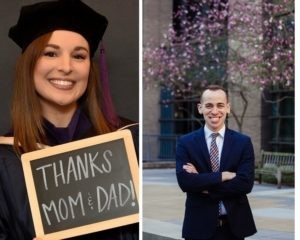
Shelby Smith (she/her/hers), Georgetown University Law Center, ’20
Brett Graham (he/him/his), Georgetown University Law Center, ’21
Shelby:
My law school career began eight months into the Trump presidency. Although I was already planning to pursue a legal education in 2016, many facets of the election illuminated the urgent need for me to fight for a progressive vision of the future. But I came to Georgetown with no real concept of what that fight would look like. Three years later, ACS has been an integral part of discerning my career path and allowing me to meaningfully contribute to the resistance.
In undergrad, I never wanted to be a lawyer. Being the first attorney in my family, my previous perception of lawyers was a caricature of argumentative, self-centered workaholics. By the end of my senior year, with some encouragement from friends and professors, I had come around and decided to apply to law schools. Once I got to Georgetown, it took two and a half years to find excitement about and confidence in a career path. But during my 1L year, I decided to join ACS as a Chapter Liaison, and ever since, ACS has been the biggest constant in my law school career. Despite not knowing how I would be serving my community after graduation, ACS allowed me to contribute to the progressive movement while still in law school—not just wait around for a degree to make a difference.
Through ACS, I engaged with like-minded colleagues, learned about the real-life consequences of the topics I was studying, and made a difference in my community. ACS was there every step of the way during my career search. The attorneys and professors I have met through ACS have always been happy to help me network, give me practical advice, and check in on my well-being. Members of other student chapters have become lifelong friends and have gone above and beyond to support me and the Georgetown chapter in general.
I am happy to be able to say that I finally found my path. In August, I am thrilled to be starting my legal career as a public defender in Florida. I look forward to joining the local ACS lawyer chapter and continuing the critical work of progressive litigation and advocacy.
“Do not be daunted by the enormity of the world’s grief. Do justly now. Love mercy now. Walk humbly now. You are not obligated to complete the work, but neither are you free to abandon it.” -Pirkei Avot
Brett:
For the Class of 2021, calling the first four semesters of our law school experience “eventful” would be a massive understatement. We arrived on campus as the country descended into a bitter Supreme Court nomination fight, then witnessed the longest government shutdown in American history as we rounded the corner into the second semester. Just before our 2L year began, a whistleblower complaint lit the fuse of a months-long national discussion of impeachment, and we now end that year taking classes on Zoom amidst a global pandemic.
Digesting all of this while keeping up with the demanding nature of a legal education has not been easy. But at least one constant, for myself and many others across the country, has been ACS. From its programming on the legal and political consequences of each of these momentous events, to making it possible to continue looking for jobs and internships to connecting us to progressive attorneys in a wide variety of fields, ACS has made being a law student in a difficult time manageable.
Law students like certainty. We like being able to find precedent that squares perfectly. We like knowing that if we get this GPA and write on to that journal, the broad range of outcomes when we step off campus narrows, even if only slightly. In searching for this certainty, though, I think we often lose sight of what a legal education is in the first place and what the world will be like when we leave law school— anything but neat.
ACS has helped ease that uncertainty for me. As I head into my third and final year of law school, whatever it may bring, I know that I am part of a community of progressive lawyers doing incredible work who are happy to share their wisdom with me. My hope is to embark on a career in public interest litigation, specifically dealing with voting rights and election law. Though the time I have left on campus is limited, I know my time as a member of ACS has only just begun.
5/4/2020
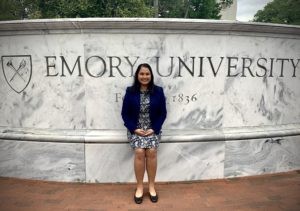
Rashmi Borah (she/her/hers), Emory University School of Law, ‘20
On November 8, 2016, I was working as a Research Associate for the Presidential Commission for the Study of Bioethical Issues, established by former President Barack Obama. That evening, as results from across the country kept rolling in, my heart sank further and further with each state that fell. And once the election outcome was final, I made one phone call— “Mom, I’m pretty sure I’m going to lose my job.”
A few days later, I signed up to take the LSAT.
My experience working for the Presidential Commission was foundational for me. When I started, I had just graduated from Ohio State University with a degree in Microbiology. The position presented my first exposure to lawyers with scientific and technical backgrounds. I realized the tremendous impact interdisciplinary lawyers can have across various legal sectors. I chose to begin my legal career at Emory because of the institution’s longstanding history of producing lawyers dedicated to public service.
I have always worked to ensure that my career choices and my interest in life sciences and patent law don’t stand in the way of my desire to be of service to the community. ACS gave me an opportunity to apply my technical background to areas of the law that impacted marginalized communities, such as disparities in healthcare, prescription drug pricing, and regulatory barriers at the U.S. Food and Drug Administration. After seeing the horrific and inhumane policy changes that have taken effect since 2016, it is encouraging to know that there is still a community of progressive lawyers and law students from all backgrounds and areas of practice fighting to create an equitable society.
Without a doubt, being the Co-President of the Emory ACS Chapter has been the highlight of my law school career. ACS at Emory gave me and other like-minded students the opportunity to explore legal issues that we cared about. It has been heartwarming to see how much the Emory chapter has grown in the past three years and how much the progressive voice on campus has strengthened.
In addition to being involved with ACS, I am the first openly LGBT Editor-in-Chief of the Emory Law Journal. I also served as the Deputy Director of the Emory Law School Supreme Court Advocacy Program, where I helped draft petitions for certiorari and amicus briefs to the U.S. Supreme Court. I’m so excited to continue my involvement with ACS as part of the incoming class of Next Generation Leaders.
4/27/2020
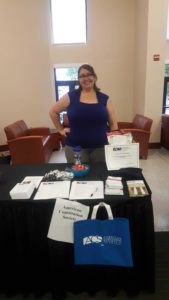
Amanda Pescovitz (she/her/hers), George Washington University Law School, ’20
Getting involved with ACS was part of my law school plan from day one, to the point that I startled the person tabling for our chapter at my 1L organization fair. I was excited that an organization existed dedicated to the progressive promise of the Constitution which had inspired me as far back as junior high, when I participated in the We the People civics program in my home state of Ohio.
At GW Law, I have had the honor of serving our student chapter for all three years of law school, culminating in being our chapter’s president this past year. As a student, leader, and soon-to-be attorney, I have always seen my job as helping others succeed and ensuring that I use the privileges and opportunities in my life to better the lives of all people.
ACS has been an integral part of that mission for me because of the dedication of its members to reforming areas of the law that have been and continue to be used to the benefit of the few at the expense of the many. Working with my fellow chapter leaders over the past few years has exposed me, and our greater law school community, to a diverse range of pressing legal issues that don’t always get mentioned in class, such as ADA compliance in web design and the effect of federalism on voting rights and reproductive justice. I’m grateful to be part of a community of kind, intelligent, and fiercely determined advocates for justice.
4/20/2020
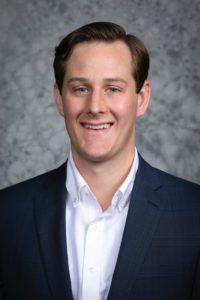
Connor Clegg, University of Wisconsin Law School, 2021
In 2014, I joined the American Constitution Society family as the national office’s Lawyer Chapter Fellow. Six years later, I now serve as the president of the University of Wisconsin Law School Student Chapter. While my role in this organization has changed, my faith in ACS and its mission has not. ACS plays a crucial role in securing and protecting the promises of our Constitution.
Nowhere is the importance of this mission more apparent than in Wisconsin, where corporate capture of the state courts and legislature has eroded our democracy. In Madison, the University of Wisconsin Law School Student Chapter and the Madison Lawyer Chapter have teamed up to educate the legal community about these threats. In 2019, our chapters organized a panel on the lawsuits challenging the 2018 Wisconsin lame duck legislative session. Attorneys representing each party in the multiple lawsuits—the Governor, the Legislature, labor unions, and individual voters—shared their perspectives to an audience of more than 100 law students and lawyers. This year, the University of Wisconsin Law School Student Chapter has educated the student body on a number of issues, including the role of state attorneys general, critiques of originalism, and a discussion on court packing.
I was drawn to law school because of my interest in workers’ rights and labor unions. The University of Wisconsin Law School’s Neighborhood Law Clinic was my first chance to work in that area. As a clinical law student, I represented a worker seeking to recover unpaid wages. That experience confirmed my interest in wage and hour litigation. I am fortunate enough to continue that work as a law clerk for Hawks Quindel, S.C., in Madison. When I graduate, I will pursue a career in plaintiff-side labor and employment law. If the past is any indication, I know ACS will be with me every step of the way.
4/13/2020
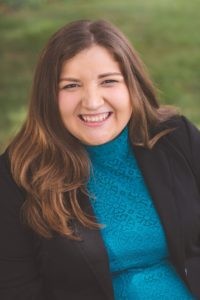
Natasha Martinez (she/her/hers), University of Missouri School of Law, ’21
Creating a better life for others in my community and my family is something I have dreamed about. I think about how truly privileged I am to be sitting at law school (currently via Zoom School of Law) taking Education, Property, and Immigration Law classes. As a first-generation college and professional student, I never underestimate how much education has created a pathway for myself and my family. Through my experiences, I have become a passionate advocate who is driven to ensure all voices are represented in the legal system.
During undergrad, I worked a variety of shifts at different jobs and then would come home and study until I started the cycle again. This work led to my first opportunity to intern with the League of Women Voters of Kansas, an organization that showed me my passion for voting rights. This organization displayed how important grassroots organizing can be in a community. The experience also revealed how disenfranchising election law changes and restrictions can be for a community. I started getting the opportunity to bring my ideas and strengths to life and my spark was ignited. From that point, I had a mission and it was to support others in their right to access the vote.
While law school had been on my mind since high school debate and student council, this was another reason added to my list (thanks ACLU Voting Rights Project team for that inspiration). I knew I could support newly naturalized citizens like my dad; young voters like myself; and communities like my own, to have access to the ballot. Since going to law school, I have learned so much more. I have learned how important getting an education is to getting a seat at the table. I appreciate the opportunities ACS has given me to have these crucial conversations within the legal community, both through formal events and informal conversations with fellow ACSers. The current state of affairs displays how important it is to have ACS members on the forefront of future legal and policy conversations. Last summer, I interned with the ACLU of Missouri, which fueled my passion for legal advocacy in Missouri. This summer, I will be interning with the team who originally inspired my dreams for law school: the ACLU Voting Rights Project.
4/6/2020
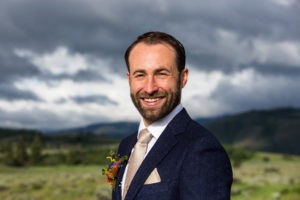
Ryan C. Sedgeley (he/him/his), University of Wyoming College of Law, ’21
I recently stood at the confluence of the Firehole and Gibbon Rivers, knee deep in snow and enmeshed in the calm murmur of the headwaters of the sleepy, meandering Madison River. It is a place I have returned to year after year in both service and appreciation. Under the silent gaze of National Park Mountain with its swirled, dark obsidian rock, the specialness and magnitude of what our public lands stand for seizes my heart and invigorates my passion.
Whether it’s the Madison River or any of the innumerable landmarks across our public lands, the clean air we breathe, or clean water we drink, we cannot take our natural resources for granted. Their protection and responsible use require constant vigilance by those who will be a voice for the voiceless. My love for public lands has fueled my advocacy for them. I have worked with conservation organizations and volunteered with our federal land management agencies. This passion has also led me to pursue a master’s degree in environment and natural resources at the Haub School of Environment and Natural Resources at the University of Wyoming, where I am also earning my J.D.
Along with my devotion to our public lands, I am also engaged in advocacy for the LGBTQ+ community, women’s rights, and legal education reform. Outside of advocacy, I am an artist specializing in watercolor painting and sculpture, and I also run a small custom jewelry business.
3/30/2020
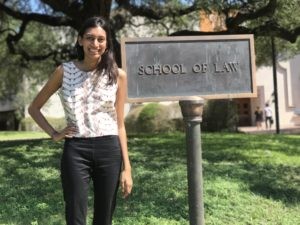
Savannah Kumar (she/her/hers/they), University of Texas School of Law ‘20
As a teenager, I worked alongside individuals incarcerated at San Quentin Prison to support their idea of raising funds for leadership training for young people who experienced violence and trauma. At San Quentin Prison, I learned about the horrors of peoples’ experiences with solitary confinement, being transgender women in an all-male prison, and experiencing cultural isolation.
I decided to attend law school after realizing that lawyers were often given the near-exclusive privilege to enter certain hidden spaces and advocate in certain formal settings. I hoped to attend law school to bear witness to violence and oppression and use the law to creatively advocate for individuals and groups experiencing injustice.
My 1L year was not the critical, intellectual academic experience I had hoped for. I felt stifled in classes that omitted critical race theory perspectives and that seemed to celebrate uncritical thinking about doctrines that continue to do violence to real people. I felt frustrated by a final exam in constitutional law that asked students to write a memo defending school segregation. In response, I talked with other students and alums and wrote an open letter asking the law school to respond to racism on campus. And to emphasize that the law is just one tool to address oppression, I exhibited art in my community on social justice themes during my 1L year and my 2L years. In addition, I worked with other students (including many ACS members) to organize a 2-day conference, “Getting Radical in the South”, during my 2L year to highlight innovative, progressive, and radical approaches to public interest lawyering in the South.
As the president of ACS at Texas Law, I have had the opportunity to work with other students to challenge our law school community to consider how the law is perpetuating injustice. With ACS’s support, I led an ACS call/podcast titled “The ‘Remain in Mexico’ Policy: Raising Awareness and Crafting a Response Through Student Organizing”. On it, I discussed my clinical experience representing asylum-seekers forced to wait in Mexico for months while their cases are processed. I also shared organizing strategies based on our on-campus teach-in designed to mobilize students to respond to the Trump Administration’s dangerous “Migrant Protection Protocols” policy. Our ACS board has organized discussion-centered events on a range of critical topics that are not covered by courses at the law school. In addition, I am proud that the current and incoming ACS boards recently wrote and published a statement in support of LGBTQIA+ students at Texas Law who have faced attack by another student group at the law school. I am thrilled to have worked with the ACS board to create two new positions for next year’s board: VPs of Racial and Social Justice and a VP of Community Organizing.
As law students, we are privileged to have access to spaces that are hidden from view and access to platforms for our voices. ACS has provided incredible support to our Texas Law ACS chapter to advocate hard on our campus and in our community and to make the law more accessible to all people.
3/23/2020
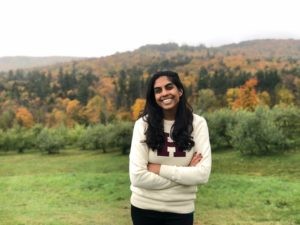
Radhe Patel (she/her/hers), Harvard Law School, ’20
As the first person in my family to go to law school, I arrived as a 1L eager to help support movements for progressive change but unsure where to start. There were so many organizations dedicated to different, critical issue areas—reproductive justice, environmental law, immigration, criminal justice—and as an academically curious person, I felt pulled in so many directions. Joining ACS was an amazing way to engage with all of these topics while also digging into other structural conversations and activism around the rule of law, democracy, and what a just Constitution demands of us.
I come from a city government background, where I worked in education and healthcare policy. These experiences colored my vision for our ACS Chapter as President this year—I was eager to bring more focus to state and local issues as the federal picture becomes increasingly troubling, and I was excited to collaborate with faculty and other chapters on how to make the work we do actionable and operable by providing diverse touchpoints for engagement and action beyond panels and talks. The thing I love most about ACS is how it provides a platform to do these things and more, so that as chapters we can be supporting and starting projects focused on reforms beyond our campuses and our states.
This is an interesting time to be a 3L—I don’t think any of us were expecting to finish our time at law school like this. Though many things are shifting, I’ve had some time to reflect on how I hope to incorporate staying involved with ACS in D.C. next year, as well as what we can all still be doing virtually the next few months. As the election looms large, I hope those of us who have the capacity will keep our sense of urgency to organize and act however we can as the world around us changes in unprecedented and scary ways.
In addition to being involved with our ACS chapter, I served on the board of our South Asian Law Students Association and am a Notes Editor on the Law Review.
3/16/2020
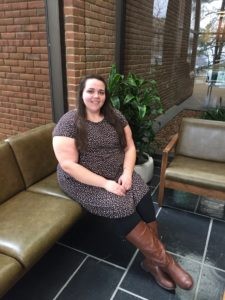
Courtney Clayton (she/her/hers), University of Cincinnati College of Law, ‘20
Growing up, I always wanted to go to law school but never really dreamed of being a lawyer. To me, going to law school meant that people would listen to me and that I would have the chance to make laws. Up through my undergraduate time at Marshall University, I never really liked to talk about politics because I grew up in a small town environment where the vast majority of people in my life had different views on hot topic items than I did and were never open to differing opinions in conversations. Not being comfortable voicing my opinion on these matters made the transition to law school difficult because all of a sudden, other people were well-spoken when it came to their positions and were able to have open conversations.
One thing that helped with my transition was getting involved with ACS. While I was not ready to add the commitment of being the 1L representative for ACS my first semester, I continued to attend every event they held and became close with the executive board. Going into my 2L year, my friends on the board convinced me to run for Treasurer, which led to another fantastic year of events put on by our chapter. I even had the opportunity to attend the National Student Convention along with three 1Ls and helped to build their interest in ACS. Coming back from Student Convention, I was named President for my 3L year and started to plan for the year ahead. When coming into my 3L year, the most important thing for me was to make ACS welcoming to all students.
As my time in law school is wrapping up, I have been looking back on the opportunities that ACS has given me. I have been able to receive scholarships to attend the Student Convention twice and have also been part of my chapter’s executive board for two years which, by the time I graduate, planned at least 45 events. Being a part of ACS not only helped me transition into law school but also helped to shape me into a better leader. The one piece of advice I have for all incoming law students is to find an organization that makes you feel at home and fully embrace everything it offers. That is exactly what I did with ACS, and I am thankful for every moment of it.
3/9/2020
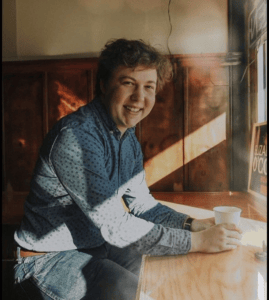
Bobby Larsen (he/him/his), Nebraska College of Law, ‘21
When asked to describe me once in a single word, one friend used the word “opinionated.” Another friend once described me as “exhaustingly positive,” and my second-grade teacher, when she ran into me years later, told me that she remembered me for being the only kid who “knew yourself, even then.”
I do know myself, and I believe that continuing to get to know myself better every day is the catalyst for everything else I do. I have been interested in politics since I was eleven years old. I would have my parents drive me to see politicians at book signings or rallies, wear my Obama button to school, and even got in trouble for circulating Obama vs. McCain polls in my sixth-grade class.
Being interested in politics is fine, but being involved just for the sake of being involved has always made me uncomfortable. In 2014, as I was on the cusp of going to college, I was at the lake with friends, kicking around the soccer ball with a guy who was also interested in politics. As we got to talking, he said that he would be fine working as a lobbyist, even for causes he didn’t believe in. That didn’t sit well with me.
When I really became involved for the first time, it was 2016, and Nebraska, my lifelong home, was having a referendum on the death penalty. When I started interning for the anti-death penalty campaign, people asked if that was actually the side that I was on. I thought that was a ridiculous question—of course it was! Why else would I be part of the campaign? I later found out that people I knew interned with one of the presidential candidates that year only to vote for another candidate; they just took internship with the candidate who would look the best on their resumes.
It is so easy to grow cynical. In the past four years, I have continually run into situations where I feel like nothing is actually being accomplished and that the people involved are fine with that. I am sure I’ve been guilty of it as well. It’s easy to want to change your school, your community, your country, your world, but it’s harder to actually take the first step in doing so.
I hope that my career in law allows me to make actual change in some way. It is a cliché, to be sure, but I have seen myself shut down when I’m in situations where no one around me cares about anything but a line on their resume. It’s a good thing I’m exhaustingly positive and know that better days are yet to come.
3/2/2020
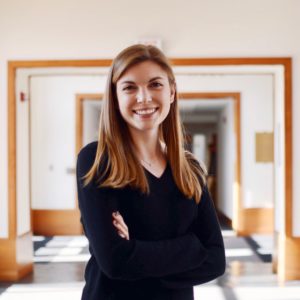
Nina Oat, University of Virginia School of Law, 21
After a recent ACS program at UVA, I had a conversation with a 1L that reinforced why the organization is such an important part of my law school experience. She told me that she had been doubting whether law school had been the right decision for her, but that speaking with a dedicated progressive advocate at the ACS program had re-motivated her.
I know that doubt she was experiencing well. Before law school, I was on staff at Constitutional Accountability Center, an organization dedicated to a progressive understanding of the text and history of the Constitution. This meant that I spent the first two years of the current political landscape working with brilliant advocates unwilling to back down from our mission. When I came to UVA, I struggled with the transition because I had become accustomed to being surrounded daily by the people I leaned on when the fight for progress seemed like a losing battle. Joining the ACS community was the solution to that disconnect. On days when my resolve was high, I had like-minded peers and mentors with whom to game plan. On days that brought particularly troubling headlines, I knew where to turn to regroup.
As a 2L and ACS chapter leader, I was so glad to speak with that 1L because it meant she was finding the same support and motivation that ACS provides me. It is undeniably a challenging time to be a progressive aspiring lawyer, and I have found that the importance in carrying the load together—professionally and personally—cannot be overstated.
In addition to working with our ACS chapter, I serve on the board for Lambda (the law school’s LGBTQ+ organization) and both coach and compete in moot court. I am also a Peer Advisor and a member of the Virginia Law Review. I spent my 1L summer interning at the Office of the Solicitor General for the District of Columbia and will spend my 2L summer as a summer associate at O’Melveny & Myers in Washington, D.C. I look forward to my continued involvement with ACS both as a law student and an attorney.
2/24/2020
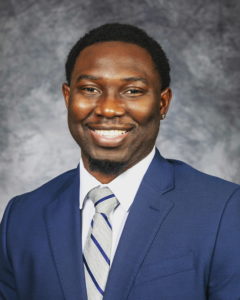
Delino Miller, Florida A&M University College of Law, ’21
I was born in Augusta, Georgia and raised in Sandersville, Georgia with my mother, my little brother, and my grandparents. Early on, I observed the negative effects of drug and alcohol abuse in my community. As a result, I knew I didn’t want to end up like those individuals who I felt were struggling mentally, spiritually, or emotionally. Despite not having many positive role models to emulate, I had a lot of examples of what not to imitate, which deterred me from drugs and alcohol. I knew I wanted to be healthier, help others, and be the good role model for others that I did not have.
Consequently, I aspired to go to college to gain more knowledge and remove myself from my negative environment. I attended Augusta University, and became a member of Alpha Phi Alpha Fraternity Incorporated, a historically black community-oriented fraternity, because of the organization’s involvement and positive impact in the community. Joining Alpha Phi Alpha Fraternity Incorporated assisted me in my goal to become a better role model, especially for other black men. At Augusta University, I worked in the university cafeteria, and as a student assistant and as a resident assistant in order to financially support myself through school. I majored in biology with dreams of becoming a pharmacist. I was told this was a great field to go into if I wanted to help others and be financially stable. After a few science-related classes, however, I realized I lacked interest in science-related subjects. I made the decision to switch my anatomy class for my first criminal law class and I fell in love with the law. I changed my major to criminal justice.
After graduating from Augusta University, I worked at the Augusta Public Defender’s Office as an administrative assistant. After my experience with the Public Defender’s Office, I decided to apply for law school. I haven’t regretted that decision since.
I am currently in my second year of law school at Florida A&M University College of Law. I am currently the Treasurer of the American Constitution Society and the Vice President and Treasurer of Black Law Student Association. I also serve as the Secretary of Entertainment Arts and Sports Law Society and a BARBRI Representative. I strive to be a better person every day. Upon graduating, I aspire to get my LLM in Tax Law.
2/18/2020
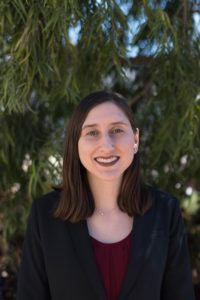
Sabrina McGraw, UC Berkeley School of Law, ‘20
I started out with a starry-eyed view of our government and the Constitution. In high school, I had competed in a civics competition called “We the People,” where I was able to study the Bill of Rights and show off my knowledge to judges on a mock-congressional panel. Through that program, I fell in love with the law and the potential good it could do. I knew it wasn’t perfect, but I felt excited to become a lawyer and work towards more positive change.
At UC Santa Barbara, I did everything I could to prepare for law school. I studied political science and philosophy, became president of the pre-law fraternity, represented students as a caseworker for the Student Advocate General’s Office, interned for the local newspaper to cover the legal news for the area, and listened to just about every true crime and constitutional law podcast I could find.
But, like many others on the night of November 8, 2016, I felt anger and hopelessness as the final presidential election tallies came in. As Trump took office, it was hard not to become cynical when there was a constant stream of news reports on all the ways he was systematically undermining constitutional rights and obliterating protective norms. But the ways that people were starting to fight back gave me some glimmer of hope. When I watched attorneys rushing to airports to offer individuals support in the chaotic aftermath of the Muslim ban, I started to see how a law degree could be used as a tool to effect positive change. Moments like this reenergized my interest in attending law school and gave me a sense of direction.
When I came to Berkeley Law and heard about the American Constitution Society, I knew I found an organization that could give me the tools I needed to become the kind of lawyer that would ensure that governments would fight for people and not against them. While we still face many challenges ahead, I am proud to be part of an organization dedicated to making things right. As one of the co-presidents of the Berkeley Law chapter, I am proud of how far our chapter has grown and the events we have been able to put on for our student body. I look forward to spending my career surrounded by the wonderful ACS network I have been so welcomed into.
2/10/2020
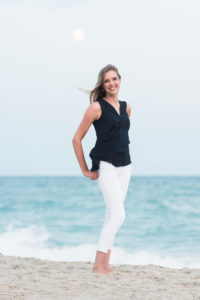
Julia Crawford, University of California Hastings College of Law, ’21
I am not one of those people who knew since infancy I would become an attorney. In fact, I hated talking about legislation, politics, and policies all the way through my first year of undergrad. I grew up in a small conservative town. For me, growing up in a small town meant growing up with small minds. I was surrounded by people who did not like change and attacked anything that went against the status quo. I experienced people vandalizing the homes and schools of those who were not what the majority deemed the proper sexual orientation, race, or religion. I saw the bullying that caused countless young people to take their own lives. Because of all of this hate and being surrounded by people unwilling to open up to new ideas, conversations about politics, the constitution, and legal issues made me angry. I was so angry that my mom, knowing the numbers were stacked against me, used to send me to school with candy to prevent me from speaking up too much in my high school government class.
I went into undergrad with the idea of making a career out of helping people. I thought about becoming a doctor and saving lives. I took a year of premedical courses when it finally hit me— I have absolutely no passion for chemistry. That summer, I switched directions and took a wide range of classes, including a class on the American legislative process. Every time I left that class, I was just livid at how much change needed to occur. It was walking home from that course with my mind racing when it all started to make sense, and I realized my new path. This anger I had was actually just my passion being expressed in an unfinished, unpolished way. I knew at that point that the best way I could help people and save lives was by becoming someone’s voice and being an attorney. I began taking every single legal, constitutional, and human rights course I could. I wanted to be prepared and to understand a wide range of issues to create the starting point of sympathetic advocacy for what others are going through.
I made my way to law school. I knew right away that I wanted to find a group of people who shared my passion and ideals. ACS is just that. Through it, I am able to become involved in my school’s chapter and invest in the community around me. One of my favorite law school memories is when ACS held a #MeToo event for lawyers in the city. To be a part of this safe space for people to share their experiences and be involved in steps to shift the culture of legal workplaces was unforgettable. ACS has allowed me to start doing what I have always wanted to accomplish before I had even started my legal career, helping other people. For this I will always be grateful. Movements have power in numbers, and ACS has given me a community ready to create change. I hope one day to give back as much support as ACS has given me.
2/3/2020
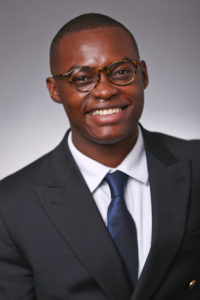
Andrew Lindsay, Duke Law School, ’21
“You’re just not a good fit,” my college advisor concluded. “You’d do better in chemistry for non-majors.” It didn’t escape her that my high school chemistry class in Jamaica — with its straw pipettes and nonexistent fume hoods — was markedly different from those of the others at Amherst College. I had loved that class and was awestruck by the drama of the fizzling of bubbles and the pungent haze as vapors filled the classroom. My grades made the cut, but as I checked a box for the entry-level course under her gaze, I swallowed a bitter reality. For some, it would never be enough.
My father, the son of yam farmers, left Jamaica to study in the U.S. He had managed, even thrived. What was it that he had that I didn’t? I thought about the stories he told, stories of the circle of supporters who shaped his path, from one of the few black teachers at his high school to his dissertation advisor. He sought supporters who understood his background and cared about his success, and I badly needed some of my own.
Having changed my major to law, I took a page out of my father’s book – cold emails, office hours, sheer luck – and I was never short on guidance and mentorship again. My first supporter, the department chair, helped me get an internship at the Charles Hamilton Houston Institute at Harvard Law School, pushing me into more diverse spaces to find more role models. That experience also pushed me to be more engaged in public policy in college. After I graduated, I worked as a researcher at the Brennan Center for Justice at NYU Law School for two years; it was there that I learned about the American Constitution Society for the first time.
I joined the Class of 2021 at Duke Law School as a Dean’s Scholar and Ruffa & Gallagher Scholar. At Duke Law, I’m president of the American Constitution Society. As ACS President at Duke, I hope to continue to build a community of legal professionals who—in addition to believing that the Constitution should work for all of us—are champions for diversity and inclusion like those I had, like those my father had, and like the one I hope to become one day.
1/27/2020
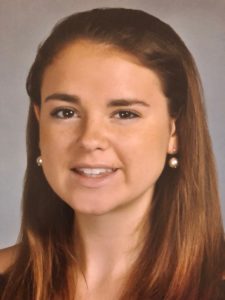
Hayley Hahn, University of Virginia School of Law, ‘21
Before law school, I spent nine months conducting research as a Fulbright student at McGill University. There, I investigated social service provisions and legal protections for First Nations children. Through this experience, I gained a deeper appreciation of how federalism can complicate, frustrate, and further the realization of social justice for marginalized groups.
Although my research focused primarily on the Canadian context, I have found ample opportunity to apply the lessons I learned as a Fulbright student to my current work as a law student in the United States. For instance, as an intern with the Legal Aid Justice Center’s JustChildren program this summer, I gained experience navigating the federal and state laws governing educational accommodations for students with disabilities. Understanding the relationship between federal and state statutory schemes was vital to advising clients. Similarly, participating in UVA Law’s Civil Rights Clinic has underscored the interrelated and, at times, contradictory relationship between federal and state laws. Throughout my career, I hope to continue to develop my understanding of federalism to effectively advocate on behalf of the clients and communities I serve.
ACS serves as an important touchstone in these efforts. From organizing an ACS event for Native American Heritage Month during my first year of law school to serving as ACS at UVA Law’s current President, I have been honored to lead and support efforts to further a robust, progressive understanding of the Constitution. I believe that the promise of “We the People” applies to all people. I am grateful that ACS supports students, lawyers, professors, and judges who seek to honor the Constitution’s promise through work that affirms the inherent dignity and equality of all people under our Constitution. In my current studies and future legal career, I am committed to furthering the realization of this, thus far, unfulfilled promise.
1/21/2020
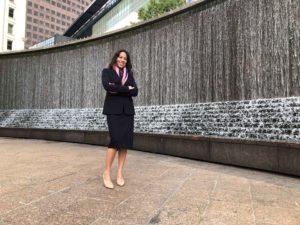
Julie Preciado, Willamette University College of Law, ’20
After completing my undergrad education, I promised myself that I would go back to finish grad school once my daughter got older. In the interim, I ran a small business and worked in everything from sales and service industry jobs to case management and medical interpreting, always working with the Spanish-speaking community. When the time came to go back to school, I was not sure which path to take. Choosing law seemed like a logical choice to marry several of my different areas of experience. I felt that I could either continue to help, on a more elevated level, the Spanish-speaking Latino community I had worked with for years, or I could continue to work on the business interests I had been developing with my siblings. A law degree offered me the flexibility I was looking for.
Once in law school, however, I found the principles of equity, inclusion, and other “progressive” ideals I had taken for granted in previous jobs were lacking from our curriculum and classroom discussions. Finding the group of buena gente that made up the Willamette Law ACS Chapter was part of what kept me feeling connected to a bigger purpose, and reinforced that what I was learning in class could be used to make a positive difference in the community and in the lives of regular people. Through ACS programming, I got to hear from experts in the field about relevant, timely, real-world applications of the law that we learn in class – from the fate of DACA, to court appointments, to LGBTQ+ rights.
I have fulfilled my promise to myself to go back to school, and in so doing have become the first in my family to attend graduate school and become a licensed professional. In pursuing my goal, I have accomplished more than I thought possible. Now, as a 3L, I am clerking with the U.S. Attorney’s Office and preparing to graduate. I have had the opportunity to present my research on language access at LatCrit, intern for a judge in the U.S. District Court for the District of Oregon, intern with the Chief Justice of the Oregon Supreme Court, assist Willamette’s General Counsel with research projects, and serve as president to the multicultural student association, the regional representative for the National Hispanic Bar Association, and the American Bar Association representative for Willamette.
As I look forward to graduation and my job at an employment law firm in Portland after the bar, I have the community of ACS, in part, to thank for my success because it provided me with a supportive nationwide network. It has allowed me to participate in national student conferences and to meet attorneys and judges locally and throughout the nation. I am proud to be part of the ACS family.
1/13/2020
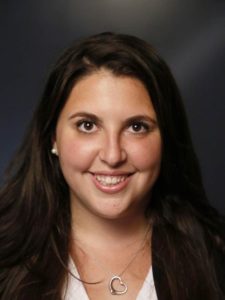
Julia Manacher, Arizona State University, Sandra Day O’Connor College of Law, ’21
I have always been vocal about my opinions, but I began considering myself to be a full-fledged activist in November of 2016. The outcome of the 2016 presidential election inspired me, along with a group of other highly motivated women, to engage politically; however, we weren’t certain where to begin. After considerable effort, we founded Women to the Front (WTTF), a progressive social action organization aimed at identifying organizations of limited means which protect, defend, and elevate the progressive ideals that we value. The women of WTTF pour our collective time and talents into throwing fundraisers for the organizations that we support to raise awareness and funds for their causes. Working with WTTF has strengthened my commitment to public service and helped me recognize how much I value being involved with an organization that contributes to the public good.
When I went to law school, I knew that I wanted to find a progressive organization where I could continue contributing in similar ways to my work with WTTF. ACS fit the bill. The moment I joined ACS, I realized that I had found a group that felt very much like the women I worked with back home. The other student members of ACS are equally committed to the progressive ideals that are so important to me. It has been an amazing experience to bring various speakers and programs to our campus that highlight our commitment to progressivism.
As an activist and future lawyer, my personal passion is for immigration reform. ACS has given me phenomenal opportunities to pursue my passion for immigration while enjoying the community that I have come to respect and appreciate so much while in school. The road to immigration reform is constantly changing and far from certain; but what I do know is that the progressive ideology ACS sets forward directly supports the reforms I believe are necessary in the battle for equitable immigration laws. I feel incredibly fortunate to have found ACS, a group that ties together my work with WTTF, my passion for immigration, and my progressive ideology, all while pursuing my dream of becoming a lawyer.
12/16/2019
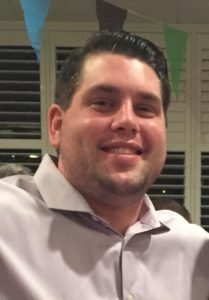
Dustin Weber, Santa Clara University School of Law, Class of 2020
I have long been captivated by the law. My fascination dates back to shortly after my diagnosis. Over 25 years ago, I was diagnosed as a Type-1 diabetic. As I grew older and became intimately acquainted with the inhumanity associated with this country’s health care system, I yearned to learn how to correct the system’s inequities. This brought me into the worlds of politics and law.
A brilliant and thoughtful undergraduate professor further inflamed my passion for the law, especially constitutional law. So, given my lifelong progressive proclivities and ongoing dedication to serving my community, joining Santa Clara’s American Constitution Society Student Chapter as a 1L seemed like a logical step. While I knew a bit about ACS prior to joining, what I did not fully expect was the genuine desire of the organization, at all levels, to encourage, foster, and support the development of students.
I have felt blessed and humbled by the support of ACS. At Santa Clara, with ACS’s support, we have been given the opportunity to advance conversations on a wealth of progressive issues. Without ACS, these opportunities to learn, converse, and network would not have been possible.
Furthermore, beyond the opportunities to bring events to campus, ACS makes it possible for students to get involved outside of campus through community engagement activities, conventions, and networking events. Additionally, it has been encouraging to be a part of an organization that values inclusion. As a first-generation law student whose previous professional life was largely disconnected from the legal community, the opportunities provided by ACS are priceless.
I have thoroughly enjoyed my law school experience. A significant portion of that enjoyment must be credited to both ACS National and our local ACS Bay Area Lawyer Chapter. As I take the next step in my career, I intend to continue supporting and staying involved with ACS. In such politically, economically, and socially challenging times, ACS and the many progressive voices who animate the organization, remains an imperative bulwark against further regression. The constitutional protections that inhere in all of us would be devoid of significance without organizations like ACS, so I am proud to be one of its members.
12/9/2019
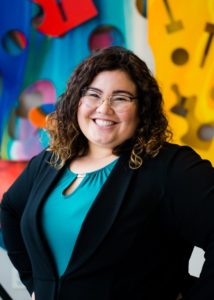
Priscila D. Abraham, Rutgers Law School, Class of 2020
New Jersey is home to the fifth-largest immigrant population in the country. I am proud that my family makes up a portion of that population. As the child of immigrants and a New Jersian, I feel that I have a responsibility to my community to advocate for immigrants’ rights.
Over the last decade, I have worked with a grassroots organization accompanying folks to Immigration and Customs Enforcement (ICE) check-ins, drafting favorable immigrant-related policies as a Legislative Assistant on Capitol Hill and, most recently, submitting briefs to the Board of Immigration Appeals on behalf of immigrant clients. As I round out my final year of law school, I am excited to continue working with immigrant populations.
I am thankful that the American Constitution Society has given me a mechanism to advance my advocacy. As ACS Co-Chair at Rutgers, I organized discussions about the constitutionality of adding a citizenship question to the US Census and utilizing national security funding to build a wall along the US-Mexico border. This year, the Rutgers Law School-Newark Campus ACS Student Chapter stood with DACA recipients on the steps of the Supreme Court and hosted a conversation on the future of the program with our in-house immigration law expert.
Reflecting on my law school experience, I am happy to have attended the People’s Electric Law School and be surrounded by my ACS Co-Chairs and other public interest students with a similar passion for public service. I cannot wait to see what this next year brings!
12/2/2019
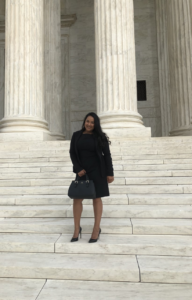
Rabiya Tirmizi, Cal Western, President, ‘20
After September 11, 2001, the climate in the United States changed. As a Pakistani Muslim American woman, this event permanently changed my life. I was seven years old at the time and became ashamed of my identity. As Islamophobia elevated, I continued to struggle with my identity. At fifteen, I began working at a law firm, and it was then that I began to gain confidence and decided to pursue law school to become a lawyer and advocate for others who have been similarly marginalized.
For as long as I can remember, I have had progressive views and believed in equality for all. It was only natural that these beliefs drove me to attend law school to fight for justice through the law. At the time, there was no leading progressive organization at my law school. As a 1L, I became exposed to my local ACS Lawyer Chapter and then to ACS National. This led me to initiate the revival of my ACS Student Chapter at Cal Western. ACS has allowed me to navigate law school while remaining true to my beliefs. Being part of the Cal Western ACS Student Chapter has allowed me to help create safe spaces for important discussions happening in our country today.
11/25/2019
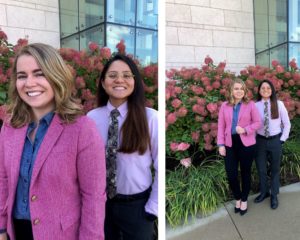
Angela Kehrig, Wayne State University Law School, ’21
Shirley Rivas, Wayne State University Law School, ’21
Shirley Rivas (she/her) and Angela Kehrig (she/her) are both 2Ls at Wayne State University Law School, which is located in Detroit, Michigan. As Co-Presidents for Wayne State’s ACS Student Chapter for the 2019-2020 academic year, Shirley and Angela have been working diligently to create a stronger presence of ACS at Wayne.
Shirley:
As a New York City native, I first came to Michigan in 2013 to pursue my undergraduate degree in psychology at the University of Michigan in Ann Arbor. It was there that I met Amanda Alexander from the Detroit Justice Center (DJC) when she was my professor for a seminar titled “Law, Protest, and Social Movements.” Meeting her was a pivotal moment in my life because it was the first time I ever even considered what it would mean for me to be a lawyer.
A few years after graduating, I revisited the idea of becoming a lawyer and began the long process of applying to law schools. It only seemed right for me to learn and practice law in the state of Michigan because ever since I left, I had found myself coming up with reasons to return. I was thrilled to move back, and I was even more excited to be in Detroit during such a tense time in political history. I wanted to live in a city where my presence could have a positive impact, especially when the city is fighting tirelessly to stay alive and revive itself when many have already abandoned and disregarded it.
Last summer, I interned with DJC and was able to work in their Economic Equity Practice. While there, I explored my passion and interest in transactional law and saw firsthand how lawyers can use transactional legal skills in a social justice context. I plan to continue pursuing my interest in transactional law, and I am eager to see how I will utilize my passions in a way that aligns with my own personal moral compass.
Angela:
I am originally from Southeastern Michigan, but I attended undergrad at Oakland University where I gained valuable leadership experience through Alpha Delta Pi sorority, researched the Religious Freedom Restoration Act, graduated with honors, and earned my degree in Political Science and Philosophy. From there, I took a year off to better prepare for law school and make sure that the struggles associated with being in law school were worth its benefits.
During that year, I worked two jobs as a chiropractic assistant and a legal assistant. Through the chiropractic assistant position, I found a wonderful community of people who taught me how to be a great boss and treat people who worked under me properly. As a legal assistant at a small firm, I also experienced the demands and struggles legal assistants deal with and learned just how difficult it can be for support staff at a law firm. Additionally, as both an undergrad and law student, I have always prioritized community service and volunteered with some fantastic organizations like Cass Community Social Services, Ronald McDonald House Charities, Friends of Foster Kids, and Humble Design.
I am now working in the Wayne Law Admissions office, taking classes, and preparing for my upcoming Summer Associate position. I have been fortunate enough to find a firm where I can explore multiple practice areas and figure out where my talents are best suited. All my past odds and ends jobs have prepared me to approach this upcoming opportunity with confidence, optimism, and humility. I’m excited to keep learning, meeting colleagues, and exploring coffee shops in the Detroit-metro area.
11/18/2019
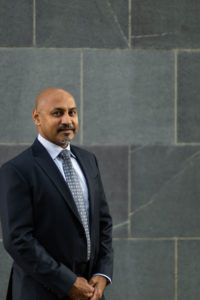
Suman Malempati, M.D., Emory University School of Law, ‘21
My path to law school has been highly unusual to say the least. For me, law school is the start of a second career after I had a previous career as a pediatrician and pediatric oncologist. After several years of being a physician, researcher, and educator, I decided to change careers because of my passion for social justice and my desire to work for change. It might be surprising to people who don’t know me well, but my new career in law may have nothing do with my previous career in medicine.
I had not heard of the American Constitution Society until I started school at Emory Law. At Emory, I quickly discovered that ACS’s mission aligns completely with my values and with the reasons I decided to leave a successful career to go to law school. I have a strong interest in constitutional law, and I believe the law should be a force to protect the rights that the U.S. Constitution guarantees. One of the highlights of my law school experience has been the opportunity to be a co-President of the Emory Law School Chapter of ACS. I’ve enjoyed getting to interact with other progressive-minded law students and to make connections with some amazing lawyers in the ACS community.
So far, the ride has been amazing. I am fortunate to have an extremely patient and supportive family who have somehow allowed me to take this crazy leap! Moving forward, I am highly motivated to use my law degree to work towards a more just world. I’m still determining my exact career path, but I’m interested in a career that combines policy work and civil rights litigation. I know for certain that I will always stay connected to ACS.
11/11/2019
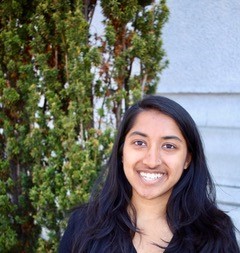
Nitisha Baronia, Stanford Law School, ’21
I always considered myself an institutionalist. As an undergraduate, I helped run the Student Advocate’s Office at UC Berkeley, where I navigated students through a vast bureaucracy as they fought for justice. I worked with sexual violence survivors, victims of harassment, and homeless students. For their sake, I strove to be a careful, deliberate advocate, rarely challenging the system. Those systems, while flawed, I still relied upon to deliver the right adjudicatory and administrative outcomes. Attending law school was the natural next step. I knew I wanted to be a public advocate, helping people leverage our legal institutions for good. I never considered myself a progressive, always hoping to fight for justice within the comfort of well-established systems. But what happens when those very institutions collapse?
That question gnawed at me throughout my first year in law school. In 2018, law school became an academic exercise somewhat removed from the real world: I was learning to operate in legal institutions that were under attack, by unforeseen levels of bitter partisanship and a transformation in the global media landscape. ACS offered a space to bridge these two worlds. Through the organization, I hope that law students can begin to apply foundational legal principles to a new era of partisanship and technology that threatens to erode institutions and exclude those who need them most. This year, our chapter has grown and exponentially increased programming from previous years. My Co-President and I hope to continue to build a community of scholars at Stanford who believe—no matter where they fall on the political or ideological spectrum—that the Constitution should work for all of us.
11/4/2019
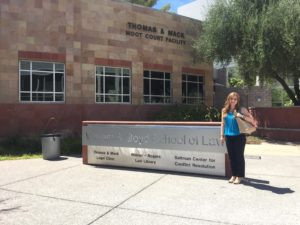
Kristina Beske, UNLV William S. Boyd School of Law, ’21
At the age of 4, I saw Legally Blonde for the first time. Through watching the main character, Elle Woods, navigate her first year of law school, I immediately knew what I wanted to be when I grew up. I wanted to be feminine and powerful, and to give a voice to the underdog . . . or maybe I just wanted all my things to be pink. Either way, I somehow ended up accomplishing my goal and making it to law school; what, like it’s hard?
Now, two years in, I still cannot believe my childhood dream has become my reality. My family has supported me every step of the way, and when I say “it takes a village,” I mean it. The love and support I receive from my family, friends, and boyfriend keep me going each and every day. Law school is a daunting task, but my village is always cheering me on.
I hope to be a criminal attorney and one day, a judge. Working as both a prosecutor and a defense attorney are on my list of goals. I hope to bring perspective from both sides to the bench one day. I am currently externing with a District Court Judge. I hope to be an extern at the Clark County Public Defender’s Office in the Spring. I will be spending my second summer with the City of Henderson Criminal Division in the City Attorney’s Office.
Being the President of the ACS Boyd Law School Chapter in Las Vegas is exciting and inspiring. My progressive values and this wonderful organization allow my board and I to host important panels and debates about things important to us as a chapter. I am grateful for the opportunity to serve, and I appreciate all the help we receive in making our events possible.
10/28/2019
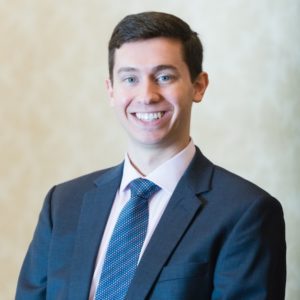
Kevin Witenoff, Vanderbilt Law School, ‘21
My introduction to and involvement with the American Constitution Society is proof of the network’s success. After graduating from college with a degree in social policy, I expressed to one of my cousins that I was having trouble finding a job; I was hoping that she would let me shadow her to gain experience. Instead, she connected me with one of her law school classmates who would know how to help me. My cousin’s law school classmate worked for ACS national and suggested I apply to one of the open fellowship positions with the organization. After rounds of interviews, I found myself a part of the ACS team.
My time working in the national office exposed me to ideas, practitioners, and academics that I could never have anticipated while struggling through my job search. When I began applying to law schools, ACS connected me with students at each of the law schools in which I expressed interest. These introductions provided me with a much better understanding of each school’s culture and, ultimately, made the challenging decision of where to go to law school much easier.
Once I arrived on Vanderbilt’s campus, I was immediately connected with the ACS chapter President who gave me great advice and made me feel comfortable with my new home. The ACS network continues to provide me with resources to make the most out of every step in my journey as a young lawyer.
I have experienced firsthand the power of this organization’s network and have also witnessed how it has helped other ACS members across the country. As Vanderbilt’s ACS Chapter President, I have made a concerted effort to not just bring engaging programming to campus, but to also connect the Vanderbilt Chapter members with ACS national and other chapters in cities where they seek employment. Interacting with interesting people and connecting them with my chapter is the greatest joy of being an ACS chapter leader. ACS is about bringing people together for individual and common advancement. And, as is evident through my ACS journey, we can accomplish so much more together than we can on our own.
10/21/2019
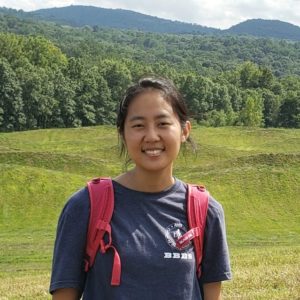
Jenny Choi, Yale Law School, ‘21
Before law school, I worked as a Voting Rights Associate at the Asian American Legal Defense and Education Fund, which ran one of the nation’s largest voter protection programs during the 2016 election. By nurturing long-term relationships with election officials and community organizations nationwide, our team conducted both preemptive advocacy and on-the-ground election monitoring to report illegal behavior by election boards and poll workers. This work taught me how dangerous subtle voter disenfranchisement can be. Operating under the assumption that Asians could not also be American, poll workers targeted Asian Americans with illegal requests for proof of citizenship and turned away voters who could not produce their birth certificates. At a more structural level, this limited and outdated image of American citizenship continued to swing resource allocation choices against immigrant voters of limited English, forcing them to return home without voting because the election board had failed to provide in-language help as legally required.
I joined ACS because I believe that our Constitution is elastic in its embrace and, in turn, derives its meaning and significance from those that it expands to embrace. Even though the Constitution is the work of an exclusive group of landed white men, many groups have argued for their enfranchisement—in its thickest sense, both at and beyond the ballot box—precisely by making claims under the Constitution (as our faculty sponsor, Prof. Reva Siegel, has argued!). Today, we rightly continue to struggle with the infinite project of inclusion. When I arrived at law school, I wanted to join a community of students, professors, and practitioners who were actively invested in this project, and I was grateful to find ACS.
The work stretches far and long ahead. Despite my choice to invest in the law as a way of affecting change, I know from past experiences that the law is only as powerful as our shared narratives allow it to be. As a naturalized American citizen, the way that I wish to live out my citizenship is as a translator of experiences, infusing my own immigrant perspective and others collected from within communities on the ground into the more technical languages of litigation and legislative advocacy. To that end, I believe that ACS students should aspire not only to help maintain the rule of law (especially in these harrowing times!), but constantly challenge and push the law by thinking critically about who it serves.
10/14/2019
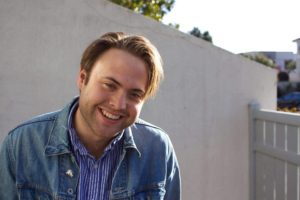
Michael Mermelstein, Chapman University Dale E. Fowler School of Law, ‘21
My family’s acts of moral dignity and compassion motivate me every day. When my great-grandmother arrived at Auschwitz as a new prisoner, she left her processing line to comfort a group of unattended, crying children that, unbeknownst to anyone, were designated to be gassed. My grandfather, also a Holocaust survivor, has dedicated the rest of his life to combatting Holocaust deniers and white supremacy. In 1981, he and a lawyer named William Cox successfully sued a Holocaust-denying Nazi group, the Institute for Historical Review, and got the Superior Court of Los Angeles County to take judicial notice of the Holocaust’s existence as a matter legal fact.
That was my family’s first exposure to the legal system. When I was in high school, my mother, Edie Mermelstein, began taking night classes to become an attorney. At first, I was resistant to making the law my profession, too, and I set off for a career in politics. At least, that was my plan until my bachelor party in 2017, when my friends and I awoke on Saturday morning to news of the now infamous Unite the Right rally in Charlottesville, Virginia. I knew right then, in that moment, that I needed to apply to law school.
Today, I am in my second year of law school at the Chapman University School of Law, where I serve as President of both our Jewish Law Student Association and ACS Chapter. I have been an outspoken advocate against white supremacy and I have loved working with ACS to build a community with other likeminded students and faculty.
10/7/2019
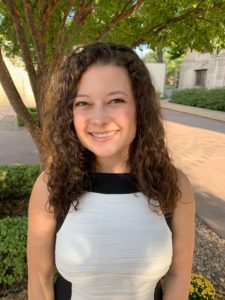
Morgan Higgins, University of Oklahoma College of Law, ‘21
I was born and raised in the South, and for as long as I can remember, I have had a progressive belief system, which, as you can guess, has been challenging at times. I hadn’t thought about law school until I graduated college in 2018. The political climate during that time was infuriating to watch, especially in the South where it was largely being embraced instead of rejected, so I decided to do something about it.
I came to law school because I wanted to challenge the oppressive political climate produced by our current administration. Whether it be banning Muslims, removing access to safe abortions, or blocking transgender troops from serving our country, I knew that what I was seeing was wrong, but I now know that much of it is illegal and unconstitutional too. I am dedicated to being a part of the fight to legally correct these wrongdoings. I believe in defending the rights of all people, especially those who the law has disenfranchised.
When I began law school, there were no political organizations that aligned with my beliefs, so I reestablished the American Constitution Society at the University of Oklahoma College of Law. Being a progressive in the South can be extremely challenging at times, however, I quickly found a group of like-minded peopled that just needed an outlet to express their views. I wanted to create an organization where students could freely discuss and critique the current administration, the laws of our state, and actions of our college campus. Our chapter has grown quickly over the last year, and we have received tremendous support, giving me hope about the progress of our state and region.
I credit much of my personal success during law school to ACS. The resources and support that I have received from ACS National and my local chapter have been paramount to my law school experience, and I know that will continue as I begin my career as a progressive lawyer.
9/30/2019
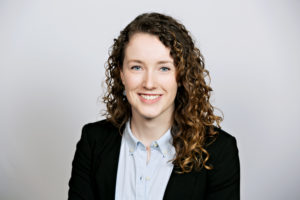
Grace O’ Meara, University of Minnesota Law School, ‘20
One night, in the fall of 2012, I vowed to never go to law school. As an English major, this vow probably worried my parents, but after spending a night bartending for the most pretentious, overconfident men at a “Barrister’s Ball,” I had become furious. These law students mocked and solicited my coworkers while partying the night away. Several swaggered up to my bar and said, “Did you know I’m a lawyer?” as if that announcement would immediately elevate their status and wipe away their rudeness. If this is what it means to be a law student, I thought, then I want no part of it.
Obviously, I have broken my vow to never become a lawyer. However, I have tried to maintain my vow to not become that kind of law student. After working as a healthcare software project manager, in foodservice, and as an operations director for a progressive political group, I realized my next step should be law school. I applied because I saw gaps between where our society was and where I wanted it to be, and it seemed like many of the people on the front lines of narrowing those gaps had law degrees. In law school, I hoped to maintain my interest in progressive issues and meet other students who had similar goals.
ACS has helped me in that goal by creating a group where I can meet passionate lawyers and future lawyers who share an interest in making the law work for all, not merely a few. It has been a privilege to collaborate and learn from the smart and ambitious board members in my chapter. As our chapter’s Treasurer and now President, I have worked with our board to create events that push the often seemingly apolitical student body at the University of Minnesota to critically evaluate how we as attorneys use and interpret the law. We have hosted events at our law school with the Minnesota Attorney General, the Minnesota Secretary of State, and many other local and national experts. In an effort to spark conversation, we also hosted two “breaking news” panels last year in which professors discussed current legal issues in the news: the President’s emergency powers and the Mueller report.
ACS has provided a place where I can meet fellow progressive students, discuss issues that are important to us, and prompt conversation in the greater student body. With ACS’s support, I’ve had the opportunity to become a law student focused on progressive change and improving justice for all, rather than just another jerk at a Barrister’s Ball.
9/23/2019
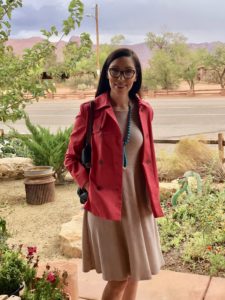
Adriana Orman, 3L, Mitchell Hamline School of Law ’20, St. Paul, MN
Tuba City, Arizona is nestled in the heart of the Navajo Nation in the remote part of Northern Arizona. I have the great honor of being able to call this corner of the world my home, but I have not always felt this way. Shortly after graduating high school to attend Arizona State University, I made a silent vow to never return. During my eight years away, I had the great fortune to travel the world and even live abroad teaching English for a year. I don’t know exactly why, but at the end of my stint abroad, I knew it was time to go home, and I was ready.
In 2014, I returned to the reservation to teach second grade at my elementary school, alongside some of my own former teachers. For the next three years, I watched as my students—some traveling over an hour each way on a school bus down a dirt road from a home without running water or electricity—face the day ahead with a smile, their curiosity and soft-heartedness never waning. My students taught me a powerful lesson about resilience and love for my community during my time back home: because of my community, I am who I am today. But it was also during this time that I became acutely aware of the severe inequities and culturally incongruent policies that stifle tribal progress and healing. It was through this realization that I decided to attend law school.
I am now a 3L at the Mitchell Hamline School of Law in St. Paul, Minnesota, where I am on the Federal Indian Law track. Throughout law school, I have dedicated myself to studying the intersection of education and federal and tribal policy, with the hopes of returning to Northern Arizona to serve as both an advocate for education and tribal self-determination. My student note, which was published in the Mitchell Hamline Law Journal of Public Policy and Practice, is entitled “The Causal Effect: Implications of Chronic Underfunding in School Systems on the Navajo Reservation,” and examines the indigenous educational experience through a historical lens. I spent last summer working with Mid-Minnesota Legal Aid with their Youth Law Project, and this past summer with the Center for Law and Education in Washington, D.C. Both experiences have reinforced my desire to continue working towards education justice on the Navajo Nation.
Joining ACS has been an illuminating experience: I am profoundly grateful for the opportunity to join forces with fellow civic-minded individuals to foster dialogue about progressive issues and to combat the effects of the existential attacks from the current administration. I have come to understand that even the smallest of changes in circumstance can have a palpable impact on one’s quality of life, and ACS is a platform that can help facilitate those changes.
9/16/2019
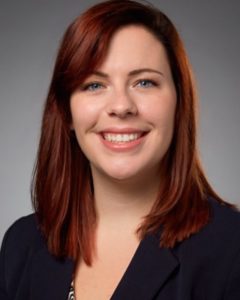
Melissa Araiza, University of Nebraska School of Law, Class of 2021
If you asked me just a few years ago what I wanted to do with my life, being a lawyer and going to law school were nowhere on my list. After graduating with a Bachelor’s in Political Science, my family told me I should go to law school. I insisted that I was done learning, that law school was not for me, and I entered the full-time workforce while living in San Diego. It took me quite a while to find a steady job, and I ended up in a law firm as a receptionist. But once there, I pushed to move into any opportunities that came along. I was promoted to a records clerk, managed a records department, and then became a legal secretary. One day, one of the attorneys that I worked for sat me down in her office to tell me her plan for my future. I was going to stay at the firm, continue to work my way up the ladder, and someday lead her support team.
That day was the day I realized that I had made a terrible mistake – I was NOT done learning. It turned out that I enjoyed the legal field, but I felt like I was destined for a different role at the firm. I signed up for the LSAT, quit my job, and planned to move home.
On the day that my husband and I were moving out of our apartment to leave for Nebraska, I found out I was pregnant. We were thrilled, but terrified – we had just quit both our jobs! In Nebraska, I went back to work and weighed all my options at length, in case this was a sign that law school really wasn’t in the cards for me. I liked my new job, and I liked the attorneys I worked for.
Then, the 2017 travel bans took place. Lawyers all around the country showed up at airports to file habeas corpus petitions while I sat at home, infuriated. It was the worst feeling, knowing that I didn’t have the right skills and couldn’t help. That was my final straw – even if law school was the most difficult thing I would ever do, I couldn’t put it off anymore. I wanted to go, and I wanted to arm myself with the tools I needed to fight injustice, because that is what sparked passion in me.
In my first year, I made friends and joined a few groups, most importantly the American Constitution Society. This organization has become a centerpiece to my legal education, giving me opportunities and connections with like-minded progressives in a largely red state. As the new Chapter President for the 2019-2020 school year, I look forward to sharing our message with incoming students and to bring new opportunities to my campus. It keeps me on my toes and challenges me to do more, and it makes me learn something new every day.
9/9/2019
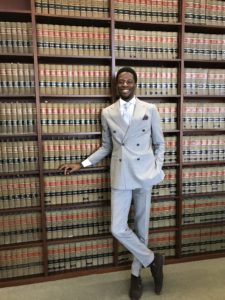
David Adeleye, IU Maurer, 2021
It feels good to finally be here. When I say here, I mean law school. I was supposed to begin law school in 2014, but I took an interesting detour. With both my tuition and security deposit for my apartment submitted, I had a choice: go work for President Obama at the White House or start law school. Tough choice, right? Well, I decided on the former.
In 2014, I went from watching the news and the State of the Union in my dorm room to working on the issues that dominated the daily news cycle. I worked at the White House when the opioid epidemic first hit communities around the United States. I was also at the Department of Homeland Security during the Syrian refugee crisis, United States v. Texas, and the ongoing discussions of DACA. I was exposed to so many experiences at an early stage of my career that reaffirmed why I wanted to come to law school. I feel a sense of duty to learn the laws of the land so I can identify deficiencies and help make our nation more just and equitable for all.
What is transpiring at the moment is not normal. We have hyper-partisanship that is hindering meaningful reform, inflammatory rhetoric hurled toward those who seek refuge and opportunity in America, and blatant defiance of the rule of law by incumbent officials. But, despite all the turmoil, there is hope. President Obama instructed his White House staff to use all the tools we had to fight cynicism, unlock the possible, and make life better for the American people and individuals around the world. His resolve inspired us to work with a sense of honor and duty, knowing that people were counting on us and would be impacted by the outcomes of our work. This guidance also forced me to look beyond myself and the politics of the time to make sure I was fulfilling my duty as a public servant.
It is my objective to continue the work I started as a young White House staffer. As progressives, we are not always going to agree on issues, but I know that with our collective zeal, we can keep propelling this country forward.
9/3/2019
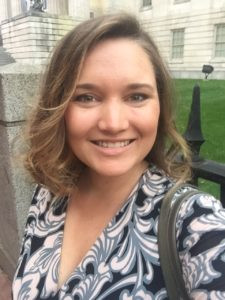
Allison Lantero, University of Notre Dame Law School, 2021
I decided to go to law school out of a desire to better understand our democracy, to give a voice to the voiceless, and to eventually become a judge, like my maternal grandfather. As a well-respected judge of the 18th Judicial Circuit Court in DuPage County, Illinois, my grandfather had a reputation for consensus-building and fair-minded judgement. He taught me to always examine all sides of an issue before making a decision. His hero was Thurgood Marshall, and my grandfather is mine.
After spending seven years working for the federal government in Washington, D.C., I was ready to follow my grandfather’s footsteps and attend law school. At Notre Dame, I found a rigorous academic culture filled with students whose opinions and beliefs span the political spectrum. In other words, I found a place where I could learn to examine all sides of an issue.
But, in the American Constitution Society, I found, as they say, my people—a group of like-minded law students committed to promoting more progressive messages on our relatively conservative campus. I found students standing up for what they believe in, whether it be immigration, gun control, or simply opposing the rhetoric coming out of the White House.
My dreams of becoming a judge are still a way off, but as the current President of the University of Notre Dame Law School’s ACS Chapter, I’m excited and grateful for the platform to give a voice to the voiceless and better understand our democracy.
8/26/2019
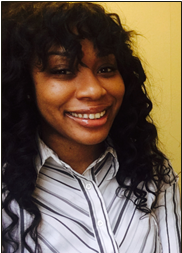
Danielle Michaels, UIC John Marshall Law School, ’20
I started my journey to becoming a lawyer with plenty of interest but little knowledge of how to actually “get there.” As the first J.D. candidate in my family, I had to learn everything I know from those I have encountered along the way. On this path, I’ve had the pleasure of meeting people who have helped me become a member of The John Marshall Law School’s Class of 2020, and I consider those people a part of my team. To me, having a team equates to increased success. As a chapter leader, the American Constitution Society (ACS) is now a part of my team.
I have always been interested in the foundation of law. ACS has equipped me with an increased knowledge of that foundation, the U.S. Constitution. I appreciate that ACS prioritizes all Constitutional issues; likewise, I, as a law student and future lawyer, strive to help as many people as I can by becoming proficient in more than one practice area. As I pursue a career in Employment Law and Criminal Law, I plan to advocate for ACS’s vision—that the Constitution works for all. By collaborating with my community to pursue these interests, I have already started making my mark in my roles as the Vice President and now President of John Marshall’s ACS Chapter.
I am grateful for the support and resources ACS has provided and continues to provide me while in law school, and I look forward to continuing my relationship with ACS as I begin my legal career as a practicing attorney.
8/19/2019
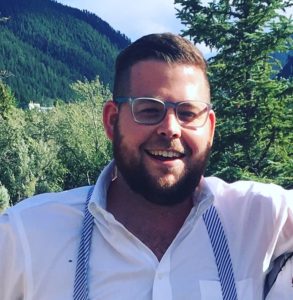
Andrew Shulman, University of Denver Sturm College of Law, May 2020
It is one of the great tragedies of law school that we focus on the titans, not the teams. We learn about John Marshall, Thurgood Marshall, Brandeis, Warren, Fred Korematsu, the Lovings, and the warriors who populate the history of American jurisprudence and justice.
What we aren’t taught is that Brown v. Board was decided 9-0 because Justice Warren knew unanimous consensus was the only real victory. We aren’t taught that Lyndon B. Johnson had to recruit southern politicians, vehement racists, to pass the Civil Right Act of 1964 and the Voting Rights Act of 1965. We aren’t taught that justice, whether you are an advocate, an organizer, or a lawyer, takes a community.
If I am grateful for anything in law school, it’s the lesson that justice is a team effort. During my time in law school, I’ve had the chance to do a lot of great things. I spearheaded an inaugural Civil Rights Summit in Colorado that brought together over two-hundred members of the justice community. I co-founded a $100,000 impact fund committed to making socially beneficial investments. I created an “electoral reform blueprint” that will have national distribution and assist law students in effecting election reform in their communities.
But the Civil Rights Summit only came together because of a team of six law students, the support of dozen different student groups and non-profits, and over forty professionals who took the time to participate as speakers. The impact fund was the result of the tireless work of a small group of law students, committed faculty members from a number of graduate colleges, and special advisors scattered across Denver. The “electoral reform blueprint” came about because of the work of law students, professionals, and professors committed to creating significant electoral reform, and the unrelenting support of ACS. These projects have been some of the greatest joys of my law school career, and they were made possible by a team. Hell, even the very experience of law school itself is a team effort – I don’t know anyone who has had a happy and successful experience that didn’t go at it arm-in-arm with others.
While law school can be a process of narrowing and sharpening particular skills, it’s also a place where we can learn to see the whole board and come to understand that there is no army-of-one when it comes to progress. We have to be an army of attorneys, of advocates, of organizers, of intellectuals, and of leaders. ACS has afforded me the chance to expand, rather than contract, and to build skills I never thought I would have the chance to build in law school. I will leave law school as a builder and a warrior, and someone committed to legal reform using tools that go far beyond the courtroom. ACS has helped make training to be a “holistic” lawyer a reality.
Thank you to ACS, my family, and everyone else in my law school universe for making progress possible.
8/12/2019
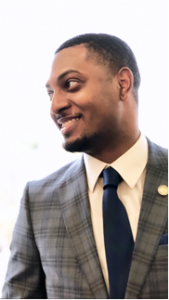
Ian Lamar Courts, North Carolina Central University School of Law, May 2020
“Each day holds us accountable. We cannot escape the day. And if the day had to witness how we spent it, what would it testify?” Mary E. Jackson’s preceding quote is one that I live by and one that encourages me in my life-journey. I am a first-generation law student who was raised by my grandmother (who was the first in her family to graduate from college) in a small North Carolina town named Reidsville. My desire to go to law school was formed as a young, African American boy being aware of the social injustices that affected my community and knowing that something needed to be done to solve the problems! I was surrounded by problem solvers such as my grandmother, my pastor, and the numerous family and church members that lived in my small community. I knew I wanted to be a part of positive change, and I declared my intentions at my 4th grade elementary school career day, where I stood up in my high school guidance counselor’s graduation robe and declared, “I want to be a judge like Mr. Thurgood Marshall!” From that day, I was committed to the dream and goal of becoming a lawyer to impact positive social change.
I became involved in my local church and in numerous school organizations such as the National Beta Club. I graduated from the Rockingham Early College High School in the school’s second graduating class where, at the age of 18, I earned both my associate degree and my high school diploma. From there, I enrolled in the University of North Carolina at Greensboro (UNCG) where I was a member of the Legal Professions Association, Neo-Black Society, Phi Beta Sigma, and the Student Conduct team. Upon graduating from UNCG in 2017, I made an important decision to attend the North Carolina Central University School of Law where I entered through the Performance Based Admission Program. NCCU School of Law, as a HBCU law school, has ignited my passion for social justice and created avenues for networking with other progressive minded individuals and organizations such as the American Constitution Society. Like James Brown penned, “I’m Black & I’m Proud!” I add: “I am a proud and loud member of ACS!”
2018-2019
5/13 Students of ACS
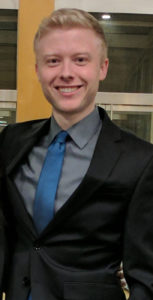
Brady Williams, University of California, Berkeley, School of Law, ‘19
I came to law school knowing that I wanted to use my law degree as a tool to protect the public interest. There are many ways to do that, but the avenue that has always stood out to me most is consumer protection law. During my law school summers, I worked with government agencies at both the state and federal level to help enforce various consumer protection laws. Through these experiences, I learned first-hand the important role government plays in protecting consumers by ensuring that markets are not only free, but fair.
While in law school, ACS provided unparalleled opportunities to meet like-minded students and attorneys who shared my goals and vision for pursuing the common good. Through my leadership role in Berkeley’s ACS Chapter, I’ve worked with our team to bring a steady flow of progressive programming to the law school. By tapping into the ACS nationwide network, our chapter has hosted dozens of events featuring some of the leading progressive advocates in the country on topics ranging from consumer protection to voting rights, gun safety, and more.
I will always be grateful to ACS for the support and resources it has provided me while in law school, and I look forward to continuing my relationship with ACS as I enter the next stage of my legal career as a practicing attorney.
5/6 Students of ACS
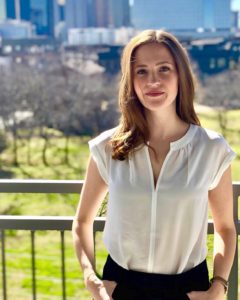
Claire Cahoon, SMU Dedman School of Law, ‘20
I’ve wanted to be a lawyer for almost as long as I can remember, barring my most stubborn elementary school years when all I wanted was to be a Dixie Chick. But like every law student before me, 1L shook out all my idealism until I forgot why I wanted to be a lawyer in the first place.
What ultimately grounded me was a series of nerd-outs. Joining SMU’s Science and Technology Law Review, and later becoming Editor-in-Chief, led me to my love of data privacy and cybersecurity. Working at the Meadows Mental Health Policy Institute reminded me of the importance of being a voice for the voiceless. And currently, working as the Policy Director for the Miguel Solis campaign for the Mayor of Dallas has shown me how powerful a J.D. can be in shaping policy to move closer to genuine equality in our communities, country, and world.
But perhaps what grounds me most is being President of SMU ACS. When I can’t remember why I’m reading contract law at 9 PM on a Friday, Monday brings an inspiring ACS event. When the news makes me want to throw my TV out the window, our executive board’s group text is ready with memes and solidarity. And the ACS Student Convention last February reminded me that while anyone can advocate and make a difference, advocating as an attorney bears a special responsibility and importance.
Activism is critically important and I seriously love doing it. In the last two years, I served on the Women’s March Youth Advisory Council, spoke at gun control rallies and marches alongside the students from Parkland, and became an Obama Foundation Peer Advisor. But at the end of the day, I’m a wonk. What tethers me emotionally, and what led me to go to law school in the first place, is a deep hunger to learn as much as possible and use that knowledge to change the world.
I want to thank ACS for the friends and professional relationships it’s given me and for the opportunity to grow as both a future lawyer and human being. But most importantly, thanks for reminding the second grader in me that as disappointing as it is that I’ll never be a Dixie Chick, being a lawyer is going to seriously rock.
4/29 Students of ACS
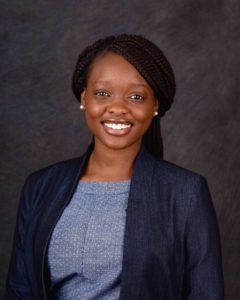
Berlinie St-Fort, Florida A&M University College of Law, ‘20
As the first U.S. born of my Haitian roots, there was never any question in my family environment as to what my obligation was. The goal was unequivocally set for me as early as I started to understand right and wrong. Academic success was always the tune, and I was afforded no break from listening to it beginning in my early childhood. The choice was never mine. In fact, Haitian parents culturally measure academic success starting with a diploma in one of a small set of majors they historically see as a path to a successful professional life. A law degree, being one element of that set, was always number one in my mind. I knew from a very young age that I wanted to become an attorney. To me, the goal is two-fold: becoming a successful attorney and supporting those in need here and abroad. The current political climate increased my interest in pursuit of this degree that weighs so heavily to help protect fundamental rights.
I consider myself a goal oriented, passionate individual who can sometimes be too passionate about issues that affect me, and people like me. Therefore, from the day I set foot on the Florida A&M University College of Law campus, I wanted to know how I could leave my mark and what I needed to do to be involved. Fortunately, one of my mentors introduced me to ACS. Given that I never heard of ACS before, I was very curious to know the organization’s vision and mission. Right after attending the Gavel Gap panel discussion that my school hosted, I couldn’t wait to join the organization. In a very short time, my interest in ACS led me to become the president of my law school’s chapter. Given my professional career plans, joining ACS is one of the best decisions I made. Being president of my ACS chapter has really pushed me out of my comfort zone because I’ve had to reach out to lawyers and judges that I’ve never imagined reaching out to. The time when I was somewhat introverted is now history and I feel that my leadership role in ACS has developed my confidence and set me on the path to be the leader that I have dreamed of becoming.
4/22 Students of ACS
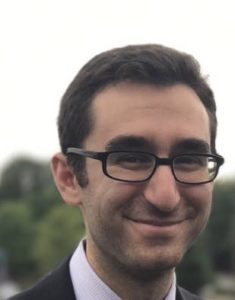
James Mayer, New York University School of Law, ’19
Prior to law school, I served as head of communications for the Smithsonian Center for Folklife and Cultural Heritage, where I worked with marginalized groups to amplify their voices in order to support cultural sustainability. I collaborated with curators, community leaders, and tradition-bearers to share stories with the public. Practicing community-based advocacy at the Smithsonian inspired me to go to law school to better understand how law and policy impacts cultural heritage.
During my time at law school, I have explored how racial, political, and economic discrimination often operate together, compounded by cultural inequalities that further marginalize communities. People in law school have approached these issues from academic and theoretical perspectives, but often do not investigate how these issues really impact communities. Through my involvement with ACS, I have found a network of students, practitioners, professors, and policymakers who think about justice like I do: as both an intellectual issue and a practical imperative.
ACS has inspired me by helping me develop a progressive vision of how the law can serve marginalized communities. Learning from my fellow ACS members has reinforced the importance of a progressive understanding of the Constitution for creating a truly equitable rule of law. I’m honored to contribute to the work that the NYU ACS Student Chapter does to further this vision of the law.
4/15 Students of ACS
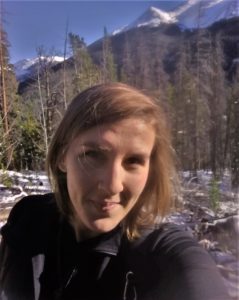
Bess Boever, University of Minnesota Law School, ’19
I have wanted to become a lawyer my entire life, starting in earnest when I was ten years old. It was the year 2000, which marked the first major election cycle I was able to follow and comprehend. The Bush administration immediately became a defining factor of my adolescent existence in my conservative rural Minnesotan town, spurring on my interest in equal justice and civil rights. My propensity to argue combined with hardline convictions made me a natural target for the overtly bigoted bandwagon at school. Perhaps my classmates thought bullying and name-calling would keep me quiet—if so, their plan backfired. I became an activist, fought the school administration on civil rights issues (and won), and daydreamed about storming around the White House like they did in “The West Wing.”
I knew it was possible to become a lawyer specifically to help people and fight for a cause, but it was overwhelming to think about what steps I would have to take toward accomplishing that goal. As a result, I put off the LSAT and went into the service industry after college. My three years as a baker in restaurant kitchens taught me many unexpected lessons. One amusing example was the indispensable workplace lingo we used, combining Spanish, Arabic, and English. But over time, as I worked alongside my new friends from around the world, I also learned how easily people were able to take advantage of and manipulate them as non-citizens. It settled the unrest in my mind over law school—it was time to study immigration law.
I left kitchens behind to start law school, where I discovered ACS my 1L year. I met our local lawyers’ chapter, took on a leadership role, and attended conventions—and my confidence skyrocketed. I discovered that networking doesn’t have to be scary and amorphous because ACS made it easy—all I had to do was chat with people I admired and bond over our shared passion for progressivism in the law. My incredible support network within ACS has given me endless encouragement, letters of recommendation, and advice—not to mention how ACS helped open the door to that career in public interest law that I found so unattainable as a kid. I will be working Mid-Minnesota Legal Aid’s Immigration Law Project next year: a literal dream come true.
4/8 Students of ACS
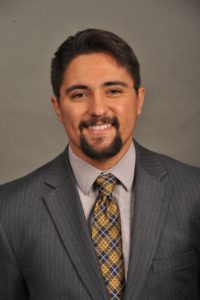
Peter Gonzales, Notre Dame Law School, ’19
“Be the very best you can be.” My father told me that phrase each morning as he dropped me off at military school, where I’d earned a scholarship and was one of a few minority students. We both worked hard so our family could earn the opportunity to benefit from our first college degree. It may have been 6:00 in the morning, but that’s what Midwestern Americans do – we work hard. He worked as hard as he could until he could do no more, so I promised I would too.
These experiences taught me that privileges don’t come easy and that we can’t take opportunities for granted – we must fight to preserve them for all people in this amazing country to achieve the American dream. At Notre Dame Law School, ACS fights for policies that protect the right to pursue and actualize that American dream.
We take the responsibility to fight for all people very seriously. We are honored to be the privileged beneficiaries of a legal education, and we plan to advocate for progressive policies that benefit each and every member of our society.
ACS provides us the incredible opportunity to do just that by advocating for progressive views of the Constitution. Instead of treating constitutional interpretation as a mere theoretical issue, we realize each judicial decision, congressional action, or presidential act has real consequences for real people. We demand serious discussion so we can advocate for the best liberal policies.
ACS is an incredible network of like-minded legal professionals that share this passion. Particularly, our Notre Dame Law School ACS team of Norris Bishton, Dean Nell Newton, Professor Jay Tidmarsh, Allison Lantero, Paula Ortiz Cardona, Bill Green, Heather Pearson, Kim Vo, Robert Hart, Elias Ayoub, Sohail Khan, and Andrew Henderson inspire me every day. I could not be more grateful to be part of ACS as I work hard to make our nation, Constitution, and each American’s life “the very best it can be.”
4/1 Students of ACS
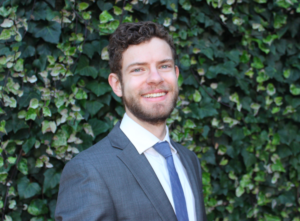
Bryan Thomson, Stanford Law School, ’21
Before coming to law school, I worked as a paralegal at an immigration nonprofit in New Mexico, where I assisted Dreamers, asylum seekers, and visa applicants in obtaining deferred action and legal status. There, the power of the law was on full display. Those whose claims fit into narrow categories were given opportunities to excel, while many others were excluded engagement with our economy and society due to technicalities. Clients deserved relief and found none. The arbitrary and callous nature of our immigration court system stood in stark contrast to the tenets of American justice and equality of opportunity I have grown to revere.
By the time I entered my first law classes in 2017, this discord made me determined to pursue a career advocating for the interests of those whom our system has excluded and neglected. And while the present political moment has only exacerbated my concerns, it also provides many avenues for action for those committed to advancing fairness through our legal system. In law school, I have been fortunate to help South Bay community members apply for disability benefits, and to take part in class action litigation against employers across the Mountain West who systematically underpaid their workers. Through this work, I have come to believe that progressive advocacy and value-driven litigation present solutions to our current inequities. Only by returning to our foundational ideals can we effectively remedy our shortcomings.
Our robust ACS Chapter at Stanford Law School provides the platform and speakers essential to sparking engagement with the ideas that so many of my classmates and I will pursue in our careers. I take pride in the work ACS engages in to help communities access justice, to open our court system, and to advance the progressive principles of our Constitution. Britany, our Co-President, and the other ACS Student Leaders inspire me to keep learning about and advocating for our shared values. I’m honored to be part of a community that prioritizes open, frequent, and critical conversations about our country’s future.
3/25 Students of ACS
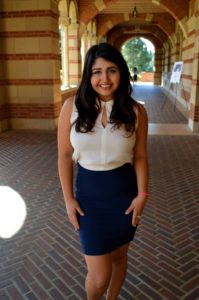
Ava Gerami, University of Virginia School of Law, ’20
I had my first experience with the power of advocacy when I was five-years-old. I had recently immigrated to the United States and did not speak English. On my first day of kindergarten, I did not receive any water. I did not know how to ask for water. When my mother found out that I had been brushed aside by the administration, she went straight to the Principal’s office. With her broken English, she made sure that this would not happen again. From then on, I took accelerated English classes to catch up to my peers. My mother also bought me a pocket translator so I would never go thirsty again. It was then that I learned how powerful a voice can be in transforming our destinies.
At the University of Virginia School of Law, I found the tools I needed to amplify not only my voice, but also that of my community. Attending ACS events exposed me to lawyers utilizing their voice to make progressive change and engaging the bottom-up defense of our liberal values. Being the President of our chapter this last year has been a privilege and a humbling experience. Throughout my tenure, I learned that political advocacy requires the motivation to create change, and that the truest motive is the lack of any other option. In the last few years, our democracy has been backed into a corner, and by using our network of progressive voices, we can push back—united, indivisible, fighting for the justice and liberty of all.
3/18 Students of ACS
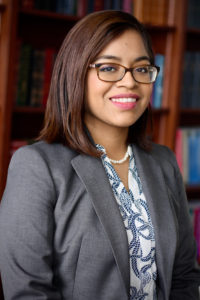
Stephanie Bello-Gálvez, University of Dayton School of Law, ’19
I am a first–generation American, born to Mexican immigrants in Passaic, New Jersey, a town comprised of immigrants about 15 miles from New York City. I grew up seeing and understanding the deep and personal ways that law regulates and affects communities like mine; from educational hurdles, to labor law violations, and immigration regulations, law shapes and defines our lives in complex ways.
I became active in my community as a teenager, first as a student leader and then through local organizations. In my early college days, I was on the founding board for a new youth organization called the Mexican American Progress Movement (MAPM), which focused on cultural, educational, and political empowerment among youth in our community. In late 2011, we became involved with the “New Jersey Tuition Equity for Dreamers” (NJTED) campaign, a push for state legislation which would allow undocumented students who met residency requirements to qualify for in-state tuition (instead of paying double or triple the cost of tuition).
In 2012, I was selected as an intern for the New Jersey United Students (NJUS) organization, then the statewide association of progressive college student groups, primarily to focus on the NJTED campaign. I made phone calls, met with legislators, ran community meetings across the state, created press releases, and was part of the organizing team of one of the biggest student lobby events. On a hot August day, more than 70 college students arrived at the New Jersey Statehouse to meet with legislators and ask that they consider passing the bill. Our efforts were successful—In 2013, then-Governor Chris Christie, a newly re-elected Republican governor who previously opposed the bill, signed the New Jersey Dream Act into law.
Shortly after graduating, I began working for the Migrant Center at a Catholic church in New York City, where I provided paralegal, administrative, and advocacy services for hundreds of vulnerable immigrants. My experience at the Migrant Center and other advocacy efforts motivated me to return to school and become a lawyer. Knowing that progressive professionals and organizations like ACS exist further encourages the work that I do because they support this notion that not only are we morally bound to defend the vulnerable, but that we also have a duty to ensure that the law is a force to improve their lives.
3/11 Students of ACS
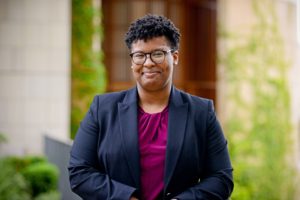
Britany Riley, Stanford Law School, ’19
Prior to law school, I was a judicial assistant at the United States Supreme Court. The position gave me the opportunity to witness some of the brightest legal minds and oral advocates in the country, and I was deeply transformed by the experience. It confirmed my view that studying and practicing law was the best way I could use my talents, passion, and experiences for the public good. But my years at the Court also highlighted the importance of a progressive view of the Constitution and a concrete understanding of the practical realities of the law’s effects on disenfranchised communities.
Throughout law school, I have made it a priority to ensure that my legal education is both academically rigorous and practical. I’m a woman of color who is a first-generation college graduate, and legal education matters to me because I care about issues of racial justice and equity. But in law school, I’ve found that so many people treat these concepts as merely interesting intellectual or theoretical issues. That’s where ACS comes in for me.
ACS is an incredible network of like-minded law students, professors, and practitioners similarly concerned with true equal justice under the law. I am consistently inspired by other ACS members and their commitment to a progressive vision both of what the law is and what it can be. I’m so proud of the work that the Stanford ACS Student Chapter does to share this vision with our community, and in doing so, help educate and empower generations of progressive lawyers.
3/4 Students of ACS
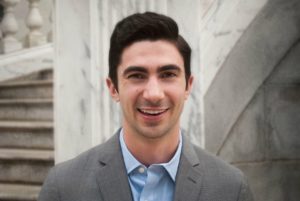
Michael Anderson, Suffolk University Law School, ’20
The morning of November 21, 2016, I arrived at the Standing Rock Sioux Reservation. The landscape echoed with prayerful declarations of “mni wiconi” and the air was weighted by the brutal encounter with law enforcement the night prior. An urgency to protect the Sioux people’s right to land and clean water called me to the Reservation, and while there, I witnessed a community’s struggle to achieve those basic rights. The injustices that mark the history of Dakota Access Pipeline construction are numerous and they have deeply impacted the indigenous community that depends on the water the pipeline threatens. Standing Rock deepened my sense of the need to address societal problems implicated by environmental policy and law. In addition to my work at an environmental nonprofit, it ultimately led me to apply to law school.
Before law school, I worked at the Kalamazoo Nature Center. I worked closely with the U.S. Fish & Wildlife Service to plan and implement recovery efforts for regional threatened and endangered butterfly species, including the Mitchell’s satyr butterfly. The Mitchell’s satyr is federally endangered and protected under the Endangered Species Act. I gained a profound appreciation for this rare butterfly, as well as an understanding of the limitations of the ESA, a statute that has recently come under attack. Though the ESA made it possible to secure protection for critical habitat necessary for the conservation of the species that would have otherwise been developed, the power it offers is often not enough and now under attack from various proposed regulations. The ESA and other statutes, such as the Clean Water Act, are critical to ensuring preservation of the natural world.
Since being in Boston, policy engagement at the Massachusetts State House and environmental regulation at the Massachusetts Department of Environmental Protection hasaffirmed my commitment to environmental law. In conjunction with a competitive fellowship geared towards galvanizing the next generation of public policy leaders, this past summer I worked for Senator Patricia Jehlen at the Massachusetts State House. I was exposed to the legislative process, and more importantly, privileged to lead a policy initiative regarding the State’s response to invasive species. My time at the Department of Environmental Protection also showed me that environmental advocacy is often limited by policy, and that society depends on those that advance justice through policy.
The first law of ecology establishes that everything is connected, and as I have learned, the future of the environment is deeply tied to the policy that surrounds it and the governments that impact it. Notably, the American Constitution Society recognizes the importance of policy and advocacy on all fronts. Leading Suffolk University Law School’s Student Chapter has been a privilege because ACS provides a vital backdrop to ensuring the relevance of progressive values and perspective.
2/25 Students of ACS
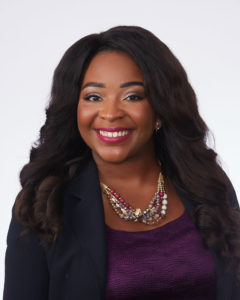
Veronica Carroll, UNT Dallas College of Law, ’19
I am a daughter, sister, Auntie V, leader, advocate, and future lawyer. For as long as I can remember I have always wanted to be lawyer. I can remember telling my grandmother this at the age of 10. I have always been passionate about helping others. I have seen my fair share of success at a very young age and I attribute that success to my mother. As a single parent, my mom worked three jobs to ensure that my siblings and I never went without. She prioritized education and worked hard to ensure that we were involved in a diverse range of extracurricular activities (band, drill team, choir, track, and church). My mother told me that if I put God first, work hard, and never give up, I could accomplish anything. My mother led by example when she went back to school and obtained both her master’s and bachelor’s degree. I have always thought to myself that if I could grow up to be half of the woman that my mother is, then I would have accomplished a lot.
As a first-generation college student, my experience at Texas Southern built upon the foundation that my mother provided. I grew up in a small town in east Texas called Texarkana, where I did not see many successful black people. During my first day of class at TSU, I can remember being taken aback seeing hundreds of black women and men in college. It subconsciously changed my outlook on success, and I realized that success was obtainable for me. It was at my beloved TSU that I began to flourish as a leader by advocating for students as Student Government Vice President and representing TSU as Senior Class Queen and as the Barbara Jordan-Mickey Leland School of Public Affairs Queen. Through these leadership opportunities, my HBCU experience equipped me with the necessary foundation that I needed to be successful and prepared me for the challenges that I would face as a young black woman in America.
I currently serve as the Founding President of the UNT Dallas College of Law ACS chapter. ACS has provided me with a platform to create a safe environment to discuss issues that are impacting the country from reformative justice and police brutality, to immigration, diversity and inclusion, LGBTQ Rights, and First Amendment issues. I am thankful for the prominent judges and lawyers in the community who volunteer their time to speak at ACS events. ACS would be nothing without the students who are engaged and ready to learn as well as the support of our faculty advisors. I believe that attending UNT Dallas College of Law – the 3rd most diverse law school in the United States – has a direct correlation to the success of our ACS Student Chapter. I would personally like to thank Jay Forester for encouraging my colleague Bradley McDaniel and I to start our ACS Student Chapter.
2/18 Students of ACS

Joseph Scherpenberg, University of Kentucky College of Law, ’20
I came to the University of Kentucky College of Law by way of Cincinnati, Ohio, where I spent my entire life before moving to Lexington. I come from a large family, full of union electricians in the IBEW Local 212. From a young age, my parents instilled in me the values that were crucial in a democratic workplace: hard work, equality, and teamwork. I apply these to every aspect in my life, particularly to my academic and athletic pursuits.
As an undergraduate at the University of Cincinnati, I was a member, and later team captain, of the varsity swim team. After I graduated, I took two years to try to qualify for the U.S. Olympic Trials in 2016, narrowly missing an invitation by 14 one-hundredths of a second. With my athletic dreams fully pursued, it was time to shift back to what my goal was all along, to attend law school. I found my way to the University of Kentucky, where I was blown away by the school’s academic record and the level of engagement from professors on my visit.
Looking to be involved, I talked to ACS members and found an organization where I could put my beliefs into action and help share the ideas of progressivism in the law. As an ACS chapter leader at the University of Kentucky I’ve been able to connect students with legal professionals working across the state and beyond in the pursuit of progressive causes. ACS at UK Law also created a space for our fellow students to engage with each other to create connections between progressive minded people that will one day be involved in the most important policy and legal decisions in Kentucky.
2/11 Students of ACS
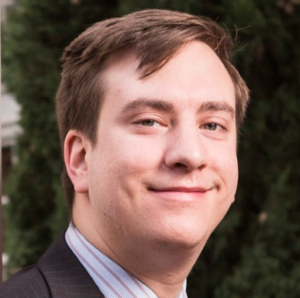
Mick Harris, Willamette University College of Law, ‘19
Having the opportunity to attend law school has been a tremendous privilege for which I am deeply grateful. I grew up in southern New Mexico and began working when I was fourteen. My parents come from humble backgrounds and have never been employed in lucrative positions. When I graduated high school, I did not initially know how I would finance a college education. However, I was extremely thankful to receive a scholarship that allowed me to attend New Mexico State University.
At New Mexico State, I studied government in the hopes of learning more about the function of our society and how to make a positive change in the systems that guide and govern us. I was also very lucky to study abroad in the Netherlands. This was an eye-opening experience, as the Netherlands is both a nation that places a high premium on civil rights and has strong prejudices that run through its society. Admittedly, I found these biases unnerving and disappointing to witness. Seeing bigotry in a nation that is arguably far more progressive than the United States steeled my resolve to fight injustice wherever I saw it. I moved to Oregon in 2012 and spent three years working in local politics, helping elect strong candidates who believe in the value of diversity, compassion, and community.
This passion to fight injustice culminated in my desire to attend law school in Oregon, where I plan to stay after graduation. Being involved in ACS since my first year and now serving as Chapter President has been a fabulous, rewarding experience. ACS has opened many doors and helped me find a place to flourish in a politically complex time. I look forward to staying involved with ACS after graduation and working together to build a kinder, more progressive world.
2/4 Students of ACS
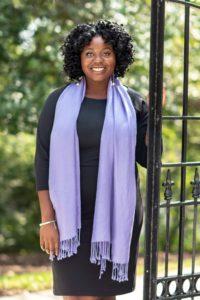
Oretha A. Manu, Howard University School of Law, ‘20
I always knew I wanted a career that made a difference in the world. My classmates in high school voted me “most likely to save the rainforest,” our version of “most likely to succeed,” and my guidance counselor frequently told me that I would become the first female President of the United States. When I started studying the Constitution, I began to realize my guidance counselor’s goodhearted sentiment was never going to come to fruition because I was not born in the United States.
I was born in a country so entangled with the U.S., yet many do not know its history. The Republic of Liberia began in 1822 as a settlement of free blacks in America by the American Colonization Society (ironically abbreviated ACS). I moved to the United States in 2000 and the Bush v. Gore election was my introduction to American politics and Constitutional interpretation. Hanging chads were sensationalized, and the importance of voting was trivialized. It was at that point I made a vow that when I got the chance to vote, I would make sure I exercised that right because elections could be won or lost on a small margin.
During my first year of law school, I joined ACS because I saw the opportunity to effect change in the Howard University School of Law community. I serve as President for the 2018-2019 school year, and it is my goal to continue expanding the chapter and form meaningful connections with other ACS Student Chapters as well as the Washington, DC Lawyer Chapter. During our first program of the school year, we held a Constitution Day panel on voting rights. Representation matters and as a black female immigrant, it is crucial now more than ever to not only have a seat at the table, but to demand one.
1/28 Students of ACS
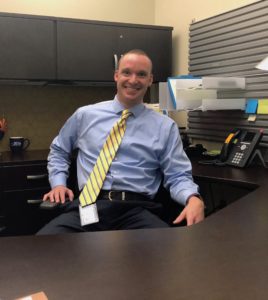
Connor Sonksen, Arizona State University College of Law, ’19
I discovered my passion for law during the summers I spent with my grandfather, a prosecutor for over forty years in Phoenix. The riveting stories he would tell me about the cases he tried solidified my decision, at the age of eleven, to become a prosecutor. For many years, I never once changed my mind or seriously considered other options. As soon as I could, I eagerly applied to the local DA’s office, where I spent my 1L summer. My experiences there uprooted the foundation of my professional journey and transformed me in ways near impossible to exaggerate.
At the DA’s office, I witnessed first-hand the Arizona and federal criminal justice systems. During my short time there, I witnessed a system designed to systematically target specific individuals; defendants charged with misdemeanor drug and property crimes were often already victims of the cruel, partial, and often bigoted state of political affairs.
While I may still become a prosecutor, I have shifted my focus to criminal justice reform—a focus I hope to continue well into my practicing career. Through the American Constitution Society, I’ve had the opportunity to meet lawyers who are on the front lines of this battle, and now I have a clearer idea of where I want my new ambitions to take me!
As President of our student chapter, now almost three semesters young, I hope to bring similar stories and realizations to my peers and connect those with their own unique progressive vision to the lawyers in the field who need their help fighting the good fight!
1/21 Students of ACS
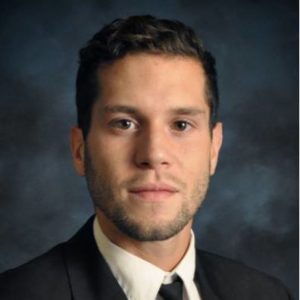
Mizael Carrera, University of New Mexico School of Law, ’20
When I decided to attend the University of New Mexico School of Law, I came with the purpose to become part of a community that creates change in our society. I have always had a passion for public policy and law. However, as a Latino who knew no attorneys prior to attending, I started law school unsure of what to expect and what opportunities would be available. To my delight, there were countless opportunities and organizations that helped guide me and provided many opportunities to learn and network.
I discovered we had several organizations that focused on constitutional law and policy at my law school, but the organization that stood out to me was the American Constitution Society (ACS). This organization was one with like–minded individuals who are fighting to make a better society. Our ACS chapter has been an organization that has allowed us to discuss constitutional issues and challenged other views in a respectful manner. It has also allowed our law school to be a more open environment for discussion of different topics and views. As the nation’s leading progressive legal organization, ACS provides many wonderful networking opportunities and helps foster meaningful dialogue during these times of political and social turmoil. I am truly grateful to be part of ACS and I look forward to continuing to grow our chapter.
1/14 Students of ACS
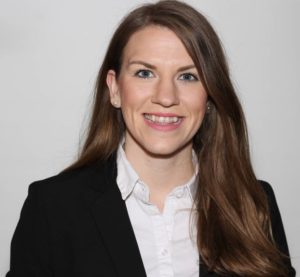
Stacie J. Osborn, Loyola University New Orleans College of Law, ’20
As a fifth-generation Texan, I have immense state pride and grew up learning about and looking up to some fierce Texas women. Ann Richards, Barbara Jordan, and Lady Bird Johnson (to name a few) all left Texas a better place for future generations. However, there is still so much work to be done in the ways of equality, education, health care, and access to justice. So, I decided to go to law school to be a part of the change I want to see in my Texas.
As a first-generation graduate, law school was a massive undertaking. There are still days where I wake up and cannot believe that I am here … that I made it. I did not exactly know what to expect when I started my 1L year in the fall of 2017, but I knew I wanted and needed to be involved. I looked for a progressive organization that believed the law should help improve the lives of people, not hinder them. I found that in ACS.
As a student chapter leader, I have had incredible opportunities to go to conventions, meet mentors, and make meaningful friendships with people who see the world as I do. Our student chapter at Loyola is new but thriving, and I am grateful for the tools, resources, and support ACS provides. We have been able to host impactful events around progressive lawyering and have started the tough conversations about the many crises our country faces with the current administration. I take great pride in the work ACS is doing and I take great pride in being a part of this community.
12/17 Students of ACS
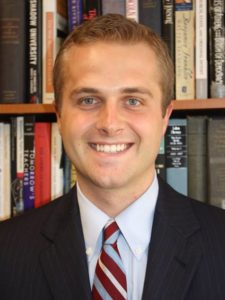
Drew Lakin, The University of Iowa College of Law, ‘20
On December 28, 2007, a few days before the 2008 Iowa Caucus, my father asked if I wanted to see a young senator running for president named Barack Obama. I was a sophomore in high school living in Clinton, Iowa and had very little interest in civic engagement or public policy. But thankfully, my father persisted, and I found myself sitting in a middle-school gymnasium listening to Senator Obama talk about the importance of public service and the duties and responsibilities of all citizens. He spoke of the need for a more equitable society and the need to bring people together in order to solve problems. His message resonated with me so profoundly that, as I left the gymnasium, I knew my life’s path had been altered. Although I did not know it then, my path to law school also began that night.
I am attending law school because I believe the law can and should be used to ensure justice for all people. I am a member of ACS because it mirrors those same values. ACS’s commitment to equal access in our justice system, voting rights, and the rule of law are all reasons why I remain a staunch supporter of the organization and its mission.
I am proud of the work the University of Iowa College of Law Chapter has done to further the mission of ACS. From hosting prominent speakers who further the debate regarding voting rights and gun-violence, to teaching local 7th-grade students about the importance of the 1st Amendment on Constitution Day, our Chapter strives to educate and advocate for a more just justice system.
12/10 Students of ACS
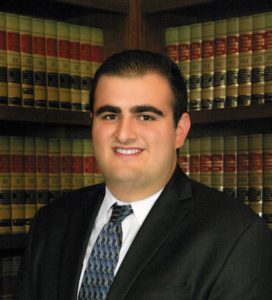
Oday Yousif, California Western School of Law, ’20
Since childhood, I knew I wanted to join the legal profession. I consistently set my sights on the goal of getting to law school and becoming a successful lawyer. I have been privileged enough to know that this was a possibility.
Growing up in an Iraqi-American household at the outset of the Second Gulf War, I became aware of the country’s political climate. Unfortunately, it was the Iraq War that drove my interest to politics, and specifically, progressive politics. Finding the American Constitution Society as a first-year law student was the perfect outlet to satisfy my desire to stay politically engaged during school.
Most political observers will point to the last few years, specifically, and much of the Obama administration, generally, as a time of great political strife and major partisan gridlock in the country. However, those who have experienced growing up in a community where you are a minority and are routinely singled out for being part of such a group know racism and xenophobia are nothing new. Minorities across this country have known this for decades, and even centuries.
Consequently, being part of an organization like ACS as a law student has worked twofold for me: I can embrace and spread a progressive interpretation of the Constitution while also working to advance the cause of people who have traditionally been left out.
Alongside our leadership team, it has been an immense pleasure helping to re-energize the ACS Student Chapter on my campus. We have been able to garner considerable interest from students and plan to continue growing our presence. In a time when staying politically aware is crucial, ACS Student Chapters like ours are ensuring the progressive perspective is known and prominent. I look forward to continuing to spread our message.
12/3 Students of ACS

Conisha Hackett, University of Mississipppi School of Law, ’20
Mississippi is where I am from, but it is not who I am. I am for justice, equality, and equity. Because “where justice is denied, where poverty is enforced, where ignorance prevails, and where any one class is made to feel that society is an organized conspiracy to oppress, rob, and degrade them, neither persons nor property will be safe.” (Frederick Douglass, “Southern Barbarism,” 24th Anniversary of Emancipation, Washington, DC, 1886)
When I first joined ACS, I had no clue what membership entailed outside of attending a meeting. ACS was not discussed extensively around the law school. I decided to find out for myself. I began to do some research and, unbeknownst to me, I stumbled on a goldmine. From a young age I was groomed to be an agent of action. I have been a member of the NAACP since I was 10. I was raised to be firm and conscientious about the need to improve access to the rights and liberties that were expressed in the Constitution. My first year in law school initially changed that. We were being groomed to be drones and replicas of “what is” instead of “what could be.” In class, we were taught the law, but outside of class there was little discussion on how to change it or how it affects certain people, especially marginalized individuals. Our professors would discuss these topics, but some students were too afraid. Our administrators encouraged individuality, inclusivity, and diversity. They worked hard to have professors speak at orientation about helping us and the importance of them creating an environment that was and is conducive to our learning. They invited open discussions and speakers who talked about implicit bias, especially bias against marginalized people. These conversations seldom occurred since law students are too political and aspirational to open the doors of truth and honesty. As a Black woman from a low-socioeconomic background in Summit, Mississippi, I fit into several categories created for marginalized people. However, I refuse to be put into a box; I refuse to be put into a circle of influence of a person I never want to become.
ACS has provided a foundation for students who want to promote genuine equality and access to justice here at the University of Mississippi School of Law. For me, ACS became, and is, a safe-haven in a world of uncertainties. My ACS family became my friends and allies. We work to envision events and ideas to spread awareness of justice and equity in the law. ACS has allowed me to be “for truth, no matter who tells it,” and to be “for justice, no matter who it is for or against.” – (Malcolm X, “The Autobiography of Malcolm X as told to Alex Haley,” New York, NY, 1965)
11/26 Students of ACS
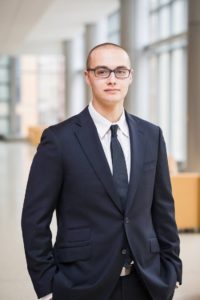
Dennis Futoryan, New York Law School, ’19
The neighbor’s kid chasing my brother with a knife, the indifferent teacher dropping my mother’s grade, the policeman trailing my father to the store – those are some of the stories I’ve heard from my family about what life was like as a Jew in Soviet Ukraine. I am the first American born into my family, and I’ve carried that badge with honor all throughout my personal and academic career.
Evolving into the law student I am today did not happen with the snap of two fingers; it gradually developed over time. I started paying attention to politics in 2011, at the height of banal budget negotiations between the White House and Congress that ended in partisan snubbing at the expense of funding essential programs. “I just want to help people,” I remember saying to myself. Fast forward to graduating Brooklyn College in 2015 with a Bachelor’s in Political Science, and next thing I knew, I was a matriculating law student in New York Law School.
Born and raised in Bensonhurst, Brooklyn, New York, I knew that the more you focus on your community at the grassroots level, the stronger the coalition you’ll build, laser-focused on the issues that matter. As President of the New York Law School chapter of the American Constitution Society, I listen to my fellow students’ concerns and transform that into experiential programming. Through our annual Supreme Court Roundup, Con Law Trivia games, documentary screenings and much, much more, my team and I seek to immerse law students in the constitutional hot topics of the day.
The best thing we can all do is stay involved in the fight, and vow to never cease making a difference in others’ lives.
11/19 Students of ACS
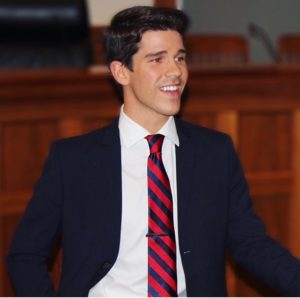
Daniel Enos, Catholic University of America, Columbus School of Law, ’20
With the polarized state of the current political climate, many are hesitant to differ from party lines. This is ever apparent in Washington, DC. I happen to be enrolled in a law school in DC, with a conservative student base and a speaker policy that prohibits discourse on topics that differ from Catholic social teaching.
I find myself in a unique position—I am a progressive practicing Catholic with a large number of conservative and moderate friends. While my own views may differ from some of my conservative peers and the school itself, we have established a mutual respect. As President of our ACS Chapter, I have made it our priority to foster this respect and break the mold of partisanship on our campus. We aim to host issue-specific events and encourage all who are interested in the subject matter to attend, regardless of any political affiliation. Our intention is to encourage classmates that may identify as conservatives or moderates, but feel progressive on certain issues, to feel welcomed to attend. Thus far, we have had success. We have gained support in our school on issues like immigration, gerrymandering, and criminal justice reform. I pride our chapter on creating events that individuals from all political ideologies feel comfortable attending. After all, we cannot get anywhere without mutual respect and the cultivation of productive discourse.
As I look ahead this year, I am excited to continue our initiative of hosting issue-specific, progressive events and to begin planning debates with our conservative counterparts. While we have our limitations, it has been exciting to see our small chapter grow and for the school to come together on progressive ideals.
11/12 Students of ACS
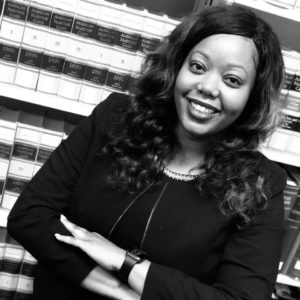
Jasmine Price, Southern Illinois University School of Law, ’19
As a Black child raised by a single mother in a minority neighborhood that lacked access to quality education, I have always known that I wanted a better life for myself. My journey to law school was not an easy one. I was surrounded by people telling me a good job will suffice – those were the daily epithets of the people in my life. Fast forward, through an LSAT and a few rejection letters; a few years later, I quit my well-paying job to pursue a dream of becoming an attorney, a dream that I never thought I was good enough to obtain.
When I started law school I continued to feel displaced and unwelcome. I found my home at Southern Illinois by joining groups like the American Constitution Society, the Black Law Students Association, and Women of Diversity. These groups made me feel that not being in the majority is a strength. They helped me realize that this journey through law school and fighting for equality, social justice, and change are bigger than me.
I express my sincerest gratitude for ACS because this organization has exposed me to opportunities that I thought I would never experience. Being in the same room as my hero, Supreme Court Justice Sotomayor, at the 2018 ACS National Convention gave me the encouragement that I needed to push on through the challenges of law school. It has not be an easy road, but I find consolation in knowing that ACS cares and fights the good fight with me.
11/5 Students of ACS

Tracey Klees, Georgetown University Law Center, ’19
I found my passion for the law in my first job out of undergrad. As a newly minted graduate after the worst of the market recession, I stumbled into the first available administrative role I could find, working as an immigration paralegal. I was lucky. I always had an idea that politics and policy were important, but I didn’t fully comprehend the direct impact policy decisions could have on someone’s life. I realized that access to an advocate can be life changing. I was looking for a career where I could make an impact, and once I found it, I didn’t look back.
In my experience, I’ve found that many people do not feel knowledgeable enough or smart enough to comment on big policy questions. The most important conversations are the ones we are having in our daily lives. ACS, not only gave me the confidence to speak up, but also supplied me with tools to push back on hurtful rhetoric that doesn’t advance the goal of improving the lives of all people. The ACS network provides me with an outlet to be passionate in my beliefs and fosters my ability to serve as an advocate.
I am motivated by the intelligent and thoughtful students I have the privilege to work with on a daily basis, who further encourage me to have difficult conversations with those whose views don’t fully align with my own. I am striving to create an environment for my classmates in which they feel welcome to discuss difficult policy issues and to help each other develop better arguments that reach wider audiences. ACS was the first club I joined in law school and I am proud to serve as President of my chapter in my final year.
First, we believe, then we argue our case, and eventually, with a lot of persistence, we make a change.
10/29 Students of ACS
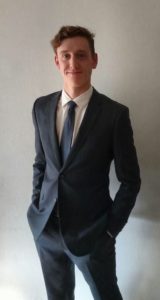
Steffen Thomas, University of Utah S.J. Quinney College of Law, ’20
I entered law school in the fall of 2017, a few months after President Trump fired the director of the FBI, declared transgender men and women unfit for military service, and attempted to ban Muslims from setting foot on American soil. Yet, in the first few weeks of school I did not hear a word about what was happening outside the walls of the law library. My classmates were either entirely immersed in contracts, torts, and civil procedure, or were just too polite to risk offending one another’s political sensibilities. Meanwhile, the shaking foundations of American Democracy seemed a million miles away. I felt like I was going crazy.
I was handed a pocket constitution around midterms and attended a small group discussion with an ACLU attorney. After that moment I was ready to get the ACS logo tattooed on my chest. ACS became an important outlet for my progressive activism. When a particular issue was not discussed in class, I knew that ACS was working behind the scenes preparing progressive law students to respond. My engagement as a 1L led to an internship with the ACLU of Utah and to taking over as chapter president in my 2L year.
As a Student Chapter President, it is my goal to make sure that incoming students know that there are many of us who believe that the law can provide more than just a paycheck, but also a powerful force for progressive advocacy.
10/22 Students of ACS
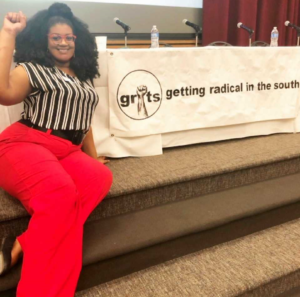
Candace Square, Paul M. Hebert Law Center, Louisiana State University, ’20
When studying law, naturally there is an emphasis on the letter of the law and learning very specific legal rules. Though I enjoy this aspect of my legal education, my passion has always been to holistically uplift those who are most disenfranchised in our society. In reality, I am an activist at heart.
My desire to serve the most disenfranchised among us comes from witnessing poverty and discrimination in my community and country. Although we are in an especially dangerous time for vulnerable populations, I continue to have hope that anyone can succeed with the support of a loving community. My family is the ultimate example of this and they continue to inspire me every day. My paternal grandparents, who together had only a 5th grade and an 8th grade education, managed to raise 12 college educated children, including my father, a patent attorney and business owner, at a time when explicit racism was ubiquitous in the South. My mother, raised by a widowed single father, became a healthcare professional who serves veterans with medical expertise, compassion and care. That example of resilience led me to pursue my dream of becoming an attorney in spite of my fear that I might not succeed.
Through my participation in our LSU Law ACS chapter, first as the Liaison to the Lawyer Chapter and now as President of our chapter, I’ve learned how to merge activism with lawyering and to incorporate a social justice mindset to all the work that we do. Our very young chapter has almost doubled since my 1L year and has had many successful events partnering legal organizations with community organizations to give that holistic support to the most vulnerable. I’m particularly proud of our partnership with the East Baton Rouge Public Defender’s Office: We are collecting and donating court-appropriate attire for indigent defendants, who would normally appear in prison-issued clothing and face the bias associated with this attire.
Our chapter learned even more strategies around community solidarity at the 2018 GRITS conference, which was a transformative experience for our members who attended. This conference revitalized our commitment to prioritizing progressive values in our legal careers and I am forever grateful that ACS has provided the support, resources and community to help me turn a passion for activism into a lifetime commitment to pursing justice in all its forms.
10/15 Students of ACS
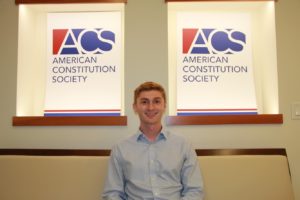
Ben James, American University Washington College of Law, ‘21
As a native of the Washington, DC area, I’ve been surrounded by politics and legal discourse my whole life. It followed logically that I majored in political science during undergrad at the University of Michigan, and I was thrilled to return to Washington, DC after graduation to work at ACS’s national headquarters.
When I first started at ACS, I was unsure as to whether I wanted to go to law school. In my job, I worked with ACS’s Lawyer Chapters across the country, and in doing so formed relationships with an array of lawyers who practice different types of law but share a common progressive vision of the Constitution. Observing their tireless work on behalf of ACS ultimately inspired me to apply to law school, as it illustrated the unique capacity of lawyers to enact change in our society.
As a 1L at the American University Washington College of Law, I’m still exploring which areas of law appeal to me the most; public interest, technology, and intellectual property are early favorites. I’m currently getting involved with the leadership of our Student Chapter, and I can’t wait to continue to fight for ACS’s progressive vision of our society through law school and beyond.
We need ACS now more than ever. Whenever I find myself frustrated by the day’s headlines, I take solace knowing that ACS has such a wide-reaching, intelligent, and driven community of legal professionals fighting to ensure that the law benefits all people. I will always be grateful to be a part of that community.
10/8 Students of ACS
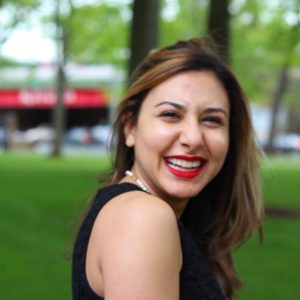
Sonni Waknin, University of California, Los Angeles School of Law, ‘20
Since I was young I have been dedicated to public service. At eighteen years old, I ran and was elected to the Democratic County Committee- a public office in my county in New Jersey. I chose to attend law school in order to gain the skills necessary solve the systemic problems that I saw within society.
When I got to law school, however, I felt lost. During undergrad, I was extremely involved in politics and political campaigns. From taking every political science seminar to working with the Rutgers-Eagleton Poll, I created spaces to engage with policy in a practical manner. These outlets allowed me to work with progressive, open-minded, and hardworking students to achieve goals. In law school, classes were more difficult and the outlets I traditionally turned to were not available. The American Constitution Society changed that. ACS provided me with a space to work with other like-minded students and supported my goals.
When I wanted to get students involved in voter protection work, I knew that ACS would not only encourage my ambitions but provide me with the support necessary to make my ideas come to fruition. This past summer, I worked with ACS and UCLA Law to plan a three part voter protection series at UCLA Law. There has been a panel featuring national voter protection experts, such as Kathay Feng and Professor Justin Levitt. ACS has partnered with Asian Americans Advancing Justice and Election Protection to bring poll monitor trainings on to campus. On Election Day, ACS has been advocating for students to receive excused absences to engage in civic service work. None of this could have been possible without being involved with ACS.
10/1 Students of ACS
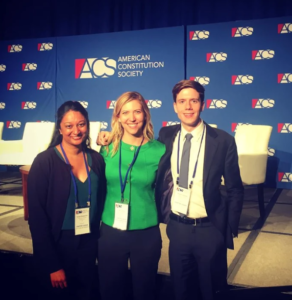
Russell Quarles, Northwestern University Pritzker School of Law ‘19
Like most law students, I started my first day of 1L classes with little idea of how I would fit into the Northwestern community. There were dozens of organizations clamoring for new members, but I was wary of joining the “Real Property, Trusts & Estates Law Society” when I couldn’t even explain what a trust was. I wanted to join a progressive group, as I’d done some work with left-leaning think tanks before law school, but that did little to narrow my interest list. A few organizations were focused on single-issue activism. Some provided opportunities for volunteer work, while others functioned as debating clubs for legal controversies. Over a few weeks of attending events, meeting students, and engaging in community service, I noticed that all of the most impactful activities had one element in common: they were supported by Northwestern’s ACS student chapter.
ACS proved to be my bedrock in law school, an unparalleled group of friends and mentors who were eager to integrate me into the community. More than that, ACS has taught me how to be a progressive lawyer, rather than just a progressive person. Its programming focuses on issues that lawyers can solve, it showcases the career paths open to progressives in the law, and it tries to ensure that the judiciary is working towards progressive ends, rather than against them. In that sense, ACS is not an organization that emphasizes political activism writ-large. Rather, it puts its energies behind helping lawyers engage as progressives through their vocation. I couldn’t be more thankful to be a part of that mission.
9/24 Students of ACS
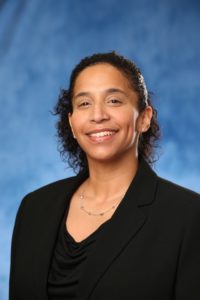
Roeiah “Ro” Epps, University of Detroit Mercy School of Law, ’19
After spending several years as a social worker, I decided my voice would best serve as a lawyer. But not just any lawyer. A lawyer who knows people and is not afraid to represent the powerless, against the powerful. The kind of lawyer that embraces the voice to speak out when society says “accept the status quo.” This kind of lawyer is called a progressive. Progressives are the voice for those who often go unseen and unheard. That voice is me.
Witnessing many injustices has always made me seek justice. Whether it was a judge not ordering treatment for an abused child on my caseload or seeing a high school classmate with a learning disability wrongfully convicted, something about these injustices ignited a fire inside of me. I too had endured many challenges in life but was able to overcome them. It is my belief that challenges help shape and mold you; they don’t define you. I didn’t choose to be a progressive; progressive advocacy chose me.
After my first year of law school, I had the privilege of assisting our former President reactivate our ACS student chapter. Since that time, ACS has help me channel my passion for justice and equality into a progressive movement. As Outreach Director for the past two years, I have facilitated several campus events, attended the National Convention, and forged lasting relationships with other powerful progressives in the legal community.
ACS not only promotes access to justice, it creates the environment to ensure justice is served. Before even graduating from law school, ACS has already provided me with the forums and outlets to great legal minds who share my same passion and purpose. I look forward to the continued promotion of all freedoms and liberties afforded by the United States Constitution for all people as a member of the ACS lawyer chapter. #ACSForever #AllPowerToThePeople #OneManOneVote #LetsGo!
9/17 Students of ACS
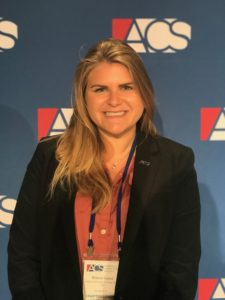
Bianca Lopez, Stetson University College of Law, ’20
As an undergrad, I found my outlet in the school newspaper working with smart and progressive-minded students to voice our shared views on politics and world events. While it’s invaluable to talk to people with differing opinions, it’s also important to have a space where you can comfortably express your thoughts. In law school, I found this outlet through the American Constitution Society.
Professor Ciara Torres-Spelliscy, the Faculty Advisor at Stetson Law, was tabling at my school’s organization fair. I exchanged my email for one of her pocket constitutions. Soon enough, I was elected Vice President (later, President) of our ACS chapter. I hosted events on campus, found a mentor from the local ACS Lawyer Chapter, attended the Student Convention in Chicago, and listened to Supreme Court Justice Sonia Sotomayor speak at the National Convention in Washington, D.C.
With each event I attend and as I meet new members, I grow more impressed and motivated by ACS’s pursuit of justice and equality. ACS is a place where intelligent and strong legal minds come together, constantly striving to improve our country to make it a better place for everyone.
Today, ACS is more important than ever. Before getting involved in ACS, I had many critiques of the current administration, but no real solutions. ACS has equipped me and so many other law students with tools to have our voices heard and methods of making real, progressive change.
9/10 Students of ACS
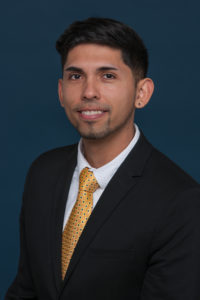
Daniel Cortes, Florida International University College of Law, ’19
When I went to law school I was unaware the wide variety of organizations that were present at the school. Like most of us, I am very passionate about certain topics, especially constitutional issues. When I went to law school, however, I was unaware the wide variety of organizations that were present at the school to pursue my interests. In my first year of law school, the only constitutional organization was The Federalist Society, and I was completely unaware that the American Constitution Society even existed. I quickly found myself disagreeing on some issues with my colleagues and wished there was a space for my views. At the same time, I was very outspoken about social issues and public interest legal careers. Through my engagement, I quickly found out from a law school alumna, Rachel Bentley, that there was once a thriving ACS chapter at our school. She put me in contact with ACS National and we were able to reactivate our chapter here at Florida International University (FIU) College of Law.
When I think of legal justice, I think of access, and that is what inspired me to reactivate this chapter. I will make sure that it stays active at the school so that there is access to both sides of the story. As an immigrant, it is so important for me to have a space to advocate and tell my story in a legal setting. I know that ACS allows me to do that.
9/3 Students of ACS
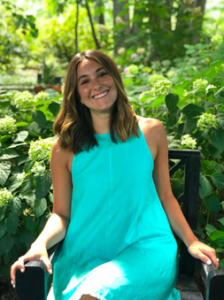
Hannah Klain, Harvard Law School ’19
For much of my life, the idea of attending law school and becoming a lawyer was unimaginable. Although I was raised in a political family in Washington, DC, I was determined to chart my own career path away from legal and political spheres. After college, I began working in the fashion industry for a famous designer, yet I found myself unsatisfied and increasingly drawn to social change as my true calling. Ultimately, I chose to leave the fashion industry to take an entry-level job in a political advocacy firm.
In 2014, I began working with “Rock the Vote,” a group mobilizing young people for civic participation. On Election Day that year – the first national election since the Supreme Court decision in Shelby County v. Holder – I was stationed in Rock the Vote’s “boiler room,” taking voter complaints and relaying them to teams of lawyers. Some polling places illegally refused to give voters provisional ballots; some were making voters show IDs not required by state law; others had lines lasting several hours in duration. Each time I heard about these impediments, I spoke to a legal team and helped get them information to file emergency actions to protect voters’ rights or extend polling hours. As results rolled in, it was clear the limitations we battled put a major damper on voter turnout, particularly among people of color. This only deepened my outrage at the injustices I had heard about from voters; I knew then I wanted to devote my career to fighting for civil rights, particularly voting rights, for all.
My passion for public service lead me to a position on the Clinton Campaign in 2015, where I helped develop strategies on early voting programs and briefed surrogates who educated communities of color on overcoming obstacles to voting, particularly in Southern states. Nonetheless, I realized that to right the wrongs that most enraged me I had to become a lawyer. So after the primaries ended, I left the campaign to enroll at Harvard Law School. From the day I came to law school, I was certain I wanted to be a civil rights lawyer. While at Harvard, I have been fortunate to intern with the ACLU Voting Rights Project, Brennan Center for Justice, Campaign Legal Center, and NAACP Legal Defense Fund.
However, I’ve also learned a tremendous amount about the fight for voting rights – and other critical, progressive, legal battles – through my involvement with ACS. When I arrived at HLS, I knew how important progressive causes were to me, but I wasn’t sure how I would stay involved. I was able to stay involved because I found ACS, and in ACS I found a group of people who wowed me with their activism, their conscientiousness, and their eagerness to use the law to effect positive change in a broad range of communities and systems. I’m honored to have been chosen to lead the Harvard ACS Chapter, as President, during an election year, where so much is at stake. My hope for HLS ACS is to carry on the Organization’s proud tradition of fighting for progress and for good in the courts, on the streets, and at the ballot box. I know ACS’ mission – and its members – have never been more critical.
8/27 Students of ACS
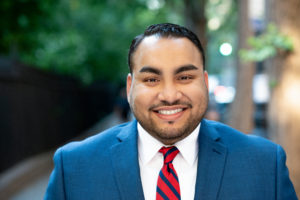
Mohammed Tazbir Alam, University at Buffalo School of Law ’20
Sitting at my desk, gazing out of the window of my elementary school in Brooklyn, I saw it happen. I watched as the second plane hit the second tower of the World Trade Center. Before I could even comprehend, before I could scream out and alert my teacher, the school’s sirens echoed over the loudspeakers. We rushed into the hallway and shortly after evacuated the school. As I ran home, I looked up and saw burning pieces of paper raining down. I didn’t know it then, but the events of that day would change my life. The outpouring of religious intolerance made me feel like an enemy in my own home. Our faith and culture made us targets.
My desire to pursue a law degree was largely influenced by my identity in this country. A dark-skinned, Muslim, child of immigrants. As a kid I felt powerless up against the racism, discrimination, and violence directed at my community, my friends, and my family. The overwhelming urge to stand up, fight back, and protect them was a driving force that pushed me to get involved in politics and public service. I volunteered countless hours with non-profit organizations, campaigned relentlessly to help elect candidates that supported and defended my community, and worked in all levels of government from local to federal.
At times it is discouraging to see the spread of divisiveness and intolerance, to love a country that has all but declared their hate for everything I believe in, stand for, and am. However, I continue to be hopeful. I am hopeful because every single day I am inspired by the work and dedication to service by the students, fellows, and staff of ACS. As a future member of the legal community, I look forward to being a beacon of advocacy and support for our communities.
8/20 Students of ACS
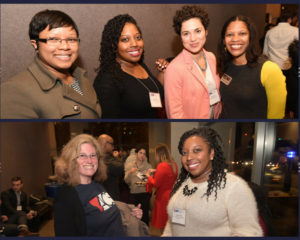
During my second-year of law school, I had the honor of taking Constitutional Law with Professor April Dawson. While I assumed the course would be just another graduation requirement checked off my list, fate had another idea. Professor Dawson teaches Constitutional Law as an interactive history course. By the second week of classes I was so intrigued by the cases and concepts we were learning that when Professor Dawson posted a sign-up sheet for an American Constitution Society information presentation, I knew I had to attend; the free lunch would be a bonus. Once everyone was settled, Professor Dawson introduced NCCU’s chapter director at the time, Peggy Li. During the presentation Peggy introduced a concept I had never described myself as before, but which seemed to resonate with my morals and personality. The concept of a progressive thinker. In so many words, she shared that progressive thinkers work to ensure not only equality but equitability and that progressive thinkers want to protect the sanctity of our democracy. I realized a progressive thinker, was someone who thought like me.
Before the session was over, Peggy elaborated that our chapter needed to be restored due to our former chapter leaders graduating the previous year. I can’t fully explain what happened in the presentation but by the end of it, I was an ACS student chapter leader. I was voted president and since then have been an avid advocate for progressive thinking and ACS. My decision to join this organization has been bolstered by every event that I have had the honor of attending. I continue to be astounded by the number of lawyer chapter members who go over and beyond to provide guidance and insight into various topics. I am on a journey to re-define what “made America great” and I am honored to be part of a community that is working diligently to achieve the same goal.
2017-2018
5/14 Students of ACS

Jedidah Morrell, Northern Kentucky University Chase College of Law ’18
I have always known I wanted to practice law because of my unique experience growing up in an unincorporated territory of the United States, as a daughter of immigrant parents. But, as I entered law school, I began to have serious doubts about the legal system I was about to join. Would I be able to stay true to my ultimate goals and have my actions reflect the principles that drew me into this field?
Last semester, two consecutive hurricanes devastated my hometown, St. Thomas, U.S. Virgin Islands. This caused a communications crisis – for an entire week, I had no idea whether my family made it out alive. I was finally able to share the news with my colleagues that my family was safe, despite losing everything materialistic. They asked how I was able to still show up to school daily. I retorted with the words of my favorite Caribbean humanitarian, Bob Marley: “The people who are trying to make this world worse aren’t taking days off. Why should I?”
I found my niche at law school through my involvement with ACS and internships with the ACLU of Puerto Rico, Kentucky Innocence Project, and Constitutional Litigation at the Ohio Justice and Policy Center, where I participated in transformative work. It was my work for others that kept me going through difficulties. In my role as Chase ACS Chapter President, I was able to turn my pain in power. We organized a food and clothing drive for the often overlooked Caribbean islands which were devastated by the hurricanes.
Although my post-grad job on St. Thomas was swept away with the hurricanes, my plan to devote my professional life to vindicating the human and civil rights of others has not wavered.
5/7 Students of ACS
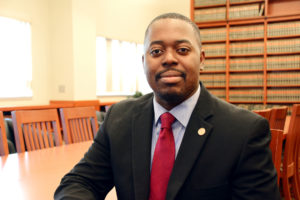
David Alcius, Florida A&M University College of Law ’18
I believe that we will end up where we push ourselves and that where we end up is the result of our will. Often, when folks recount the history of this country, they speak with a air of inevitability that elides the fact that our present existence is not inevitable. As unpredictable as the future is to us today, our present state was just as unpredictable for those living just two generations before us. To bring about change, many individuals had to take it upon themselves to bring about this change. These individuals had to take it upon themselves to build a lasting legacy for future generations to honor as a testament to our shared values. Today, just like the days before it, is the result of the conscious decision-making of men and women who recognized where they stood in relation to history and destiny, for both the good and the bad.
The American Constitution Society understands where it stands in relation to history and destiny. If the arc of the moral universe is to bend towards justice, then it requires hands to bend it in that direction. We need hands to fix our criminal justice system and undo the damage wrought by mass incarceration, particularly in black and brown communities. We need hands to help provide all Americans meaningful access to affordable and decent healthcare without individuals having to decide between their health and their ordinary needs. We need hands to help close the wealth gap. We need hands. While these hands aren’t promised, they must be cultivated.
As the former president of the ACS student chapter at Florida A&M University College of Law, it has been a pleasure to work with folks within the chapter and across the country who are truly committed in providing a hand at moving the country forward and ushering it into a new era that many of us could not have predicted, much less imagined. We are constantly reminded about the importance of the courts and why voting matters. The world that is ours today is a byproduct of what happens in the courtroom and in the voting booth. ACS knows that in order to prepare for the uncertain future and push back against the attacks on our democratic institutions, it’ll need to continue cultivating the next generation of progressive leaders. I am proud to be a member of the American Constitution Society and look forward to being in the thick of the struggles to come, which, perhaps, is the only thing predictable about the future.
4/30 Students of ACS
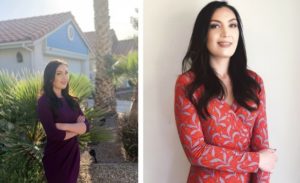
Racheal A. Ross, William S. Boyd School of Law ’18
Viktor E. Frankl wrote in Man’s Search for Meaning, “success, like happiness, cannot be pursued; it must ensue, and it only does so as the unintended side-effect of one’s personal dedication to a cause greater than oneself.” My time in law school has been marked by successes, failures, and monumental changes, both in my personal life and in the world at large. When I started law school, I knew I would change and grow as a person, but I had no idea of the joys and hardships that lay in my path. My law school experience helped me redefine my definition of success and accomplishment.
Not only did I enter law school as a working-class woman with a disability, I entered it at a time of great political and social change. ACS gave me a way forward, a community to commiserate and celebrate with. Without it, I wouldn’t have been able to maintain my grades and climb in the rankings while I was going through divorce, multiple surgeries, a traumatic assault, and a presidential election which uncannily resembled Orwell’s 1984. At times, it felt hard to even get to school, let alone lead my Chapter. Leading my ACS Chapter helped me push through those ruts and gave me an outlet so that I could redirect any negative energy toward helping a cause greater than myself. My ACS network gave me a light to help see through these dark political times.
Thankfully, the joys of my law school experience truly did overshadow the hardships. Through ACS, I was able to connect with leaders in the movement, land jobs I never thought I would get, and travel the country expanding my knowledge—and my network. Because of ACS, I was able to spend a summer in Washington D.C., which changed my perspective forever and energized me like nothing else has. More than legal knowledge and a new way of analyzing data, law school has given me confidence.
What I want someone to take away when they read this is that whatever in life you are going through, or have been through, you can do this. More than that, you can excel. Sometimes success or excellence doesn’t mean getting the highest grade or getting on law review; sometimes it’s just giving things your best shot. Everyone’s personal best is different, but it’s truly all that matters. I know that I gave law school—and ACS—my personal best, and to me, that’s success.
4/23 Students of ACS
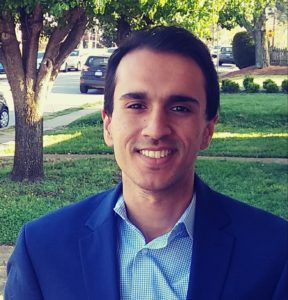
Adil Yaqoob, Vanderbilt University Law School ’18
Growing up in a post-9/11 America, I never considered myself a patriot. Patriotism, to me, meant supporting wars of aggression, torture, racially-targeted surveillance, and indefinite detention. It meant cheering on a regime that violated human rights at every turn. Frankly, I didn’t even consider myself to be completely American, even though I am an American citizen, because of what was being done in the name of the American flag. But after taking a U.S. history course in high school, I realized that some of the most prominent and adored figures in American history were the ones who opposed the government when it engaged in authoritarian and rights-violating acts. Standing up for the rights of reviled minorities during times of distress was as American as apple pie. I realized that true patriotism isn’t supporting your government always and no matter what; true patriotism is defending the principles that make your country unique.
After interning with the ACLU before law school, interning with the Civil Rights Division at the Department of Justice as a law student, and being involved with ACS throughout law school, I realized that the Constitution and the individuals who have agitated for the realization of various constitutional rights are what make this country great. My feelings of patriotism increased after every ACS event I attended. These events made me realize that American values are progressive values; that there isn’t a contradiction in being a believer of equality and diversity and being a patriot; and that the Constitution is at its heart, a document that is deeply concerned with protecting the rights of minorities. After all of this, I proudly and unabashedly consider myself to be a patriotic American.
4/16 Students of ACS
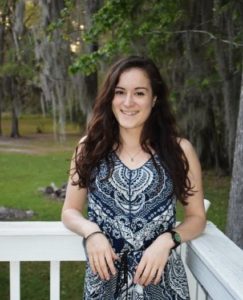
Kathleen Taylor, Mercer University Walter F. George School of Law ’18
Growing up in Coastal Georgia, a generally very conservative and Christian place, being a patriot and supporting your country meant certain things. Being a good American and a good Christian were inexorably tied together. To be a patriot, you had to love God and America. At school, patriotism meant standing up during the national anthem and pledge of allegiance, saying the Lord’s prayer, and writing Bible verses on cards to deployed soldiers. My mom and dad were both US Army officers who reinforced the importance of having respect for the Constitution, the flag, the president, and the military. I had never heard of a Patriot looking like anything other than the adults around me at church, school, and at home. I never doubted that I was a patriot simply because no one had ever implied that I was not.
There’s a prevailing idea among conservatives that their ideas on law and policy grant them a monopoly on patriotism—on American values. Think of the recent revival of the phrase “America First.” It’s obvious that the meaning is that there is a group within America that does not believe in putting America’s interests first. There is a false belief that to be on the other side of “America First-ers” is to be anti-American or unpatriotic. This idea is false and harmful, as a hallmark of progressivism is the belief that what makes America great is diversity. You can be anyone in this country and the law is supposed to afford you equity and justice. America was the pathfinder for those principles in the modern era. Accepting and showing respect for diversity is an essential component of being a patriot; of loving America and advocating for its interests.
Yes, our country has problems. Yes, it’s our responsibility to notice its problems. And emphatically yes, it is our duty to fight and advocate for solutions to those problems, so that we can fulfill our Constitutional ideals. We have to be the change we want to see. Although our beliefs about which policies are in America’s best interest differ, at the end of the day, progressives and conservatives have the same motivation for advocacy: to improve the country that we love. As patriots, rather than saying “Make America Great Again” and “America First,” let’s acknowledge that because we believe America is great, we have the power to make it better.
4/9 Students of ACS
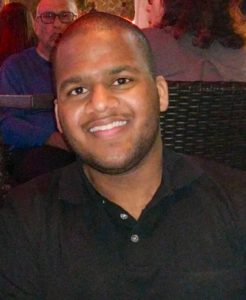
Shane Grannum, Columbia Law School ’18
There is no greater challenge our generation must confront than the threats facing our nation’s democracy. We cannot combat climate change, make gun safety a priority, pursue criminal justice reform, and dismantle the structural inequalities that disproportionately affect people of color without first ensuring that every eligible U.S. citizen has the unfettered right to vote for the elected officials of their choice – without impediments or interference, without fear of intimidation or suppression, and without the undue influence of money in politics. It is for that very reason that I decided to pursue a legal career and join the American Constitution Society.
To me, being a progressive means being a fearless advocate for oneself and others; empowering the marginalized and underserved; and empathizing with the daily challenges and struggles others face. We are stronger as a nation and as a people when we open our arms and embrace others with experiences much different from ours – not as talkers but as listeners.
ACS has fostered that environment, both inside and outside the walls of law school. We critically think about contentious issues with integrity and respect. We don’t let barriers and obstacles hold us back from pursuing change; we simply trudge forward and find another path. After three years of law school, I am all the more stronger because of the grounding ACS gave me. I am all the more wiser because of the ACS members I’ve met and befriended, from classmates to peers at institutions across the country. And I am all the more ready to fight to protect voting rights, reform our campaign finance system, and elect officeholders who will safeguard our democratic institutions for years to come.
4/2 Students of ACS
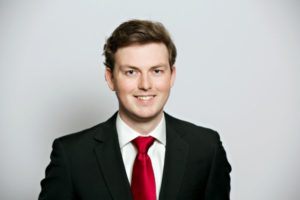
Seth Zawila, University of Minnesota Law School ’18
I went to law school to make a difference. Growing up, I believed that lawyers were the guardians for a society that protected that rule of law and fought for those without a voice. My life experiences have certainly shown me that reality is more complex, but I’ve still held onto that basic premise as I’ve entered into the professional role of a lawyer: that the law should be a tool for all Americans, not just for those with wealth and access.
Working as an ACS Chapter President has allowed me to live this belief to the fullest. I have been able to highlight social injustices that can be fixed by the legal process and actually do something about fixing them. I’ve had the incredible honor of watching our chapter grow from three board members to twenty-five and go from hosting no events to hosting U.S. Senators and Vice-Presidents. The drive to make a difference is what has pushed me and, while it has not been easy, it happened through hard work and embracing the work we do as ACS.
It happened by hosting forums with policymakers and intellectual leaders – asking pointed questions and demanding attention to these issues. It happened by creating a community where bright and passionate people can come together to talk about change. And finally, it happened – most importantly – by empowering others to get involved and fight for the causes that they believe in.
3/26 Students of ACS
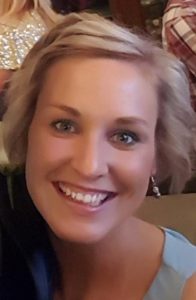
Naomi Martin, Sturm College of Law ’20
“If you are neutral in situations of injustice, you have chosen the side of the oppressor.” This quote by Desmond Tutu is so important in how we make choices in our lives everyday, and is especially relevant to where our country stands right now. I remember reading this quote for the first time when I was considering pursuing a career in law. While weighing this decision, this quote stuck with me. It helped me to realize that I could not stand by as a neutral observer, but needed to get involved in the fight to protect ALL people’s constitutional rights.
While finishing up my junior year of undergrad, I was awarded legal guardianship of my older sister. Guardianship was necessary because of the challenges that came with severe mental illness, and the county and state falling short in providing my sister with her individual rights and appropriate level of care. In this situation, I was able to advocate on her behalf and make sure she was given the level of respect and dignity all individuals deserve, regardless of their mental health challenges. It became so apparent that people who shared these same challenges, but did not have someone to advocate for them, would be brushed to the side and swallowed up by the system. This experience has given me a unique perspective on our legal and social services systems, and furthered my dedication to pursuing a career as an attorney.
Being in my first year of law school and taking Constitutional Law, I more clearly understand and appreciate the protections provided to us by our Constitution. These rights, however, are not applied equally to everyone in the United States. I was fortunate to get involved with the American Constitution Society right away and know that my involvement has helped me to remember why I chose to attend law school. Our DU student chapter of ACS was reconstituted this year and I am so excited to see where we can take it. It is such an inspiration to be a part of an organization that never chooses to be neutral in situations of oppression.
3/19 Students of ACS
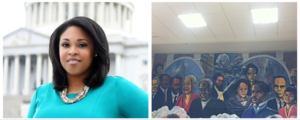
Ashley J. Lawrence, Howard University School of Law ’18
In pursuing a career in public interest, I am constantly reminded of my favorite quote: “Make a career of humanity. Commit yourself to the noble struggle for equal rights. You will make a better person of yourself, a greater nation of your country, and a finer world to live in” which Dr. Martin Luther King, Jr. spoke during the Youth March for Integrated Schools in 1959. For me, the journey through law school has been an arduous one, filled with many tears, stress, and bouts of sickness. My membership within ACS and my decision to attend Howard University School of Law have been sources of strength during my lowest moments.
Sometimes when I have been overwhelmed by the pressures of law school, I walked through Houston Hall and looked at the class murals–from the first graduating class of 1871 to present day–to receive encouragement. Attending law school in the heart of Washington, D.C. has allowed me to have some amazing opportunities outside of the classroom that have nourished my interests in public interest, civil rights and social justice issues. I am committed to social justice, which has been fortified by extensive training in social justice lawyering through civil rights internships with the Lawyers Committee for Civil Rights under Law, the Advancement Project and the NAACP Legal Defense Fund. These organizations are instrumental in leading the fight in social justice with impactful work in the public policy and legal fields. The ideals of ACS directly aligns with the work that I went to Howard Law to do and it is an honor to remain a part of this organization during the next chapter of my legal career as a Next Generation Leader.
Last year, ACS served as a place of solace and community. In our chapter meetings, events, and conventions, I was able to meet like-minded individuals who were committed to the same goals of becoming an advocate and one day enforcing legal protections against discrimination, and safeguarding the civil rights of the disadvantaged. Two experiences that stand out are having lunch with ACS Board of Advisors member Ted Shaw during the Student Convention, who imparted words of wisdom regarding working in the civil rights field. The second experience was the opportunity to participate in Constitution in the Classroom where I taught a Civics class on the First Amendment at Dunbar High School in Washington, D.C. which turned out to be very rewarding. Although I was in finals, it was a great study break — I encouraged students to be interested in the Constitution and inspired them as a future lawyer that looked just like them. My personal background and experiences have shaped my commitment to social justice and public interest work. Growing up in my community of Southeast Queens, New York, there was a microcosm of social and criminal injustice, systemic poverty, unemployment, unequal education, lack of voting rights, and urban and infrastructure issues. So being able to teach high school students about their First Amendment rights was enriching and fun even.
3/12 Students of ACS
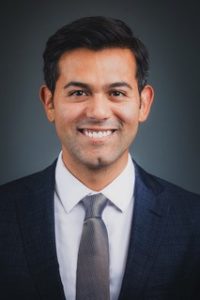
Daniel Galindo, UC Hastings College of the Law ’18
“With liberty and justice for all.” We were all taught to stand up, cross our hearts, and recite these words in grade school. Growing up in Texas, I even recited them in Spanish over the intercom at the start of the day for the students for whom, like me, English was their second language. But do they have real meaning in “the land of the free?” The answer to that question is why I think ACS is such an important organization.
Before coming to law school, I spent five years working at the ACLU. Most of what I knew about the law and the Constitution I learned by observing some of the best attorneys secure rights for immigrants, women, LGBT people, racial minorities, the outspoken, and religious minorities. I formed an impression that the law was one of the few things that was objectively true, just, honorable, and pure because at the end of the day, justice was usually served. However, when I started to learn the law by reading cases, it did not take long for me to see just how far from the truth that was. It became evident to me that the exercise of interpreting and applying the law is fallible and malleable to the interests of those in power. Our Constitutional history evidences it. When one studies decisions like Dred Scott and the politics surrounding the ratification of the Fourteenth Amendment and its subsequent interpretation, the worth of words like “all men are created equal” in the Declaration of Independence melts away to reveal an uncomfortable truth. The “Founding Fathers” envisioned life, liberty, and happiness for other mostly Christian, straight, white men. In the words of one of my favorite Justices, Justice Thurgood Marshall, “the government they devised was defective from the start, requiring several amendments, a civil war, and momentous social transformation to attain the system of constitutional government, and its respect for the individual freedoms and human rights, we hold as fundamental today.”
It is only because of the arduous process alluded to by Justice Marshall that a gay, secular, man and son of immigrants who grew up poor like me can aspire to shape law and policy. Not too long ago, American citizens of Mexican decent were prohibited from speaking Spanish, forced to attend segregated schools, and even deported. Even the right to marry is one which only five years ago I could not meaningfully enjoy. And still not everyone enjoys equality under the law. The over-incarceration and policing of African Americans and Latinos, the vast disparities in economic and educational opportunities, the lack of due process afforded to immigrants, the vast numbers of homeless people, and our inhumane treatment of asylum seekers, people will mental illness, and people suffering from drug addiction warp and tarnish the values for which we supposedly stand.
“We the People” get the government we deserve. And so we must cultivate and make space for the next generation of progressive voices we want to be interpreting our government’s guiding document. As much as some may want to believe that a document drafted 230 years ago is set in stone, even they are rushing to give it meaning in contexts that the “Founding Fathers” could have never imagined. ACS is an organization breathing real life into the otherwise hollow promises made to all persons by our Constitution through its tireless advocacy, debate, and network building. I am proud to be an ACS member and to contribute to making the Constitution live up to its promise of liberty, equality, freedom, and justice for all.
3/5 Students of ACS
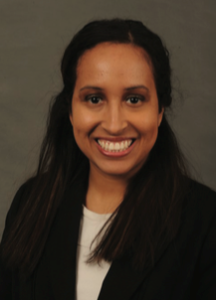
Taylre Janak, University of Notre Dame Law School ’18
I have always been aware of two of my overriding beliefs as to law in society: my self-identifying designation as a biracial woman and my desire to access the legal profession to affect change in society. As a biracial female, I have viewed the world through a unique lens of a myriad of perspectives from which one can examine and grapple with the intent and impact of the law. From my specific vantage point, I have observed that while issues of race are not intended to influence the law, they do impact the law. Growing up, it was my intention to use my law school diploma to affect change in my community. To that end, I am committed in my legal career to be a caring and socially active attorney who understands that the inner workings of the law are not always black and white; there are shades of grey in almost every situation.
Throughout law school, I have had diverse experiences from working a semester in the U.S. Trustee’s Office in Washington, D.C. to working as a certified legal intern with the juvenile justice center in St. Joseph County. Attending ACS student conventions as well as the National Convention has inspired me to seek opportunities across both ends of the economic and social spectrum. Further, ACS has provided me a vehicle with which to invite progressive thinkers and thought provokers to Notre Dame. I alongside my classmates have had the pleasure to hear from speakers who address a range of issues from gun control to voting rights to fair housing. Without ACS, my law school experience would have been devoid of an outlet to explore and express progressive ideas and viewpoints in society and my practice of law.
2/26 Students of ACS
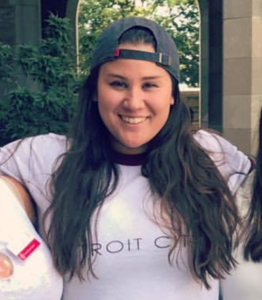
Rachael Hancock, Cornell University Law School ’18
I moved to Washington, DC after graduating from college. I wanted to go to law school but I didn’t know where or when. One of the first job applications I sent in was to ACS. Over the next two years I served as an intern, personal assistant, and office manager at ACS. I loved it. My ACS coworkers became my closest friends. I traveled to LA; I competed in office baking competitions; I went bowling in the White House; and I learned what to expect from law school and how to network.
When it was time to go to law school, I had already met a few 3Ls at Cornell through ACS and they immediately recruited me to be a 1L representative of our school’s chapter. As a 2L, I served as the President of our chapter and had an incredible time planning voter registration drives, debate watch parties, and community discussions in Ithaca.
Last January, our chapter individually mailed pieces of a floor puzzle of the Constitution to the White House. Each of the 200 pieces was signed by a member of our community and contained a message asking the President to respect all pieces of our Constitution. Though we never received a response, we felt that the success of this event was in reminding our peers that their voices still mattered and that there is power in community.
ACS has been such a large part of my life and success so far, and I hope to keep it with me as I graduate, become a lawyer, and start my career!
2/19 Students of ACS
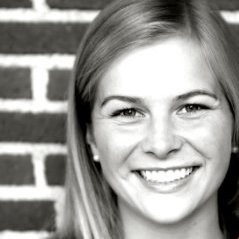
Olivia Hudnut, University of Southern California Gould School of Law ’18
As a Los Angeles native, I grew up surrounded by people from diverse backgrounds. Starting in middle school, I studied Korean and Spanish and traveled internationally, developing an appreciation for the uniqueness of the Angeleno culture in which I was raised. However, it wasn’t until the summer of my first year of law school that I began to comprehend how diverse the legal needs of my community could be. I spent my first summer interfacing with litigants in holistic legal aid clinics. I realized that the desperate poverty and modern slavery that I saw when I was living in Hong Kong and traveling in Southeast Asia was closer to home that I could have ever imagined.
Working in legal aid has allowed me to focus my attention on the margins of society. Partnering with the American Constitution Society has provided me with an outlet to educate, organize and engage with my law school peers. To me, ACS has always represented a safe space on campus to envision how we can collectively and progressively shape law and policy to be a positive force in the lives of all people. ACS students and lawyers convene to share ideas, debate policy, and have open and creative discussions. I cannot count the number of issues I have been woken up to and engaged with by ACS lawyers and students (whether at our RBG book club meetings or at the ACS Student Convention).
Through ACS, I developed my passion and commitment to labor and human rights law. As a Peggy Browning Fellow, I worked at the Wage Justice Center recovering lost wages through labor commissioner judgment enforcement on behalf of low-income workers living in Los Angeles. I loved working for a non-profit where there were no restrictions on the people we could reach. I have taken from these experiences a lifelong commitment to social and economic justice and progressive policy reform. I look forward to working in law and policy on the international and domestic arena after I graduate this May.
2/12 Students of ACS
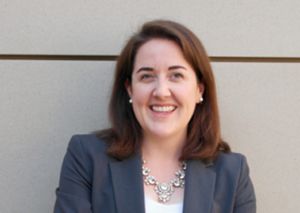
Allison Hunn, UC Berkeley School of Law ’18
Before coming to law school, I had the privilege of working in both politics and government. During that time, I developed a love of policy – the ability to solve problems and make lives better through compromise, creativity, and pragmatism. I entered law school with enough work experience to know that I wanted to graduate and begin a policy-centered career. And despite attending a law school with a strong commitment to public service, I didn’t anticipate the pressure I would feel to follow the traditional path of law firms, clerkships – the whole nine yards.
However, with my initial goal in mind, I went to work on the Clinton Campaign in Brooklyn, NY the summer after my first year. I ended up staying through the November Election as part of a field placement, and sadly, felt her loss alongside the many who share a belief in progressive values and fidelity to the Constitution. When I returned to law school in January 2017, I felt unsure about how to remain motivated in this field. ACS helped answer that question.
This year, as President of the Berkeley Law Chapter, I’ve had the privilege of helping arrange speakers and lawyers who are using their talents to add to the progressive discourse. My goal has been, in part, to expose our community of students to the many valuable and important ways we can use our degrees, as well as educate law students on the policy issues being discussed by the legal community. Recognizing ACS’s extensive network of passionate progressive lawyers has helped motivate my final semesters in law school. I’m excited to graduate this spring, and join in the work to solve our country’s greatest challenges.
2/5 Students of ACS
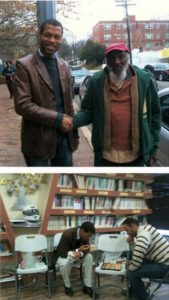
Taru Taylor, Case Western Reserve University School of Law ’18
During a lunch break in winter 2011, I was playing chess against one of my students in Jerusalem. Rather than wondering who won, the right question is, “who lost more slowly?”
I used that line recently. I was playing chess near my school when somebody asked, “Who’s winning?” I responded, “The real question is who’s losing more slowly?”
I stole that line from The Wire—”No one wins. One side just loses more slowly.” These are words to live by in this adversarial profession of ours. “Equal justice under law” means that the little guys should lose just as slowly as the big shots do. But the big shots usually lose slower than the little guys because the big shots can afford the slowest-losing advocates that money can buy.
These words also demonstrate Socratic wisdom—that we are all know-nothings. It also shows that we’re all losers. That nobody really wins anything, not even a football game. What about this JD? Won’t that make us all winners? Not likely. But it will make some of us slower losers than we were before. For me, it’ll allow me to help the little guys lose a little bit more slowly in the courtroom.
1/29 Students of ACS
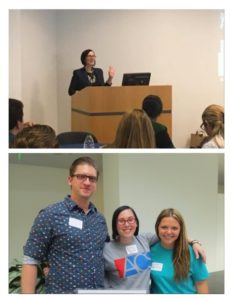
Emily Deyring, Seton Hall University School of Law ’20
Timing is everything. What an amazing time for us to be in law school, and what an amazing time to be involved in ACS!
As one of few students at my school who are mothers, I’m proud of the experiences that inform my studies. In my former career as a journalist and copy editor, I was able to engage my love of language, and to help inform the public. I learned the importance of paying attention to detail, and of making voices heard. Now more than ever, the access to accurate information is crucial. Today is a wonderful day to fight for that access, and to fight for equal justice, as a lawyer.
My two children and spouse stood by my side through my former career, and I’m lucky they continue to cheer for me now that it’s time to begin my second career.
Leaving journalism has been a rollercoaster of emotion at times, as I imagine law school is for most students. I still don’t have it all figured out – not by a long shot. But I’m here to learn, from my classmates, my colleagues, my professors, and from my family. I’m here to serve during this precarious time, as a parent, a friend, a partner, and an advocate. I believe in policies that improve the lives of everyone. I believe in us – I believe our profession is a force for positive change.
I was excited when looking for a “home” student organization, a few of my professors suggested I work to revive our ACS chapter. I’m beyond grateful to have found students and professionals who embrace the values that light my path. Our future is bright, and our time to change the world is now!
1/22 Students of ACS
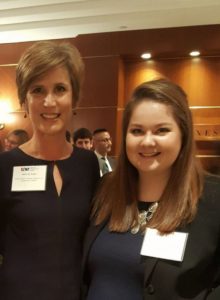
Shelby McKenzie, Georgia State University College of Law ’19
Once, I jokingly told my career advisor, “I may not always be the most qualified candidate, but I’m always the most persistent.” This is probably true of my networking endeavors. Unlike other students, I didn’t have any connections to take advantage of when I started law school. Networking was going to be a challenge for me. Which is why being President of the Georgia State ACS chapter has also been an invaluable part of my personal and career development.
I had always wanted to witness family law from the perspective of a judge, but didn’t know many people in the courthouse. When I read an article about the new judge on the family law bench in Atlanta, my first thought was that it would be great to work for her. My second thought was that she would make a perfect speaker for an upcoming GSU ACS event about diversity in the judiciary. I reached out to her staff attorney and she accepted an offer to speak at the ACS Southeast Regional Convening (SERC) at GSU. As she was leaving the panel, she noted her office was always looking for good interns and to send my resume her way. When I saw her at another event a couple weeks later, she remembered me from ACS SERC and we discussed interning with her office. I’ve been interning with her for about 4 months and she is an incredible, progressive woman who deeply cares about Georgia families and judicial integrity.
The ACS Georgia Lawyer Chapter has been invaluable in my networking efforts as well. At their Public Interest Happy Hour, one of the Georgia Lawyer Chapter executive board members running the event introduced me to all the family law attorneys in attendance. As a result, I had several lunches and coffees lined up with prominent Atlanta family law attorneys in the following weeks. And, I even had the opportunity to meet the inspiring Sally Yates at an ACS event!
1/16 Students of ACS
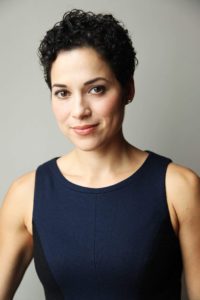
Michelle Herd, Samford University Cumberland School of Law ’19
I knew law school was going to be difficult. As a mother to a toddler, I also knew that I could get through it. When I see my son wake up in the morning, I see the future in his face. I see that the work I do today will have an exponential impact. This reality only became clear to me after I had him. Only then did I realize the sacrifices that my own mother made so that I could have a better life. My mother left her home in Central America with two sons of her own to start a new life in the U.S. She did not speak English, she had nothing, not even a high school diploma. Yet, she persevered and never looked back. Growing up, I compared our home life and culture to others and wondered why we were different. Now, I realize what she gave up and how strong and resilient she made us. I realize that we can be more than we imagine we are capable of. Now as I make sacrifices for my son, I think of all the other parents that wake up each morning with the same determination. It makes my load seem lighter and brings me joy.
12/18 Students of ACS
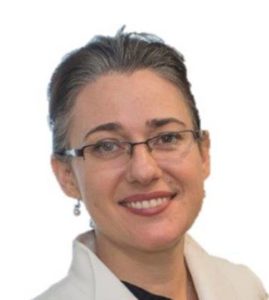
Carrie Hill, The University of Akron School of Law ’19
I came to law school as a first-generation non-traditional student for one reason: to re-ignite my passion for public policy. I had two problems right from the get go. I’m not originally from Ohio (so my policy connections were, well, . . . none) and the first year of law school was sucking all of my time just to survive!
ACS helped fill this void – it gave me access to countless like-minded professionals and organizations. Through its scholarships, conferences, and networking, I’m connected! This connection has restored a confidence in me to become more involved in my community and the nation. I see and feel again how each person can make a difference in the world. I’m thankful for ACS’s existence, and for their prioritizing student leadership development . . . its working! Since joining ACS: I’ve Marched on Washington, Researched State Policies effects on sick Ohioans, Served as a Poll Worker, Volunteered at Legal Aid—Ran for Office (student chapter president), Contacted my State Representatives and a certain U.S. Senator (countless times), Studied Policy Internationally . . . and I am just getting started!
My two problems now are narrowing down my options to pick one place to intern next summer and finalizing our student chapter programming next semester. These are good problems to have. Thank you ACS for becoming my home away from home and empowering me to fulfill my public policy goals!
12/11 Students of ACS
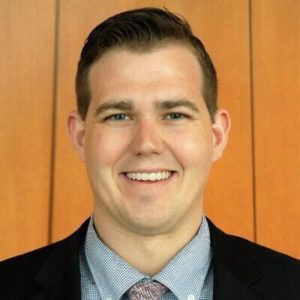
Patrick Stickney, Penn State Law ’18
Law school was a culture change. Prior to law school, I was a campaign manager for state and local races and an issue organizer, particularly working on higher education accessibility and affordability. Higher education is a deeply personal concern for me, because I come from a low-income family that experienced domestic violence and drug abuse. Even though it is a pathway to opportunity, law school required me to adjust—to a greater extent than when I attended college—because my family and class background were different than most other law students. Additionally, transitioning from knocking on doors and phone-banking to returning to the classroom was its own process.
I initially did not have an outlet in law school for my fierce devotion to public service to end power disparities within marginalized communities. Having researched the student organizations available at Penn State Law, I was disappointed to learn its ACS chapter was no longer active. However, I put my organizing experience to use and brought students together to restart the chapter.
Through ACS, I met law students and legal professionals from across the country who shared my values. I brought speakers to campus for events on issues such as environmental justice, reproductive rights, and voting rights. While law school had its adjustments, it has allowed me to do things that were unimaginable to me when I was growing up, such as researching and writing amicus briefs submitted to the US Supreme Court or helping to draft legislation for the Pennsylvania House Democratic Caucus.
12/4 Students of ACS
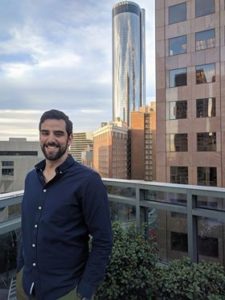
Javier Trejo, Georgia State University College of Law ’19
Being a progressive in the deep South is not always easy, but it teaches you how to listen. You get to be pretty good at holding your own in lunchroom debates and at Thanksgiving dinner. You begin to understand the other side and even respect some of their views despite disagreeing with them. It also provides a front row view of the negative impact of conservative legal, economic, and social policy. For example, access to lifesaving Medicaid for rural and urban poor, which were previously considered non-controversial.
Being a progressive in the deep South is not always easy, but I am not alone. ACS has empowered me and, more importantly, allowed me to help empower others. In the faces of my peers and fellow student leaders, I see people excited to drive the conversation on campus and in the community. Our events involving panel conversations about reproductive rights, minority representation on the bench, and police brutality are regularly packed to capacity. Among progressive lawyers and activists in Atlanta and elsewhere, I see the values that make America great defended with tenacity on a daily basis.
There is still tremendous work to be done and we as lawyers are called to serve. We are uniquely positioned to advance justice in all corners of society, for all people, regardless of race, religion, economic circumstance, or geography.
Being a progressive in the South is not always easy, but there is nowhere else I would rather be. Let’s get to work.
11/27 Students of ACS
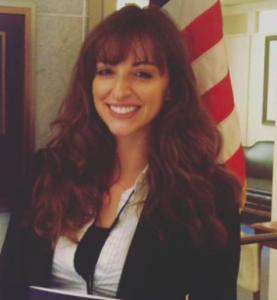
Nikki Levy, Chapter President, The George Washington University Law School ’18
It was a big change to move across the country from Las Vegas to D.C. to pursue my JD. 1L year is already hard enough, but having my usual network of support 2500 miles away was difficult. When I got involved with ACS, though, the students, practitioners, and professors became my new network. I found a group of like-minded students on campus who were trying to make a difference. I found professors and professionals who are really interested in helping students succeed. I love having the opportunity to foster important, difficult discussions on our campus. The wonderful staff at ACS National helped foster some of my most valued connections. I tell every law student who will listen about how ACS connected me to two of my internships!
I am eager to fight voter suppression and discriminatory voter disenfranchisement. ACS connected me to my 2L summer internship at the ACLU of Nevada, where I pursued efforts to reduce the discriminatory impact of the state’s felon disenfranchisement laws. Next, I was connected through ACS to my current work as a policy fellow at Let America Vote. In this role, I get to fight voter suppression efforts and advocate for laws that increase American’s access to the ballot box. Each day, we see new threats to the voting franchise from across the country. It is frustrating, but I am grateful to be able to use my voice─and my future law degree─to fight back.
11/20 Students of ACS
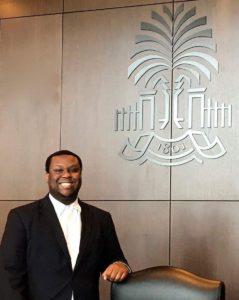
Marcurius Byrd, University of South Carolina School of Law ’18
I never really wanted to be a lawyer, even though I was told at a young age I should be a lawyer. I generally preferred math and science classes, which led me to getting a degree in Biochemistry from Washington and Lee University. When I graduated from undergraduate, I had planned to go study medicine as a researcher. I got accepted into a medical school program, but got sick so I had to leave the program. I was basically out of the game of life, trying to figure out what caused me to be sick. It took about four years for me to be well enough to attempt working again. Nevertheless, despite my limited capacity during this period, I kept trying to do what little I could do to stay involved and help others.
Once I was able to, I spent as much time as I could volunteering, doing social justice activism, and getting involved politically, so I could understand how the world worked around me. My political, social justice, and volunteer activities eventually convinced me that I had to become a lawyer so I that I could help navigate how the law affects so much of our everyday life without us noticing. Even if I could no longer be a doctor, I could help create an army of doctors through other means.
Even though I am now in my last year of law school, I remain active in the groups that helped convince me to become a lawyer. I serve as a Co-Vice Chair in the Sierra Club of South Carolina where I have gotten to work with some of the Club’s national leaders and projects, an Executive Committeeman in the South Carolina Democratic Party, and a part of the leadership team of the local Black Lives Matter Chapter that I helped start. I am just as active at the law school. I serve as president of my ACS Student Chapter, as the moot court team manager for our BLSA chapter, and as an officer in our Technology & Law Student Association. I also helped to restart the Health Law Society and am on the South Carolina Journal of International Law & Business.
Sometimes people tell me I do too much, and in many ways, I can agree. When the only thing you can physically do for so long is try, trying becomes the only thing you know how to do. And eventually you end up succeeding and all the failures become the stepping stones to your ultimate successful destination.
11/13 Students of ACS
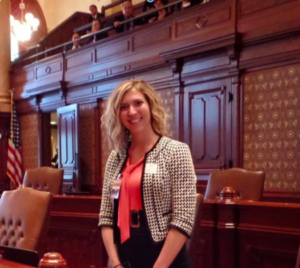
Lari Dierks, Northwestern University Pritzker School of Law ’18
Growing up in a small southern Illinois town, everyone looked the same. When I say small town, people often underestimate what I mean. I lived a ten-minute drive from the closest towns in our area, Ava, population 800, and Campbell Hill, population 230. Growing up in such a small town, on my family’s farm, gave me a strong sense of community that I still hold with me today. But, I also recognized the limited view of the world so many people from this area hold.
When I was in high school, I had the opportunity to go on a trip with high school students from Illinois, Kentucky, and Missouri. We met with a group of 20 high school students from New York City and traveled through Europe for a month. This experience opened my eyes to a world and cultures that were not present in my small southern Illinois town where everyone knew each other, and looked alike. Then, while I was in college I found out there was an opportunity to work in Springfield, Illinois as a staff analyst for the House of Representatives. Prior to hearing about this opportunity, I never imagined that someone from my small town could make the law. But, I did and I loved it. I worked on two campaigns electing Democrats to the Illinois House of Representatives and helped draft major legislation. But, eventually I knew I wanted to go to law school and I moved to Chicago to begin my law school career.
Throughout my journey, I have developed a deep passion for protecting constitutional rights. When I entered law school, I learned about ACS and was hooked. I loved the people I met who shared my passion for creating a better world. After President Trump was elected, I knew my place in this fight would be to find a connection between the world I grew up in, and the world I live in now. We can only bridge that gap by supporting important conversations about progressive issues and ACS supports these conversations every day. Together, we can help open the minds of people who have not experienced the diverse United States we know and love. Because of that goal, ACS will always have a special place in my heart.
11/6 Students of ACS
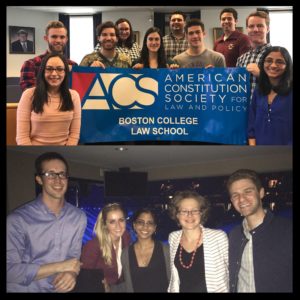
Vaishali Goyal, Boston College Law School ’18
I have typically been the only brown student in my classes and often am the only student to actually be excited to be in school and to have the opportunity to learn about things that no one in my household knew about. That passion to learn enabled me to work hard, and become a first generation college and law student. While confident that I worked hard to get to law school, I was suddenly confronted again with being the only brown student on Law Review. I felt completely out of place.
After days of imposter syndrome, I realized—even if they outnumbered me, I was still seen as their equal. But after President Trump was elected, I was not sure anymore. I felt this duty to discuss with my colleagues the structural barriers faced by people of color. After contemplating how to discuss this issue with my classmates, I turned my energy to ACS to host events that would communicate the issue of structural inequality to my Boston College Law School students. Through that, I have connected with people that are fighting for change and spreading this message and the work that needs to be done—especially now.
10/30 Students of ACS
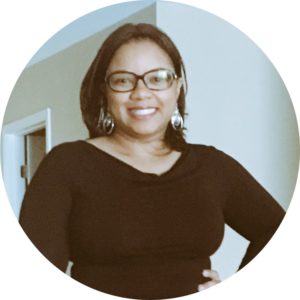
Candice Isaac, West Virginia College of Law ’18
Twice in my life, I have heard the words “If I were you, I would pack up my things and leave.” Although in two different contexts, I must admit these words were hurtful. In the first instance, I had gone to the mailbox and received a letter from United States Citizenship and Immigration Services. I was positive it was my approval for a green card, but it was a deportation letter. My journey to become a permanent resident was in jeopardy. I contacted an attorney who said I had no chance of staying and needed to pack up my things and leave. The second time occurred last summer by a recruiter at a top government agency. She stated I was not passionate enough about the law and maybe law school was not the place for me. However, my journey to law school is no farce. My determination to complete this degree will not be deterred by her words. If only she knew, she might have opted to say something nice instead.
Nevertheless, I remain resilient and persistent in my efforts to become educated and grounded in the law. I know that obtaining a legal degree not only reaps benefits to me, but to every extended community I am a part of. ACS drew me in with its mission and vision to serve the needs of all people. My background and experiences are unique. I oftentimes find disheartening a system, which doles out rigid justice without compassion, any concern for decency, and any consideration of contributing factors. To my fellow ACS members, let us continue to lend our voices to spaces and places that restrict the core values the Constitution seeks to protect.
10/23 Students of ACS
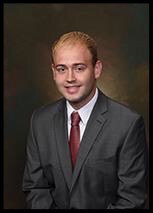
Kevin W. Connell, William & Mary Marshall-Wythe School of Law ’18
I entered my first year of college a conservative registered Republican, but departed for law school a progressive registered Democrat. Growing up in a white, middle-class home of two public school teachers, I was taught the basic concept that hard work creates success. In other words, achieving the American Dream was not a question of if, but when. It was a philosophy that I believed in fiercely, and one that shaped my early political ideology and ultimate worldview.
This all changed, however, after working a minimum wage job in food service while I attended college. Shortly after starting, it became apparent that most of my coworkers did not live in the same reality of opportunity. Contrary to the popular opinion of conservatives, these employees are not high school students working a part-time job for extra spending money. They are people who were born into poverty; they are the children of parents where English is a second language; they are members of families lacking any college education; they are single parents who have dropped out of school; and they are Baby Boomers who were laid off late in their careers without a pension. Although my coworkers came from a unique variety of circumstances, they shared a common certainty: hard work had not and would not lead to sharing with me in the same American Dream. Slaves to a system rigged against them, paychecks amounting to half of a living wage leave most of my previous coworkers with no way of getting ahead. It is as if their heads are being held above water high enough to avoid drowning, but low enough to prevent them from swimming ashore. In addition to this common economic struggle, many of these same people face additional challenges relating to their race, gender, religion, sexual orientation, and national origin, adding to the already insurmountable odds.
The American Constitution Society (ACS) serves as a guide to the legal community on how we can improve the conditions for people less fortunate through the law and public policy. With the intention of representing public school districts upon my graduation, I plan to carry on the spirit of ACS from my legal education well into practice.
10/16 Students of ACS
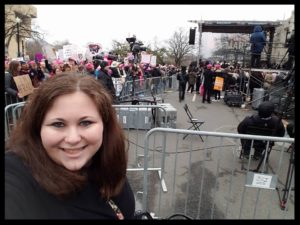
Marissa Ditkowsky, American University Washington College of Law ’19
My passion for preserving constitutional rights is based on my personal experience. As a student with physical disabilities that impact my mobility, I constantly advocate to ensure that people with disabilities receive equal protection under the law and the right to due process as guaranteed by the Constitution. In my previous internship, I focused on guardianship. Guardianship proceedings often deny alleged incapacitated individuals of due process, despite the existence of safeguards within statutes, due primarily to paternalism and misunderstanding of capacity and disability. Additionally, guardianship tends to be an overly restrictive option that denies individuals the right to make personal choices and decisions about where to live, who to see, and what to do.
Guardianship provides for just one of many potential barriers for people with disabilities to receive constitutional protections. Poll accessibility and the fundamental right to vote has been a major issue in regard building compliance and ability to get to the polls, which is even more difficult when states continue to close polling locations. Criminal justice system flaws, such as mass incarceration and police brutality, also disparately impact individuals with disabilities, primarily due to ableism, lack of training, and the increased possibility of misunderstandings. Violations of the Fourth, Fifth, and Fourteenth amendments are rampant. A progressive interpretation of the Constitution ensures that minority populations are protected in the same ways as everyone else.
10/9 Students of ACS
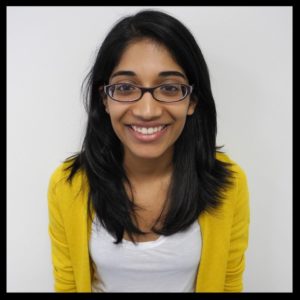
Rosann Mariappuram, The University of Texas School of Law ’18
I got involved with the Texas Law chapter of ACS as a 1L. At my first event, I was a timekeeper for an affirmative action debate co-hosted by the Federalist Society. As a woman and a person of color, I was nervous about the direction the conversation might go. But I was so proud to see ACS students and faculty members push the level of discourse towards critical thinking and analysis, rather than circular talking points that ignored the lived experiences of students. As a 2L, I became our chapter’s Vice President of Events and got to share my passion for reproductive justice by planning an event featuring Stephanie Toti, the lawyer who argued Whole Woman’s Health v. Hellerstedt. In the wake of the 2016 presidential election, our ACS chapter deepened our connections to other student organizations and showed up in solidarity to protest a transphobic speaker who was brought to campus. As I enter my 3L year, I am so honored to be the President of our ACS chapter. We have a great year of events planned and are excited to continue growing our membership!
10/2 Students of ACS
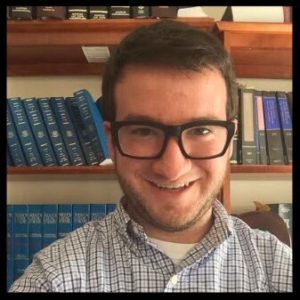
Christopher R. Henderson, Quinnipiac University School of Law `20
I truly believe that the law can be a tool for positive social and economic change. It can, and has, created the conditions leading to better lives for all people.
For instance, the National Labor Relations Act and its equivalent in the states have allowed workers to come together collectively to bargain for better working conditions, better pay, & a voice on the job. It is through these labor laws that the middle class was created and maintained. For me, it has meant a financially secure childhood. My father passed away when I was very young which left our family devastated emotionally and economically. But because of my mother’s membership in a union, we were able to stay afloat during the most difficult time in our lives. She and her union bargained for yearly pay increases, excellent health care, and secure retirement benefits. We were not well off because of the union but we were comfortable and we didn’t have to think twice about going out to eat once in a while, or going to the doctor, or taking a vacation. It was because of the union that a single mother in an industrial town could raise a son without going into abject poverty. Unfortunately, most Americans do not have the privilege of being a part of a union and risk going into poverty thus losing their standing as part of the middle class.
My upbringing inspired me to work for the labor movement and has, in turn, led me into a life of the law. It is my hope that I can utilize the law to push for change to benefit all working people so that they can have security in an otherwise insecure world. My goal as a lawyer is to utilize the laws to create the conditions where opportunity is possible for all, where there is economic and social fairness in our daily interactions in the world, and where all people are treated equally. I hope, as Chapter President at the Quinnipiac School of Law, we can build a network of other progressive lawyers to make that reality possible.
9/25 Students of ACS
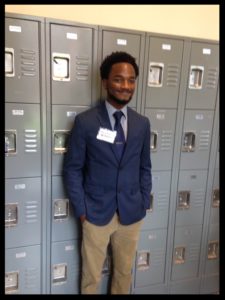
Robert Williams, The University of Mississippi School of Law ’18
When you tell someone that you are a law student, you will likely hear: “Whoa, you’re in law school! You must be smart!” While it is a great compliment, those reactions are mostly the opposite of what I feel. Coming into law school, I had the support of all my family and friends. As the first person in my circle to go to law school, everyone believed in me. Of course, I wanted to go back and tell them, “I’m doing great in school. I’m going to come out and be the great lawyer you all think I can be. I feel like I belong there.”
Your first week, you learn about all your new peers, the ones that have done way more than I have before entering school. Not only did they know lawyers, some knew what to expect, had mentors, higher college GPAs, better LSAT scores, or simply came from a world that wasn’t as black and white as mine.
How could I compare to that? How can I go back to my circle—those that believed in me—to tell them that I’m so very far from being the best. In fact, I may be fighting to be mediocre. I doubted myself and didn’t strive for on-campus interviews since I knew the advantages my peers had over me. It was also easy for me to simply accept not getting an A in my classes. I started to question how I even got into law school? Whose spot did I take? Am I just here because I’m black?
I let those thoughts and feelings beat me up for a long time, and honestly, it still does. Law school makes you compare yourself to your peers. Having these thoughts these last two years have been difficult, and it will likely be a lifelong struggle for me. I may not be able to tell my circle that I was the best, or my unique talent stood out. But, I am able to tell them that, no matter what, I did belong.
9/18 Students of ACS

ACS Student Leader, New York
Growing up, I have always been keenly aware that my parents had very different political views, but I was encouraged to be my own person and to follow my own path. However, the current Administration has drastically deepened the schism between my mother and me.
Gradually, she has become increasingly xenophobic and bigoted. I no longer was encouraged to follow my own path and was labeled an “effing liberal” for choosing to speak against her views. Regardless of her graduating from a women’s college, my mother had hate in her voice against Hillary Clinton, while championing a man who prides himself on grabbing women.
Through ACS, I am surrounded by people who encourage freedom of thought and speak out against hatred and bigotry. My mother and I may never have a good relationship again, but I chose not to go down a path of bitterness or anger. The Constitution serves as a guide for how to progress as a Nation; while ACS congruently serves as a way for law students and lawyers to achieve the goals of our founding fathers.
9/11 Students of ACS
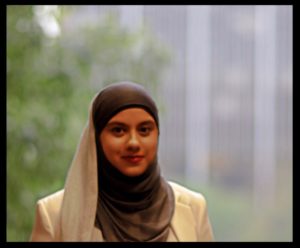
Ayesha Haq, University of Cincinnati College of Law ’19
Before high school started, I had no idea what I wanted to do in life. My father, an over-achiever in all aspects, had unrealistic expectations from me as his first-born child. Irritated by my childish ways, he sat me down one day and asked what career I wanted to pursue. He only gave me three days to give him a final decision. I was infamous for being a troublemaker in the family, and people always found me questioning society, law and politics. Putting this infamous quality to use, I decided I wanted to become a lawyer. I didn’t have much purpose back then and just knew that the law consumed me with a passion indescribable by words.
The lack of purpose slowly changed as I found myself immersed in discussions of terrorism paired with Islamophobia. I was tired of being the only screaming individual defending Muslims in a heated debate which led to no fruition or change in perspective. Suddenly, my purpose as a future lawyer became clearer. I developed a keen interest in advocating for minority rights, which are vested in the Constitution of the United States. Our country has a dark history of alienating, dehumanizing, and criminalizing communities of color. It is unfortunate to see history repeat itself in the name of “national security.” I have high hopes that progressives will shape the way we value citizens and immigrants from different cultures, religions and nationalities. I plan to devote my legal career towards ensuring that people are given the dignities they deserve in the United States of America.
9/5 Students of ACS
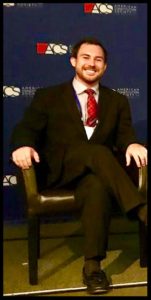
Charles M. Schully, Tulane University Law School ’18
Growing up privileged in New Orleans means asking yourself a lot of questions. If you answer them honestly, you will naturally come to the conclusion that there exists an oppressive system of laws and policies that work to harm certain groups of people. I witnessed it again August 29, 2005, the day Katrina made landfall. We lost our home for 13 months, but people with less means lost so much more. Worrying about the people in the Housing Developments and in the Superdome, I felt more powerless to help than I had ever felt in my life.
As a law student and an ACS Chapter President, I continue to witness these injustices, many of which have become increasingly exacerbated in 2017. Only now, I am not the impotent, naive, and frustrated teenager I was in those hazy Post-Katrina days. I confront the oppression of the criminal justice system with the tools and knowhow to fight for victims of the carceral state. I know my rights when I escort patients to one of only three remaining abortion clinics in Louisiana, while distracting them from hearing the leitmotif of taunts by protesters. I have provided legal observation at the celebration and counter-protest that accompanied our city’s courageous decision to remove four confederate monuments.
My education has transformed my stagnant white guilt into action, solidarity, and allyship. I am a student who pledges his work to fighting injustice and oppression, because I dream of a future when all of my fellows may sit together – and share in the bread and roses.
8/28 Students of ACS
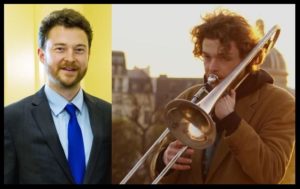
Ryan Snow, The University of Virginia School of Law ’18
I worked as a professional trombonist for ten years between college and law school. I played mostly avant-garde jazz and free improvised music, and also freelanced and taught. I organized and produced a music series in my Brooklyn basement for two years–literally underground music. I co-founded a soul-rock band called Sister Sparrow & The Dirty Birds and we took flight, playing over 500 shows in 45 states and traveling 200,000 miles in three years.
While on the road I began to feel my focus and passion shift. Traveling without moving–sitting in a van all day–I read obsessively about politics and policy. I had always cared deeply about our democracy, and in the aftermath of Citizens United I could see it being weakened. When Shelby County came down I realized it was being taken away. Having had the opportunity to pursue my dreams I felt a moral duty to work toward a society that works for all, and that will require expanding meaningful access to our political system. I left the band, took the LSAT, worked as a field organizer in New Hampshire on the 2014 midterm, and applied to law school. I am devoting my legal career to fighting for voting rights, ending gerrymandering, and reforming the campaign finance system.
8/21 Students of ACS
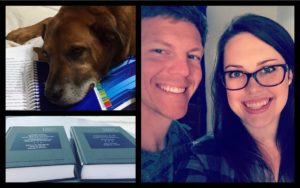
Christina Beeler, University of Houston Law Center ’18
As a first-generation college student, I’ve always struggled with imposter syndrome. On the first day of law school, I cried in the bathroom during my Torts class. I went home that evening and swore that I’d never go back; I felt like I couldn’t compete. It seemed like everyone already knew so much, and I felt like I was already behind on the first day. My husband convinced me to go back the next day. On the car drive to school every morning, I started repeating to myself, “You belong in law school.” Eventually I started to believe it. Now I am in the top 10% of my class and I only have one year of law school left. Some days I still feel like I don’t belong, but I remind myself that first-generation students commonly feel this way and that my feelings don’t have to dictate my choices.
8/14 Students of ACS
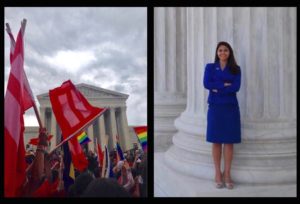
Sophia Carrillo, Stanford Law School ’18
I was inside the Supreme Court during the reading of the Obergefell opinion. As we were leaving the Supreme Court, we were directed by marshals to stay back and exit on the side. The swelling crowd outside had heard the good news and burst into celebration. It was a moment of pure joy.
My first time visiting the Supreme Court, I camped out to hear the oral argument in Arizona v. United States. I grew up on the U.S./Mexico border and the “Show Your Papers” law in Arizona seemed like a clear wrong with a record full of animus towards immigrants and Mexican Americans. Hearing the Justices consider this case made me feel like my community was being heard. Five years later, immigrant communities continue to live in fear with DACA on the chopping block, anti-immigrant rhetoric, and deportations “so fast your head will spin” becoming policy. This constant fear is so prevalent that one of my mother’s kindergarten students recently burst into tears and refused to board a bus headed to the county fair for a field trip—she associated buses with deportation.
The nature of injustice is that we may not always see it in our own times. As soon-to-be lawyers, our charge is to ensure that our country sees, and challenges the nature of injustice now. I joined ACS to ensure the law was a force to improve the lives of all. I am inspired every day by our steps forward and the work remaining to be done.

